

26 Creative Writing Careers
by Melissa Donovan | Aug 4, 2022 | Creative Writing | 164 comments
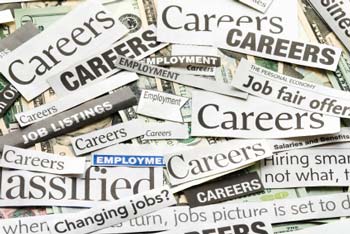
Creative writing careers — they’re out there!
If creative writing is your passion, then you’d probably enjoy a career in which you could spend all day (or at least most of the day) pursuing that passion.
But creative writing is an artistic pursuit, and we all know that a career in the arts isn’t easy to come by.
It takes hard work, drive, dedication, a whole lot of spirit, and often, a willingness to take big financial risks — as in not having much money while you’re waiting for your big break.
The Creative Writing Career List
Here’s a list of creative writing careers that you can consider for your future. I’m not making any promises. You have to go out and find these jobs yourself, but they do exist. You just have to look for them and then land them.
- Greeting Card Author
- Comic Book Writer
- Copywriter (business, advertising, marketing, etc.)
- Writing Coach
- Screenwriter
- Songwriter (Lyricist)
- Freelance Short Fiction Writer
- Web Content Writer
- Creative Writing Instructor
- Legacy Writer (write people’s bios and family histories)
- Critic/Reviewer
- Ghostwriter
- Article Writer (write, submit, repeat)
- Video Game Writer
- Personal Poet (write personalized poems for weddings, funerals, childbirths, etc.)
- Speechwriter
- Write sleep stories
- Blogger (don’t tell me you don’t have a blog yet!)
- Creative Writing Consultant
- Specialty writer (food, travel, fitness, etc.)
- Write guided meditations
I’m not saying you’re going to make a lot of money with some of these creative writing careers. You might have to earn your creating writing income part-time or on the side. But if you do what you love, the money (i.e. the success) just might follow. You’ll never know unless you try, right?
Do you have any creative writing careers to add to this list? Share your suggestions by leaving a comment.

164 Comments
I find it so difficult to consolidate my thoughts when it comes to career paths. I know this is only a short post with some fairly obvious suggestions, but I really have to say cheers for arranging them in a way that means I can go “Oh yeah. I could do that. Or that..”
Baffled in the world of writing.
Thanks, GrapeMe. I’m sure there are many more creative writing career paths, and hopefully some folks will stop by and add their suggestions. What I wanted to do with this post was present some starter ideas for career building. If you’re in school or have a full-time job, then these are great ways to get your feet wet, and you never know where these jobs will take you! Good luck to you!
Great post!
I can tell you from personal experience that it IS possible to make a career in creative writing. My dream was to launch an on-line store where I could showcase and sell e-mail subscriptions to my collection of short stories. Additionally, I wanted to foster other short story writers by sponsoring short story contests.
Now, nearly three years later, LongShortStories is happily chugging along like The Little Engine That Could, bringing the best in short fiction to an ever-widening appreciative global audience.
It does take patience and perseverence, along with a huge leap of faith in yourself and the reading community at large, to create and maintain such an ongoing venture.
Am I successful? Yes. Am I rich? Yes, if by that you define success and richness as living out one’s creative dream. For that, I am so grateful to my loyal readers and contest entrants who see the power in the short story form.
Go for it, I say!
Wayne C. Long Writer/Editor/Digital Publisher
That’s one of the reasons I wanted to present this list — you never know where it will lead if you just start by dipping your toes in the water. And I think for those of us who are creative or artistic, there’s a true need to engage our creativity even if it’s not our full-time work. And if we can bring in a little extra spending money doing something we love, all the better!
Hi Wayne Hi. Felt great to see your view and understande your perspective,on this important and required art. Writing is something which will indeed shape the future have already writen poems, want to publish them. Am a Multiple Sclerosis patient would appreciate support in my persuit to make my work visible.
I’ve heard of most of these, except personal poet. Of course, the creative job (though not about writing) that I wonder most about is: who gets hired to design those patterns on paper towels?
I’ve been to several websites for personalized poetry. Actually, that’s something I briefly considered doing many years ago, but ultimately I chose another path. Funny you mention the paper towel patterns, because I have wondered the same thing many, many times!
Probably a clever little robot..
Children’s book author. 🙂 I completely agree with you that there is usually a way to turn your passion into a successful career, even if it involves looking for unconventional routes to do what you love.
Yes, those unconventional routes are the ones forged by pioneers, people who were compelled to follow their dreams. Reminds me of the saying, “Do what you love and the money will follow.”
Nice list, Melissa.
I routinely participate in two of the twenty on your list. However, I would be hard pressed to call either a career. More of a labor of love, compulsion, passion than a reliable way to pay the bills — even though I participate daily. Still, I am incredibly fortunate. I would not change my vague professional choices for anything. Best of success to all who tackle anything on the above list.
Thanks, Devin. I believe that if we combine our passion with a desire to make a living doing what we love, anything is possible. Best of luck to you!
I couldn’t agree more. I mostly just do what I love and somehow the bills get paid. believing in yourself is also very helpful — of course there is no reason not to.
Mrs. Melissa Donovan,
I wanted to write for theater newsletter a friend created.
She gave me the opportunity and not a thought would come to me.
Not a theater professional but I like theater and felt I had something to say about it.
Upon returning a few theater books to the library, I got lost in a Exploring Theater Playwriting, a topic jumped on me Rules of etiquette.
Finally, I have the first draft.
I need guidance to help me orient myself with writing and I hope to find it online. This list is a good start. I scrub toilets for a living, can’t help but read and write before and after work. Words, concepts and definitions are very important to me, can’t imagine not pursuing writing soon, yet I need to sell it too somehow. Custodian/janitorial work speaks for itself, words require a lot more compelling.
Great list of creative writing careers, Melissa. To this list, I would like to add:
1. Letter writer — writing personal and business letters for clients. 2. Resume writer
…and you’re right. If you do what you love, the money frequently DOES follow!
Thanks, Christine! These are great additions to the list. Resume and cover letter writing are especially notable because one can make a good living in that field. However, I’m not sure it constitutes as creative writing so much as business writing. In any case, definitely worth mentioning!
I’m not quite sure what I would want to do in the writing field. I don tknow because so many of them I think I could do well in. I am so grateful for this list because it shows a very organized way of showing so many possibilities in this creative field.
If you try different forms, styles, and genres of writing, you’ll eventually find the one that fits! Good luck to you!
Melissa. I hope I could maybe get into non fiction writing or even journalism.
Good luck. Just keep writing and submitting, and you’ll get there.
Im just a 12 year old girl who wants to know what I want to do with my life when I get older. All of my other friends know exactly what they are going to be, but I wasn’t sure. So, I went and looked on some websites about jobs that have to do with writing, and this website gave me a very good idea of what I want to be, a song writer because I also love singing. Thanks! 🙂
Songwriting is an excellent career. I love that songwriters get to be creative, work with lots of other artists, and are immersed in music but don’t have to deal with the spotlight and publicity (unless the songwriter is also a star). Nice career choice! Good luck to you.
I am too and my parents have recently asked me what I may have wanted to be and I didn’t even know so it kinda scared me and I have recently realized I like to write stories.I know how this economy works though with the unemployment and it makes me wonder if a writing career would work.I love to write though,am I crazy or something?
At twelve years old, there is no reason to be scared if you don’t know what you want to be when you grow up. You have plenty of time! Lots of people start college without declaring their field of study, and lots of people start college thinking they’re going to do one thing and then change halfway through. But if you really love writing and want to pursue it, then there’s no better time to start than right now. No, you’re not crazy. Writing is a wonderful adventure. Also, you are living in the best possible time in history to be a writer. There are tons of wonderful opportunities available to writers that we did not have ten or twenty years ago. I wish you the best of luck, Thatgirl!
Melissa, I’m a former high school English teacher who realized a few years into teaching that writing was what I really wanted to do. I have a bachelor’s degree and a master’s degree in education but am trying to change careers. I’ve been working on a YA novel and have been getting EXTREMELY frustrated. I have to say I found your post on accident but have found it to be very inspiring. Thanks for surge of reassurance that it can be done!
You’re welcome! I think it’s wonderful that you’re working on a novel and normal that you’re frustrated. Just keep at it and the frustration will eventually pass. You’ll find that in a battle of willpower, commitment wins out over frustration every time.
I really want to write and it has always been a favorite passtime of mine. If i am not writing I feel empty inside like something is missing. The problem is I am scared to take that ‘leap of faith’ and make a career out of it. Instead, I search for everything else to become in life just to run from the truth that writing has been and always will be my destiny. It started back in high school when I was told writers don’t make much money. I let that get in the way of what I could be now and I quit. Now, I see writers that are better and are doing better than I am and I get jealous because I feel I am a better writer than them all!! Then I realize that talk is cheap without evidence to back it up. Can anybody offer a advice or words of encouragement for me to finally persue my one and only true love and happiness in life?? It would be greatly appreciated. Thank you..
Well Skyi, I personally don’t think jealousy is going to get you anywhere. If you obsess over comparing yourself to your peers, you will be in a constant state of negativity. Also, you should keep in mind that regardless of how well you write, you are not entitled to success, especially in a field that you chose not to pursue. I think your best course of action would be to accept that you are where you are right now because of the choices that you (and you alone) made. Once you accept responsibility for your life, you can set a new course and start pursuing a career in writing. It’s never too late to become a writer. Stop focusing on what other writers are achieving and concentrate on writing the best you can. The only way to be a writer is to write.
Hey Melissa,
I think your website is great! I ran by it by mistake and really found the info helpful. I am venturing out into my writing career and can use all the info I can get my hands on. I do have a question: I have started a career and have ppl supporting me in this career but I am for certain that writing is where I belong and want to do. How do I make the transistion smoothly and let my supporters down easily? 🙂
Thanks in advance for the advice,
Thanks for your kind words. Your question confuses me. Why would you be letting your supporters down if you transition to writing as a career? If they are truly your supporters, it won’t be a let-down at all.
Wow! Is all I can say..I honestly thought that I was in this boat all by myself! Like you, I have ping ponged myself between careers and have always found my way back to writing. I mean literally I have been a secretary for over five years, graduated with a assoicates business degree, taken cosmetology courses and actually done freelance makeup artistry and STILL I find myself unhappy. I had to really sit myself down and think of what I was taking myself through…it didn’t make any sense for me not to pursue my passion; the one thing that I enjoyed most whether I was sad, mad, happy, etc. I have been writing since the tender age of six from poems to short ficition stories, won many rewards for my writing while I was in elementary through middle school. When I reached high school, I didnt want to be labeled as a “geek” and compared my life to peers which led me to where I am today. Don;t get me wrong, my life is not horrible; I have a good job and work with ppl that I am respected by but I know that life can be more fulfilling and better if I was to just do what in the heck I want to do! lol. It’s easier said than done and I know EXACTLY where you are coming from.
Like Melissa has mentioned, don’t spend your time comparing your life to others; your path to success is truly in your hands. 🙂 I wish the very best for you.
Thank you for this list! My dream career though is to be a show/concept writer for a theme park like Disney. There are stories for each ride and I would love to be one of the minda behind them.
Wow, writing a theme park ride would be a pretty awesome job. That never even occurred to me as a creative writing career. Thanks for adding it, Ren!
Hi Melissa, I’m coming up to my last year of high school and I’m trying to think of a career path. I love to write, but I’m not sure what the best way to start. What I would like to do the most is writing lyrics, and if not that poetry. However, I don’t think I would be able to. Do you know how I can get my writing out after college? How difficult was it for you? How did you start making a career out of your writing? What helped you the most? Thank you for your time, -Jessica
I believe it’s pretty difficult to make a living writing lyrics and/or poetry. But there are some careers in those areas, and just because it’s a challenging path doesn’t mean you shouldn’t pursue it. As a lyricist, you will need to partner with musicians, so building a network of musicians and learning about the music industry would be a good start. I understand that some slam poets are now making a living in poetry, but their form requires live (and recorded) performances, something not all writers are crazy about. (Search for “slam poetry” or check out IndieFeed Performance Poetry podcast for more info.) You can also write poetry for greeting cards (you’ll have to do a little research on how to get work in that field).
A good start for a poet like yourself is to take some poetry workshops, which will help you understand whether your work is publishable. But you should also submit your poetry to journals and literary magazines. Visit their websites, check their submission guidelines, and then send them your work. That is how you start.
I made a career out of writing by studying creative writing at university, which gave me the skills (and more importantly, the confidence) to start my own blog and copywriting business.
What helped me the most? Writing a lot and reading even more.
Good luck to you!
Thank you so much for this list. This will be my last year in high school before I start collage, and my dream has always been to be a writer, but sadly I have always been told that writing doesn’t pay very good unless your amazingly good. The comments as well as the posting, has given me hope about having a job in writing.
One could argue that few careers pay well unless you are amazingly good. I would further qualify that to say you don’t even have to be good, just hardworking and driven. There are plenty of viable career opportunities in writing. It’s probably easier to make a good living as a technical or scientific writer than as a novelist (assuming you acquire the proper training in those fields), but if you are sufficiently motivated, you can succeed at whatever you want.
I’ve always loved writing and video games. Me and some of my friends would literally sit and talk for hours about ideas for video games we had and would start writing them down. Even before graduating from high school, I’ve been trying to find a path that would allow me to become a video game writer. It’s been three years since I graduated from high school and I’m still left without answers. I went to college for two years for secondary English education but it just didn’t interest me the way writing for video games do. A few days ago, I went to Pittsburgh University of Greensburg and talked with a professor there to see what I should do if I want to become a video game writer. Once again, I was left without answers. She pretty much told me that she had never heard of such a thing before. Please, if you could provide me with any information, anything at all, I would greatly appreciate it.
I would suggest studying creative writing with a focus on fiction. Another good option might be screenwriting. Video games are stories, so you would want to develop writing skills in general and storytelling skills specifically. You might also take some courses in programming or application development. That’s not my area of expertise, so I can’t be more specific. You best bet is to find someone who writes for video games and ask their advice.
I came across this on accident. I was looking for different options to take for a career path on writing. I have not written much in my life. When I was in middle school and in high school I used to write in my Journal a lot. I had a couple friends who wrote poems and short stories I thought they were good and I wanted to try too. I wrote in my journal about many different things, but it never seemed satisfying to me. I was too embarassed to show everyone what I could write. So I continued to write secretivley. I stopped writing, and 2 years later when I felt as if my whole life was nothing I started writing again, and now I feel alive! i still don’t think my writing is the best but it has made me feel so much better about myself.I started writing a novel. My fiance is excited for me and wants me to follow my dream and do what I want to do. When I came across this I felt like someone was nudging me. Thank you so much! This has inspired me entirely!
Thank you for sharing your writing experiences. I’m so glad you found Writing Forward inspiring. I know what you mean about coming across something that gives you a little nudge. All my life, I’ve experienced little nudges and they have always pointed me toward writing (even way back when I had my sights set on other career paths). Those little nudges really make one wonder about destiny.
I’m one of the few that lived the dream, earned money from writing and hated it! It sounds terrible, but writing for money sucked all the joy out of the creative process for me. I loved to write for school and my unpaid internship (I have a Bachelor’s in English), but the minute I needed to pay bills with my writing, the whole process felt like a soul-suck. Suddenly it wasn’t enough to write when the inspiration hit throughout the week (when my best writing happens anyway), but I had to be witty and original at the snap of a finger. Yet it wasn’t enough to be witty: you have to care about what sells, what different editors think “good” writing even is and follow contradictory style guidelines. It wasn’t that I wasn’t used to these things, but now if it didn’t happen or I didn’t sell, my power goes off. I had panic attacks every time I sat down to write. I had to go back and get a traditional job.
But if I’m out of it, why search this stuff a month and a half after admitting defeat? It’s because I love the art of writing: the creative process, the big dreams of those starting out, the insights others have, the glory of a sentence fashioned just right after five pages of terrible ones. The monetary aspect destroyed that for me. Just goes to show, it’s not for everyone. To anyone that wants to write for a living, be willing to work long hours, open to constant criticism and have a plan B.
Hi Michelle. I would say there’s a big difference between commercial writing and creative writing. Commercial writing means you’re writing for payment rather than to express your own ideas. I can certainly understand how writing commercially zaps creativity or feels like a soul-suck. I’ve experienced it myself. But I hope you’re still pursuing your creative writing. In fiction and poetry, I believe the best writing comes from the heart and is not driven by money or the marketplace.
I am a senior in high school and plan on going to college to major in journalism. However, I do not know exactly what field of work to go into. I was thinking about writing for People’s Magazine. I know it seems far-fetched, but hey, it’s my dream! Do you know how a person might have a chance at writing for a such a successful magazine??
Jamie, it sounds like you have decided which field of work to go into (journalism). More specifically, it sounds like you want to write for a Hollywood gossip publication. There are probably many opportunities in that area, not limited to People Magazine. For example, there are tons of websites that focus on celebrity news, and you could also work as a writer for one of the entertainment news shows (like ET or Inside Edition). That’s definitely not my area of expertise, but it sounds to me like you’re already heading in the direction that’s right for you.
Thanks for the comment! I am not exactly positive that I want to write for People Magazine, but I do know that I want to write. What do you do for a living (if you don’t mind me asking)? I would love to write for any company, really. I just like to write. I am interested in entertainment. Which is why I want to write for a magazine. But, writing for something a little more discreet is fine too.
I’m a web designer and copywriter by trade. I help small businesses build effective online marketing campaigns. My livelihood is somewhat supplemented by the work I do here on Writing Forward. I’m also working on a couple of big writing projects (a novel and a book of creative writing exercises). The exercises book will be out soon and available here. The novel could take years! There are many opportunities for writers; you just have to find them.
That is really neat! I just want to do anything to make my family proud! I love to write! 🙂 I can’t wait to gain a higher education. Thanks for taking the time to read my comments and commenting back!
It fills my heart with hope to see a young person so excited about education. Something tells me that you’re going to do quite well, Jamie.
Hey, i found this while looking for it, oddly enough. I am currently attending college and in pursuit of a Creative Writing degree, I am about two years in! with almost completed half of my courses for my four year, I still have some question’s as most. My concentration will be in Technical writing, Grants and contracts, but i will be writing on the side to keep the creative spark. I was curious, however, if you could point me in the direction of a detailed description of a day in your shoes as a copy write. i would much oblige Thnx again.
That would be a lengthy essay indeed. I will say this: every day is different. Also, most of my time is not spent writing. It’s spent on marketing and taking care of administrative tasks.
Liberating thought: even if writing does not provide a full living, it can provide enough of one to let a person withdraw from the pressure to move upward in another career. A decent-paying day job plus supplemental writing can add up to as much or more income as a hated rat race job.
I agree 100%. For many writers, it’s an outlet for creativity or it supplements their income — small things that have a big, positive impact on quality of life!
Melisa, Thanks for the list. I am a writer who intends to find my feet more in the art of writing. I am inspired by the list. My contribution is, if you love to write anything at all, start writing. You can’t imagine where it might take you. God bless you.
Thank you for your inspiring words.
hi I would like a career in writing but I just dont know what to do. I was into journalism but had a talk with a journalist a few weeks ago and got really discouraged. I have a blog and write short stories. But I just dont know what to do in my life. I am 18 years old and would like to stop wasting time and money in lectures I am not going to use. Currently I am doing a course on media production and I’m liking it. But it is like there is something missing. When I write I feel whole.
Many eighteen-year-olds have no idea what they want to do. It sounds like you know you want to write; you just need to figure out what form. College is a great place to figure that out. You can take classes in different types of writing (fiction, journalism, business writing) and find what fits. If you’re drawn to journalism, I don’t think you should give up on it just because one journalist discouraged you. Talk to more journalists, take some journalism classes, and do a little citizen journalism. Experiment and stick with your studies!
I am a short story writer, and a poet. But I am only 13. Trying to hook myself into this early <3
I started writing when I was thirteen too. Stick with it!
I will! Haha, even my boyfriend likes my writing.
That’s good. It’s important to have a support system. Try to find others who will appreciate and support your writing, too. Good luck!
I’m having a hard time finding a career path. I’m still in high school, but it’s not going too well.
My odd circumstances are going to leave me in dire straights soon, where I can either choose to drop out of high school and get my GED or go through with two more of high school. (I’m a senior, kind of. I left public school for home school, and it’s not working out. For myself or my mother.) So, I figured that now would be the best time to find a career path that is both logical but suited to my creative side.
Is there any security in being a creative writer? I mean, this list is comparatively small when you look at more practical things like nursing degrees or business degrees. I understand that the big blow up in internet culture, creative writing via blogging is becoming a fast hit with book publishers, but how likely is it that creative writing will be a degree that I can support myself (and/or a family) on?
In this day and age, I don’t think there is true security in any career field. Perhaps there never has been. Careers in the arts have a reputation for being harder than other careers, but I am not sure I believe that to be true. I think these careers are different in that you usually don’t have an employer, benefits, etc. You are hustling rather than working set hours for a regular paycheck. In my experience, people with self-discipline and drive create their own job security (in any field). Also, there’s a kind of competition in the arts that doesn’t exist in many other industries.
In terms of your education, my advice would be to finish high school. However, I’m not privy to the details of your circumstances. I just think there is a greater value in getting a diploma alongside your peers.
Nobody supports themselves on a degree. You can get a degree in astro-engineering and end up homeless. Success is the result of making smart choices, working hard, internal drive, external support system, and luck. You might find yourself eventually making a choice between living a more secure, conventional life and pursuing your dream of becoming a career writer. Sacrifice of one kind or another is inevitable.
My cousin has his undergrad degree in English and MFA (master’s in fine arts) in creative writing. He’s taught technical writing in college and now works at home as a contractor for corporate companies (tech writing.) He recently finished the first draft of his sci-fi novel by saving up and taking a few months off at a time. And, yes, he certainly is not a starving artist.
I am studying creative writing and education, both of which are terribly impractical, income-wise. But it’s possible to make a decent living if you’re passionate, dedicated and willing to take day jobs that you won’t necessarily enjoy.
See, I just don’t think these fields of study are impractical, especially studying education (we will always need teachers). With all the budget cuts, a career as a teacher might look improbable right now, but these cuts only apply to public schools. There are many other opportunities for teachers and places where their skills can be used.
Thank’s Melissa for the encouragement.I will surely look into that.This blog page of yours is really helpful for all the aspiring writers.
I read the article and I loved it. I am an aspiring author (Junior in highschool), and wish to one day publish a succesful fiction novel, like many others. I always knew I wanted to write, but I was told constantly that it would not suit for a career, and that healthcare and buissness were far better choices, money-wise. I am aware that sacrificing wealth over happiness is a nessecity in this pathway, but I am not so interested in wealth. My love for writing and spreading messages to inspire people, and even entertain is what I strive for. I realize it is hard to make a successful fiction novel. I will forever write them, but I need a job that will at least get me by. I’m not so sure which would be best for a fiction novelist. I was leaning more on article writing, but that is more technical, I believe. I was inspired by the coments and your responses. Recently, I firmly decided to go with creative writing, but the desicion to pick what to do is dificult. I will continue writing, and hopefully, I’ll make it one day. 😀
You sound like my kind of writer, Karolina.
I once heard someone say that money can’t buy happiness, but it can buy comfort. Well, many writers find comfort in the craft. I wish you the best.
Hi there guys! I’ve really enjoyed reading everyones opinions and experiences. I could really do with some advice of my own- I’ve always considered myself a creative soul; I’m a songwriter, have written screen plays and am currently working on my first novel. My major passion in life is professinal wrestling (eg.wwe), I currently write a wrestling blog and love the idea of one day writing creativtly for the tv shows. Having scouted my dream job with wwe, I learnt that they require applicants to have a ba degree in creative writing or a similar field aswell as experience in scriptwriting for tv. I am 22 yrs old and looking to settle down with my girlfriend however the idea of finally going to uni and gaining the skill set to at least improve my writing has big appeal. I realise my chances of ever workibg in such a niche field are slim and would settle for any work in which I could contribute to a creative process, but is uni with all its costs and time it takes to complete worth it?
I majored in creative writing in college, and I definitely think it’s worth the time and money, especially if you plan on a career in creative writing. If the job that you’ve got your eye on requires a BA, then you should certainly pursue it if you can. Dream big!
This is a wonderful post and I thank you for it. I have been struggling over the last few years when it came to finally making a decision in regard to what I want to do with my life. This has definitely given me a few ideas and I will be getting the ball rolling as soon as I possibly can! :]
Thanks, Lisa-Marie. I’m glad you got some ideas out of this post, and I wish you the best of luck in your writing future!
I recently just started a hobby of writing, they’re fictional based stories, but i was inspired by real events in my life & though the stories i write are fictional, they are realistic to a certain extent as well. Guess you could consider them historical fiction &/or drama & suspense stories. I’m kind of new at writing & i don’t know very many people that are well to do writters, so I’m kind of on my own. I was wondering if anyone had any ideas of where i should start?
There are plenty of writers on the internet, and you can easily connect with them. You can search for writers’ groups. Look for writers on social media. Start a blog. Writers love to discuss the craft and share information, and the web makes it easy. If you’d prefer to do something in person, check your local community college for creative writing classes and workshops or poke around and see if you can find a writer’s group that is accepting new members. Best of luck to you, Matt.
OK, thank you !!
You’re welcome.
Hello Melissa! Thanks for this list.. I’m an English major with a Creative Writing minor, and lately I have been struggling to make a decision about my future career(s). I write poetry but my main focus is writing fantasy/mystery fiction, and I’d like nothing better than to just write novels for the rest of my life. However, I know I may never be able to support myself by doing just this. I’ve been stressed out lately thinking what career I could get into, but technical writing doesn’t appeal to me and I don’t have a burning desire to teach. This list reminds me that I have more options than I thought!
That’s great, Monica! I too majored in creative writing (at my school, it was called a concentration). I’ve also found that most employers appreciate a worker who has strong writing skills. I got more than one promotion and/or raise because of my writing when I was an office worker! I wish you the best of luck!
I have always aspired to become a published author, and now that I am in the last years of my life I find myself wanting to have a writing career more than ever. All my life I have worked hard to make a living to raise my family, the physical demands of my jobs have paid their toll on me, and I think it is about time I settled down and did something I could enjoy. I have always excelled in the creative arts, from writing to acting to art, but have never held a job in which I could use these talents. Following is a list of the creative writing jobs I could do from your list: Greeting Card Author, Advertising (Creative), Freelance Short Fiction Writer, Columnist, Video Game Writer (includes storytelling/fiction!), I would also like to get a few novels published. I can also draw just about anything-ultimately I would like to get my own stories published- with not only my creative writing, but my illustrations as well. I have written several books and have ideas for many more, but because I have to make a living I have been unable to get anything published because the cost is too much. In other words, because I have had to take physically demanding jobs that paid little wages I have never had the capitol to get started. I have sent out many submissions and have entered many contests, but made little ground in the creative field. I want to write, I’m good at it, and I just need to find a way to get my work noticed-this has been very difficult. I would merely like to make a living in something I’m good at and I have a driving desire to do. Is there any advice you can give me, or any contact information for agents and publishers who might be interested in helping out a new author?
Hi Tim. It sounds like you’re passionate about art and writing. I’m not sure how much you’ve submitted your work, but I would say keep at it. If you have a lot of completed material, you can polish it and just keep submitting it. Chances are that eventually, your work will be accepted. You might also want to start a website to build a readership and audience. A professionally designed site will be an expense, but you can start with a free platform like WordPress.com. You can use your site/blog to post your writing and your art. You can also self-publish and build your own readership. However, I would note that running your own website is time consuming, and there can be a lot to learn in terms of marketing, so you might want to pick up a couple of books or hire someone to help you with the process. I wish you the best of luck!
Wow! Thank you so very much for creating this list! I actually haven’t really thought of doing some of the jobs listed on here. I’m only 20 years old and I’m finding it EXTREMELY hard to make it in the writing business! However, I am pursuing my dream and I am planning to do whatever it takes to make it. Thank you ever so much Melissa!
Many blessings to you,
Good luck to you, Nada!
I wish to be a writer some day.I am currently working in a IT company which offers a decent pay.But I have always loved writing since my school days even though I eventually graduated in Engineering.I want to make a career switch and pursue a career in writing.I now the pay is not that great in writing but then arts is always difficult.I want to take a shot at it and live my dream.I am very apprehensive about the future and don’t know how to tell it to my parents.I keep a blog for short-stories and poems.
Most writers start their careers while they have full-time jobs. You can definitely ease into a writing career. If you can get paid for a few freelance projects, get a blog and audience going, you’ll be able to lay a solid foundation for a future career. Best of luck to you!
Hello, my name is quadree Breeland and I am a 19 year old college student in Delaware and I am looking to transfer to Columbia college in Chicago. I might not be the greatest writer but I love it. I have written 2 full short scripts. One is a police procedural and the serial killer who kills people with their own video games. Literally and the other is a thriller about a guy who quit the CIA because of problems with his father and a Russian terrorist comes back to try and kill him and anything around him. I love writing and I am very creative. My dream career is to write the dialogue, story, or the missions in video games. Basically, I wanna write for games. I know I won’t get a job like that as soon as I get out of college, but I have no problem applying for a job as a comic book writer, game or film reviewer, or writing for a web series. Im not really a novelist, but I wouldn’t mind taking a job like the ones I stated above when I graduate. I guess all I want is a reply with school advice and career advice. I am trying to find a good blog or site to post my stories at. I’m trying to find schools for me with film, or writing in the entertainment industry. I’m trying to find schools with dorms, clubs, and a good social life. You know, parties and stuff.
You have some great story ideas that would work well for scripts or video games. I would suggest that you try to find an internship with a company that produces video games. If you do that while you’re still in school, you’ll have a much better shot at landing a job in your chosen field when you graduate. Good luck to you!
Blogging sounds interesting and fun, but I don’t know how to pinpoint a topic to dedicate a blog to! I’m not an expert at anything and don’t do much of a hobby that I think could carry out well as a blog. Any ideas, suggestions, etc?
Hi Rachel. You could always write a personal blog in which you share your personal stories, ideas, and experiences. You can also do a photo or art blog. You do need some central theme or topic to write around.
When I was purusing an art undergraduate degree in philosophy and graduated in 2009, I had no idea that a career in the liberal arts can be this tough. My hobby of writing has started upon graduation, and had been looking for work that can utilize my writing skills ever since.
I have seen job posts that requires a degree in journalism if were to pursue staff writer, but no mention of a degree in philosophy.
I came across your website and like what you blog about.
Thanks, Katherine. Yes, it’s tough to get these jobs, and many work best as second jobs or extra income. Part of what determines whether you can land these positions is your skill level. It’s all about practice and getting in those 10,000 hours. Keep at it!
I want to add Medical Writing/Editing to this list. Although some may think that it is not “creative writing”, it can be very creative depending on the type of medical writing that you do. Medical Regulatory writing is more factual, but consumer medical/health writing can give you the chance to be creative and factual at the same time. Medical Writers/Editors are paid very well ($45,000 to $100,000) and you do not have to be a medical professional to write about health topics.
Resources to learn more about medical writing:
American Medial Writing Association
Hi J. I appreciate that you mentioned medical writing, but when we differentiate between business, academic, and creative writing, medical writing definitely does not fall under the creative category. It is a form of scientific writing. Copywriting (what I do) requires a lot of creativity but it’s still not creative writing; it’s a form of business writing. However, I’m glad you mentioned it, because for creative writers, there are a lot of opportunities in the field of business, scientific, and technical writing. While some of these careers may require education in their respective fields (and some may not), they are industries where one can make a good living as a writer.
Thank you SO MUCH for creating this article!
But isn’t making a career in writing only just … too dangerous. Because I’ve always wanted to be a novelist but I also want to make a (possible) career in the medical department. So I was thinking isn’t having a “back-up” plan better? And if so does it have to be from the same branch?
I wouldn’t call creative writing a dangerous career choice. There’s no reason you can’t study medicine and write. You could even be a medical writer. You might look into majoring in medicine and minoring in English. There’s nothing wrong with having a back-up plan, and no, it doesn’t have to be in the same discipline.
Thank you, Melissa, for this wonderful post. I have a BA in Creative Writing and really wish I had done more during uni to try out different writing careers, as internships seem extremely hard to come by for graduates. Any words of wisdom on how a graduate might gain professional experience in a particular writing field, short of going back to school?
Well it depends on which writing field — fiction, poetry, journalism? One thing you can do is submit your work to professional magazines and journals and build up your writing credits. You have a blog (that would have been my next suggestion). Get your work out there; that’s the best way gain experience.
I would really like to try my hand at journalism, but I’m starting to think the only way to do that (as a graduate without experience in the field) is to offer my services for free. But I also like your suggestion about submitting to magazines. I once read “Do good work. Then put it where people can see it.” Exposure is definitely something I need to work on! Thank you again.
Thanks, Julie. Writing is one of those careers where you may have to do some free work or take an internship to prove yourself before landing a paid gig. Musicians have to do the same thing. They play for free (or for pennies) — sometimes for years — before they start getting paid. Submitting to magazines is a great way to get experience and get paid since they often buy articles based on merit. Good luck to you, and keep writing!
Thank you so much for making this website, and I can see that you are very dedicated to helping people pursue a writing career. I’m a junior in highschool, and I have considered many careers, but whenever I thought i knew what I wanted to do, deep down I knew it wasn’t. I finally figured out why I’ve been unable to pick a career, and it’s because I absolutely love to write. I would write all day, everyday if I could. I just thought that writing was a hobby, and I couldn’t make a career out of it. I now know that I can make a career out of writing, and this is what I wish to pursue in college. Only problem is that my parents want me to be a doctor or something, but this doesn’t interest them. All they care about is me making enough money, but I feel that money isn’t everything, and I would rather do what I love, and be happy. I have faith in myself, that someday I can be a sucessful writer. I just wish my parents could see that this is what I love to do. By reading all your posts on this website, it has really helped brighten my day, and it has shown me that I’m not alone, and that I can do what I love, if I have faith in myself. thank you
You’re welcome! I’m glad you found strength and inspiration here, and I wish you the best of luck with all your writing and education. Keep writing, no matter what!
“Now, I’m not saying you’re going to make a whole lot to live on with some of these creative writing jobs but if you do what you love, the money (i.e. the success) just might follow.”
Therein lies the problem with this article. That’s not how writing works; “success” is not synonymous with “the money.” The vast majority of novelists could not live completely off their book sales, and I can think of no short fiction writers who could make that claim. Don’t even get me started on poets; getting published in the most highly regarded journals in the country leads neither to fame nor fortune.
Writing isn’t accountancy or business management. You don’t get into creative writing to fulfill some sort of career desire. You do it because you feel compelled to write, because you have something to say. It is the effective communication of the idea that defines success, not the money attached.
The problem with your comment, Jane, is that is disregards the title of the post that it criticizes. Young and new writers often ask me about whether they can make a career out of creative writing. This article answers the question can I make a living doing what I love (writing)? You may feel there’s something wrong with that, but I don’t. In fact, I admire people who pursue their passions and attempt to turn them into viable careers. People do need to eat.
“You don’t get into creative writing to fulfill some sort of career desire. You do it because you feel compelled to write, because you have something to say. It is the effective communication of the idea that defines success, not the money attached.”
I don’t think anyone has the right to tell other people why they should write or how they should define success. You and I come from a similar place since these ideas reflect my own personal feelings about writing, but I would never tell someone else what constitutes a valid reason for writing or how they should define their own success. There are, indeed, people who get into writing to fulfill a career desire and who define success by how much money they make.
“The problem with your comment, Jane, is that is disregards the title of the post that it criticizes.”
It does indeed, because it’s a faulty premise. Let’s look at your list: there are very, very few novelists who are able to live completely off their royalties, and I don’t know of any short fiction writer anywhere who could make that claim. As for “personal poet,” even professional poets who win the country’s best prizes don’t “make a living” from their poetry sales. Calling these “careers” would be misleading.
But notice how many novels, shorts stories and poems get published every year. My point was that writing is a field not exclusive to professionals. Anyone can write a novel with the possibility of publishing, but it is disingenuous to call this a “career” when it’s not a main source of income for most.
“There are, indeed, people who get into writing to fulfill a career desire and who define success by how much money they make.”
Writing is not economics or finance, it’s a process of communication. Using this communication tool as a money-making strategy would involve telling people what they want to hear. There are descriptions reserved for those who only tell others what they want to hear.
Jane, you seem to be more interested in looking for minute points to argue rather than grasping the full intent of this post. There are plenty of novelists and other creative writers who have built full-time and part-time careers with their work. I happen to know “personal poets” who subsidize their income by writing personal poetry. Might I suggest that you open your mind to the possibility that the people you know and experiences you’ve had are not definitive? You are merely presenting your opinions and personal experiences as facts, and they are not facts.
I don’t care if a writer’s work is a main source of income, a part-time source of income, or if it doesn’t lead to any income at all. My job here is to encourage writers to pursue their dreams and that includes trying to make a career out of their writing, if that is what they want to do. I never said that writing is economics or finance. I said that some writers get into it as a career (James Patterson is an example — he himself says he’s a better marketer than writer). If you think such people are hacks or sellouts, then that is your opinion. I have my own opinions about it, but I don’t go around publicly judging other writers because I have not walked in their shoes. I do not know what is in their hearts. And neither do you.
“Using this communication tool as a money-making strategy would involve telling people what they want to hear. There are descriptions reserved for those who only tell others what they want to hear.”
There are also descriptions reserved for people who go around the internet stirring up malicious arguments and for people who lack manners. I neither appreciate nor welcome your insinuations. Such insults, however cloaked in wit, will only get you banned from commenting here. I built Writing Forward to be a positive, uplifting space for writers to explore their craft. It’s a shame that you’re so pessimistic about other people’s potential and what is possible for aspiring writers.
Thank you for your ideas in writing career paths, it gives me some things to think about. As a child and in my teen years I used to write short stories. However, as an adult I have lost that creative side and find that I am empty and in need to be creative. I have considered pursuing a MA in creative writing with hopes that I can find that creative side of again. I feel, however that spending the time and money on this degree may not deem worthy because it is incredibly difficult to obtain a job that pays well enough to keep the bills paid. Do you have any suggestions?
Yuly, I don’t think anyone can tell you whether it would be best for you to pursue writing on your own or to get an MA. If you are disciplined, I think you can do it on your own. If you need a lot of direction, guidance, and support, then an MA program might be better for you. Either way, you can pick up plenty of books to inspire you. When I’m uninspired and need to get more creative, I usually go through creative writing exercises and prompts, which always get my ideas flowing again. Good luck to you!
I’m in the 8th grade, and it seems that whenever something is needed, such as a testimony of my school, a farewell speech for a retiring teacher, or a greeting at an event, my name always seems to come up. Then I get a phone call, saying what is needed and the deadline. I’m glad to do it, and obviously I don’t charge anything. However, if adults always think of me, a kid, when they need something written, surely other people will do the same when I’m older. Is my reasoning off, or is that a possible job opportunity?
If the school is calling on you for writing, then that is certainly a testament to your writing abilities. It’s a good indicator that you are a talented writer, and yes, I would say that if you enjoy writing, these are all signs that writing might be a good career option for you.
I just completed my engineering(Civil Engineering). I have absolutely no aptitude for that subject. I did it due to pressure from family. Now, its my career. My life. I feel its high time I take a stand. I have great passion towards writing. I have thereby, developed decent writing skills. So, I would like to pursue a career in the same. Right now, I need some place to start and venture into the world of writing. That’s exactly where I need help!
I have to admit that I honestly don’t understand why some families pressure kids to pursue one particular career. I guess I can empathize when it’s a family tradition (five generations of doctors or something like that) but I can’t get behind it at all. I think each person should pursue what’s in his or her heart. Do what you love!
What if their not sure what they want to do or where their passion lies? What should they do?
Every person has to find his or her own path. If I wasn’t sure about my passion, I’d try lots of different things until I found it.
I agree. Kids should decide for themselves. And where are the guidance counselors in all this?
Maybe some schools don’t have guidance counselors or the kids simply aren’t going to see them.
I’ve experinced the delima’s first hand similar to you,concerning family and friend’s who where great math major’s but couldn’t get through college without the English major’s writing their paper’s?I was the English major who didn’t even finish my assocites in literature because I couldn’t do Algebra.Yet my god given passion is english and the art’s ,and especially writing.All I can say is ,especially in are high tech world today,pursue what your gifted at,and if it’s writing ,do what your heart’s telling you,don’t be like so many and waite till your 50ty,you can still do it,don’t let friend’s and family say different,one dedicated art person that does give a dam.
There is a lot to learn by getting a degree, so I’m sorry to hear that you didn’t finish your associate’s in literature. However, there is a lot you can learn about the craft by simply reading and studying on your own. With or without a formal education, it takes a lot of work to make it as a writer. Good luck to you.
I’m a college student and I need some advice for a journalism career career. I love the entertainment industry as a whole. Video Games, movies, tv shows, celebrities, and music. I am currently in school for journalism and I just need help what kind of journalist I should be. I’ve already looked into entertainemt journalism and I live that. Writing articles/pieces about the entertainment industry looks like an awesome job. But what do entertainment journalists focus on. Do they just focus on being on the red carpet all the time or writing articles about celebrities all day? Do entertainemt journalists write articles about Video games, movies, tv shows, music, and other celebrity stuff. Should I become a freelance journalist? I guess my dream job is to write articles or do reports for ign in New York or another entertainment company with an office. Maybe a staff position?
Or maybe I should try games journalism? But dont entertainment journalist write about video games too? I’m a gamer and I would love to write about the newest games or movies coming out or do reviews.
I’m not an entertainment journalist (or a journalist for that matter), so I cannot give you career advice, but you might try reaching out to an entertainment journalist who can answer some of these questions for you. Good luck!
I am currently studying for a PhD in Creative Writing and I have to say that this is one of the most accurate lists I came across. What is good for aspiring writers to keep in mind, especially those with CW degrees, is that writing is a craft. It’s very practical, so unlike history, philosophy or literature degrees a writer has transferable skills. If you are a writer looking to make some money while writing a novel or a collection, you can offer editing and proofreading services. Becoming a content writer is a profitable pathway as well. A lot of companies look for skilled writers to produce their online articles and they usually pay well. And for the more daring, there is online publishing. Is not a guaranteed route but it gives you a boost of confidence; no matter how much you make, it’s good to know that somebody paid to read your work.
Thanks, Stephanie. I’ve taken the online and self-publishing route and haven’t looked back.
Just a little quibble: A history degree does produce transferable skills related to research and analysis, writing, word processing, etc.. It’s not “just learning names and dates.” 😀
Thinking about chaning careers. Although I got my B.G.S – General Studies and and a Masters in Management – I took a lot of creative wirting classes in college and it is something that I think I could be good at. This might be a good place to get some ideas on getting started. Thanks!
You’re welcome, and good luck to you!
i am doing engineering first year..i took the decision as i have always been quite good at maths and stuff..but i started writing last year simply for the passion that was ignited by some great novels and i am totally a novice in it..yet i like it a lot. So right now i am in a dilemma which career path i should take…one thats based on my interest but im not so good at(writing).. or the one in which i am good at(maths,science)??
I think most young people struggle with this same dilemma. Unfortunately, nobody can tell you which life path is best for you. You must find that answer within yourself. I do think that you can pursue both science and writing (you could, for example, become a science writer). You can also study writing and become better at it. It’s up to you.
I want to get into freelance writing in the entertainment industry. I love writing and I’ve looked into copywritimg and story producing. Any advice or any writing careers I should take on?
The best advice I can give you is to study writing and the entertainment industry. If you want to write entertainment news, you might want to major in journalism at a university. For screenwriting, you can major in film studies at many universities. Get to know the industry and keep working on improving your writing. There are also tons of resources you can get if you don’t go to university. Start with the “Writing Resources” section here at Writing Forward, then head to your favorite bookstore and search for books on your field of interest. Good luck!
wow! you guys really love writing. Me too but I’m taking up pre dentistry right now but i really love writing much more. Actually i just wanna try this course but i think i’m not gonna continue because writing is really my passion and i’d love to pursue it. my parents don’t know any of this yet and i’m planning to tell them..any advice for me guys? thanks to whoever answers this.. 🙂
One thing to keep in mind is that you can study dentistry and writing. You can choose writing courses for your electives and set aside a little time each day for your writing. As far as changing your studies, I believe that each individual has to find his or her own path. Once you find your path, I think you should follow it, because I believe one of the worst fates is a life of regret. Hopefully, the people in your life will be supportive, although unfortunately, that’s not always the case. Ultimately, only you can make this decision. It is a big one. Take your time to think about it. Consider talking to a career counselor, who should be open-minded and objective.
Okay, so I’ve been thinking about the popular question, “what do I want to be when I grow up?”. Writing has been my passion for as long as I can remember, and I LOVE books. Seriously. If I wasn’t on a competitive, year-round swim team, I could read all day. I have been thinking about jobs that circle around the actual “writing” idea, if you know what I mean. I’ve considered being an editor, since I love books, but I’m not quite sure what an editor does. Any ideas?
Editors do some writing but their main function is to make editorial decisions. Their duties vary depending on where they work. A magazine editor, for example, decides which stories go into each issue, which one gets the cover spot, and will also assign articles to the writers. An editor at a publishing house makes decisions about which books to publish. Editors also actually edit, meaning they review the writers’ work and make changes to improve it. I don’t know for sure, but I would think (hope) that someone would start out as a writer before becoming an editor. I suggest using Google to learn more about different careers for editors.
First of all, thank you for this post and all your replies. It’s very good of you to reply to everyone who needs direction. So, my dilemma is that I will be commencing my masters degree in September and lately I’ve been thinking of pursuing a creative writing masters instead.
I’ve just finished my undergraduate degree in communications and I was deputy editor and features editor of the monthly university arts magazine, which I absolutely loved and learned so much through. My undergraduate thesis was in the form of a creative writing novella, which was roughly 18,000 words. I had always wanted to try my hand at fiction writing and by completing the thesis I became fully aware how much I enjoyed it. I also received very positive feedback from lecturers.
Once I finished my undergraduate degree, I applied for and received a place on a masters in public relations, which I think I would enjoy as it’s media related. However, as mentioned, I’ve been seriously considering giving up the PR masters and applying for the creative writing one instead. My issue is that I am torn between a course that’s practical and could very well lead to a successful career, and a prestigious CW course that I’m highly interested in but may be quite impractical in the long run. I have this dream of travelling and writing novels (long shot I know) and a CW masters could help me bring my writing skills and ideas to the next level. So, I guess I’m asking if you think a CW masters is necessary in becoming an author?
And what would your opinion be on switching courses into CW or staying with the original choice? Would it be more wise to stick with PR (which I’m currently interning in) and try do some writing on the side? My only problem is, with writing I feel I need guidance, direction and deadlines. I may find it hard to do it on the side, especially when the majority of my energy would be going elsewhere.
Any info/advice would be great 🙂 And sorry for the long post.
No, you definitely do not need a CW masters to become an author. My guess is that most published authors don’t have masters. I once heard a bit of advice from an author (can’t remember who) that I thought was sound. She said if you’re self-driven and will do your writing and study the craft on your own, then you don’t need a masters. One of the benefits of a masters program is that it forces you to write and learn. If you do that on your own, you don’t really need the coursework (unless you want it for prestige). Having said that, my guess is that there is value in a masters program, in being immersed in writing and literature and surrounded with other writers, even for those who are self-driven.
Nobody can tell you what to study. It’s a classic dilemma: follow your dreams or do the “smart thing.” Only you know what is the right path for you.
I just graduated with a BA in creative writing about 5 months ago, and I’ve been applying for jobs in the creative field like crazy. I’ve applied for practically every advertising firm in the Chicago area and I’ve heard back from two of them. I don’t know if it’s because I lack experience, or the economy is just that bad. I’ve tried applying for jobs out of my field, but it’s still no dice. I hope I can find something extremely soon, as I’m near desperation at this point. I really hope there’s hope, so I don’t regret getting a BA in creative writing : (.
I held office jobs for several years after earning my BA in creative writing. Since I had a degree in English, my employers often gave me writing assignments (including editing and proofreading), which helped me build my experience. It doesn’t happen overnight. Get a job to pay the bills and keep writing. Eventually, you’ll find your path. Good luck!
Erm hello Melissa.. I actually want to do Creative Writing since I love writing, but I also want to do History since I love both. However my parents object to both and want me to pursue some medical degree or something. Can you erm like give me some points to argue my pitiful cause since I don’t really think I’m into doctoring since I’ve got a slight phobia of blood and ever since Biology dissecting stuff had never exactly been my thing?? I hope it’s not too much to ask.. thanks in advance
I am just going to be straightforward about this, because I get a lot of emails and comments from young people like yourself whose parents are pressuring them into some career they abhor. I believe that each of us knows in our hearts who we are and what we want to do with our lives. If you have a phobia of blood, then it’s blatantly obvious that a career in medicine would be completely inappropriate for you. Now, if you had that phobia but desperately wanted to be a doctor, I would encourage you to get over it. But since that’s not what you want, why should you torment yourself? I understand why some parents advocate certain careers for their kids – they associate success with money and prestige. I do not. I equate success with happiness. And I believe that once we become adults, it is our own responsibility to find our happiness. So, once you are an adult, it’s up to you to find your path and follow it. Do what you love.
What is the difference between journalism and creative writing? I am still not very sure even after researching on the net. I have a dilemma on which course to take. I want to be a novelist but that might take years to complete a book. So, what my mother advised is that I should get a stable job that ensures my survival while I work on the book first. Which one should I do?
Journalism can fall under creative writing. For example, if you wrote a literary nonfiction book on a specific person or subject, it could be both journalism and creative nonfiction. Journalism is one of those forms that has become a bit gray. Originally, journalism meant reporting on the facts, objectively. Nowadays, a lot of journalism is heavily colored by the author’s personal views and ideologies. A novel is creative writing and not journalism at all; it is fiction where journalism is fact-based.
I think getting a stable job while writing your first book is a pretty smart way to go. Do you even have a choice? I mean, unless someone is willing to support you while you write your book, you’re going to need a job to pay the bills.
I have always had a passion for writing, but never had confidence to let anyone read any of my work. I do not have a fancy education, but I do have an amazing imagination! The work I did when I was younger my mom found and was amazed by my story. I do enjoy wrting poetry and short stories. During the development of my son, I wrote in my journal Letters to Baby. As the pregnancy developed things were less than peferct and not very positive. I stopped writing my Letter’s to Baby because it was sad things written. I only wanted my child to know he was loved from day one no matter where life took us. The baby is now 10 yrs old and so much has inspired me to write again. I started a story that I hold dear to my heart and I am super excited about it. I dont expect publishing ever, but I would like to get an outside opinion from someone in the industry that could give me tips and tools to help my creativity develope. I also would like to know some avenues I can go down to continue writing for fun and just to get things out of my mind. I am sure it is hard to make a living writing, but if I can make a little something to put away for a rainy day that would be great! Any help and suggestions would be greatly appreciated!! Thanks!!
I would actually recommend that you take a creative writing class or workshop. An in-person one would be best, but if you’re too busy, try to find an online course (community colleges are great for this). This is an ideal way to connect with other writers while getting mentoring from someone who is experienced (the teacher), and you’ll find that many other writers share your insecurities. Make sure you vet the class first to make sure it’s credible. You might also want to research the instructor a little.
Another option would be to find a local writing group, but that may be more challenging since writing groups often arise out of established relationships. However, there are some open writing groups, especially online and in larger cities.
Your first hurdle will be to work on your confidence and worry more about strengthening your work than what other people think. Everybody starts somewhere. As long as you’re willing to work at it and improve your skills, it does not matter where you are now with your writing.
I am a discouraged writer in need of some information. I have been writing for a little over a year and I have had some success. I have been nationally published, being a staff member on one magazine start-up, an editor-in-chief of one failed start-up magazine, and I am a staff member for an online magazine for which I publish an article every three months. I have also been published on a few other informational websites. Additionally, I have ghost written close to 200 articles on a low paying website.
The problem I have faced (which has caused me to stop writing now for several months) is the total lack of pay I have received for my efforts. So many will ask you to write; however, they do not want to pay a reasonable rate for your craft. This is the only problem that I face as per my writing. I thoroughly enjoy writing, but I cannot continue to write for such low pay. Any tips, advice, what have you, would be appreciated. Otherwise, I will have to give up writing and move on to something else. Thanks.
I had the same problem when I first started freelancing. Then I realized that the reason I was getting low paying gigs was because I was accepting low paying gigs. The better paying jobs are harder to find, and in my case, I started my own website and business to attract clients and set my own rates. This involved a lot of marketing to get my own clients, and they are business people rather than content farms. However, there is a caveat: the writing must be at a professional level to warrant higher rates.
Hello Melissa,
Thanks for responding. I haven’t accepted a low paying writing job in some time now, nor have I used any content farms. I can market well as I am a singer songwriter, and I have made good progress with it in that realm. My writing is always professional and of the jobs I have found they have paid well. However, it seems as though it is near impossible to find enough well paying writing jobs to make ends meet. Anyway, again, thanks for responding and for your suggestions. Best of luck to you.
I wish I had some solid advice to give you, but I don’t know enough about your business and marketing strategies. There are plenty of self-employed and freelance content writers out there. I’m sure a lot of them struggle to make ends meet, but plenty of them have found considerable success. When I first started, I did my best to seek out successful writers and examine their approaches so I could learn from them. Getting your own website and operating as a business (or professional consultant) makes a huge difference.
I was just having this discussion with a friend a while back about how people get locked into three options when they write and that’s it. There are so many other opportunities out there if you know where to look for them. You just have to be open and aware of what is really out there.
Thanks for sharing this, I am glad this came along at the right time. Maybe I’ll send this over her way today!
You’re welcome! I’m glad you found this article helpful, Matthew.
I saved this article months ago when I was in a funk, but I forgot to read it afterwards. Reading it now has made me think. Looking back at it, I’ve been writing for many years, ever since I was 13, and I’m 23 now. I’ve went to college twice, graduated both times successfully, but throughout that time I stopped writing fiction. I kept my ideas, but I never finished the stories.
I haven’t been lucky in finding a job ever since I graduated and the ones I did find were still out of reach, I went back to my writing because I needed to do something. Anything to get my mind clear and my thoughts straight like I used to because I became frustrated with myself. When I decided to go to college I had clear plans, but once I finished things didn’t go my way and I realized that I already had something that I should have never let go, my writing. Now I’m looking into finishing my ideas and self-publishing them. I’m glad I came back to this article and read it thoroughly this time.
I’m motivated now more than ever to focus on my true calling. It may be tough, but it’s the only thing I have ever done that made me truly happy even when things around me weren’t good. I think I’m gonna try writing my ideas separately in the form of a series of short stories/chapters/volumes since I’m not good at writing long works of fiction. Is there any advice that you can give me? I would love to write a story for a webtoon, but I’m not that good at drawing and I don’t know how to ask an artist for help.
Hi Lyric. Many of us take time off from writing. Sometimes it’s because we’re busy with a new job. Other times family obligations keep us from our writing. Occasionally it’s some other hobby. Thankfully, writing is always here for us, and we can return to it any time. I’m glad you did.
Its so good to read through the interests in writing and thank you for the informative comments. I have self published a poetry book that people can use in their cards, tributes. on blurb.com called Handy Verse for Occasions with a possum on the front. I am working on my children’s stories and acitivities and will self publish in September this year. and I am blogging the challenge on madonnamm7.wordpress.com I had written the stories many years ago and did not have as much motivation and my husband encouraged me and I was inspired by the movie Julie and Julia (Meryl Streep) and started the year challenge.
Regards Madonna Weaver
That’s wonderful! I love the title Handy Verse for Occasions .
I have the most obscured dreams. I’d love to print a book with short stories of them. How may I accomplish that?
You might want to look into self-publishing through KDP or CreateSpace. Good luck!
I knew I wanted to write since I found out I like putting thoughts and ideas on paper. I kinda have it down, but I am struggling. Putting your thoughts and ideas is not easy as it looks, but that won’t stop me. I’m writing a book, but I just can’t seem to get past the first 10 paragraph. How do I focus my intent?
A lot of writers struggle with discipline. We get stuck and wander away from a project, we get lured away by some other idea, or life just gets in the way. The only way to focus…is to focus. Force yourself to do the work. I’ve known a lot of writers who got good results by adding writing to their daily schedule. Every day, at the same time, you sit down, and that’s your writing time. It could be twenty minutes or it could be two hours. And you do the work.
Thanks for the ideas. Given the current pandemic, being creative is something I need to look at more to try and get some additional income. Have published one collection of short stories but needing to do more.
You’re welcome, and good luck with your creative efforts!
In the past I have self published a poetry book people can put in their cards etc and also a book of children’s stories with Activities through Blurb.com I am writing a novel based on truth now. All the best to everyone in their writing. Regards Madonna Weaver
Thanks for sharing some of the opportunities you’ve carved out for yourself. These are great!
I have a creative writing career that I would like to add to your list. What about a Technical Writer? We have two technical writers employed in our company and I chat with them on a daily basis. It is a great job with above-average earning potential. Thanks for allowing me to post here.
That’s a great writing job, but it’s technical, not creative. Creative writing encompasses fiction, poetry, and creative nonfiction. Great career though!
Trackbacks/Pingbacks
- Writer: How To Create New Opportunities In Your Writing Career | Writer’s Relief - […] Twenty Creative Writing Career Opportunities […]
Submit a Comment Cancel reply
Your email address will not be published. Required fields are marked *
This site uses Akismet to reduce spam. Learn how your comment data is processed .

Subscribe and get The Writer’s Creed graphic e-booklet, plus a weekly digest with the latest articles on writing, as well as special offers and exclusive content.

Recent Posts
- Poetry Prompts for Language Lovers
- Fiction Writing Exercise: The Internal and External Struggles of Your Characters
- 12 Character Writing Tips for Fiction Writers
- What is Free-Verse Poetry?
- Grammar Rules: Lay or Lie
Write on, shine on!
Pin It on Pinterest
What is a Creative Writer?
Learn about the role of Creative Writer, what they do on a daily basis, and what it's like to be one.
- What is a Creative Writer
- How to Become
- Certifications
- Tools & Software
- LinkedIn Guide
- Interview Questions
- Work-Life Balance
- Professional Goals
- Resume Examples
- Cover Letter Examples
Start Your Creative Writer Career with Teal
Definition of a Creative Writer
What does a creative writer do, key responsibilities of a creative writer.
- Developing original content for novels, scripts, articles, and other written forms
- Researching a wide array of topics to create authentic and engaging narratives
- Creating complex characters with depth and evolving story arcs
- Revising and editing drafts to refine language, plot, and character development
- Collaborating with editors, publishers, and other writers to hone and improve manuscripts
- Adhering to publishing guidelines and meeting project deadlines
- Engaging with readers and audiences through social media, readings, and book signings
- Exploring new genres and themes to diversify writing styles and subject matter
- Submitting written pieces for publication in magazines, journals, or online platforms
- Applying feedback from editors and peers to improve and evolve writing projects
- Staying current with literary trends, market demands, and audience preferences
- Building a professional network with other writers, agents, and industry professionals
Day to Day Activities for Creative Writer at Different Levels
Daily responsibilities for entry-level creative writers.
- Writing and editing content under the guidance of more experienced writers or editors
- Researching topics, themes, and genres to support writing tasks
- Participating in writing workshops or classes to improve skills
- Submitting work for feedback and incorporating revisions
- Building a portfolio of writing samples
- Networking with other writers and industry professionals
- Reading extensively to stay informed about current trends and styles
Daily Responsibilities for Mid-Level Creative Writers
- Developing original content for various platforms, such as books, scripts, or online publications
- Collaborating with editors, agents, or clients to refine writing projects
- Conducting in-depth research to add authenticity and depth to their work
- Networking to find new opportunities and build professional relationships
- Managing deadlines and submitting work in a timely manner
- Attending industry events and possibly speaking at workshops or panels
- Starting to establish a personal brand or niche in the writing community
Daily Responsibilities for Senior-Level Creative Writers
- Creating complex, high-quality written works for publication or production
- Mentoring and providing guidance to junior writers
- Engaging with publishers, producers, or senior stakeholders to discuss project direction
- Leading teams on large writing projects or series
- Participating in or leading pitch meetings and presentations
- Expanding their reach through public speaking, teaching, or writing columns and articles
- Influencing the creative direction of a publication, studio, or other media outlet
Types of Creative Writers
Screenwriter, children's book writer, what's it like to be a creative writer , creative writer work environment, creative writer working conditions, how hard is it to be a creative writer, is a creative writer a good career path, faqs about creative writers, how do creative writers collaborate with other teams within a company, what are some common challenges faced by creative writers, what does the typical career progression look like for creative writers.
How To Become a Creative Writer in 2024

Related Career Paths
Crafting compelling narratives, engaging audiences with powerful words and ideas
Crafting compelling narratives to drive brand engagement and consumer action
Shaping narratives, refining content to captivate audiences and uphold brand voice
Bringing sports stories to life, capturing the thrill and passion of the game
Translating complex tech jargon into clear, user-friendly content, bridging knowledge gaps
Looking for new clients? Meet them on Reedsy
Create a free account to receive requests from authors.
Last updated on Aug 13, 2021
20 Creative Writing Jobs for Graduates (+ Entry-Level Positions)
Being passionate about creative writing hasn’t always been associated with a stable career path, but that’s not to say that there aren’t any opportunities out there to bring well-written stories into your job. In fact, we’re here to talk about 20 different creative writing jobs — 20 professions that let the storyteller in you shine! We’ll discuss the industries, entry level jobs, and potential income for each job below.
When it comes to creative writing, the first thing that pops up in our mind is books! While writing is the obvious option (and we’ll cover that later on in the post), most writers choose to work in one of the following positions in the publishing industry to gain financial stability first.
❗ Note: The “per book” rates below are made with 50,000-60,000 word manuscripts in mind.
1. Ghostwriter
👨🏽💼 Entry level positions: freelance writer, ghostwriter, editorial assistant
💰 Potential beginner’s earning: $2,000-$9,000 per book or $0.10-$0.15 per word
If you’re all about creative writing but you’d prefer an upfront payment for your words, then ghostwriting is the job for you! Here’s how it works: an author hires you to help them write their story. It could (and usually is) a memoir or an autobiography which the author doesn't have the time or skills to write themselves. Fiction authors also sometimes use ghostwriters to help them write sequels and satisfy popular demands.
Ghostwriters are freelancers, so you can start by getting some freelance writing gigs. As a beginner, you might start with short-form projects like articles, white papers, website content. Here are some resources, complete with tips from experienced professionals, that might be helpful:
- How to Become a Ghostwriter in 6 Essential Steps (+ Tips from Professionals)
- How to Start Freelance Writing: 5 Steps to a Soaring Career
- How Much Do Ghostwriters Make: The Ultimate Breakdown
👩🏻💼 Entry level positions: editorial assistant
💰 Potential beginner’s earning: $25,000-$30,000 per year or $800-$1,000 per book
Writing is actually not all there is to creative writing jobs — if you really love stories and are always finding ways to make a story better, then editing is a suitable profession for you. There are many types of editors: some (like development editors) work more on the plot and theme of the book, and others (like copy editors ) specialize on its language and style.
Editorial assistant jobs are the common first steps to this career path. Entry-level positions are quite competitive in publishing, so you’ll likely need a relevant degree (English Literature, MFA, etc.) to get the job.
Freelancing, as always, is an option, but it can be quite difficult to get clients if you start without any editing experience. Oftentimes, editors start working in-house and later transition to freelance .
Below are some more resources for you if you want to pursue this career path:
- How to Become an Editor: A Guide for Beginners
- Copyediting Certificates: Do You Need One and Where to Get It?
- Editor Salary: Can Your Skills Pay the Bills
- Working in Publishing: An Insider's Guide
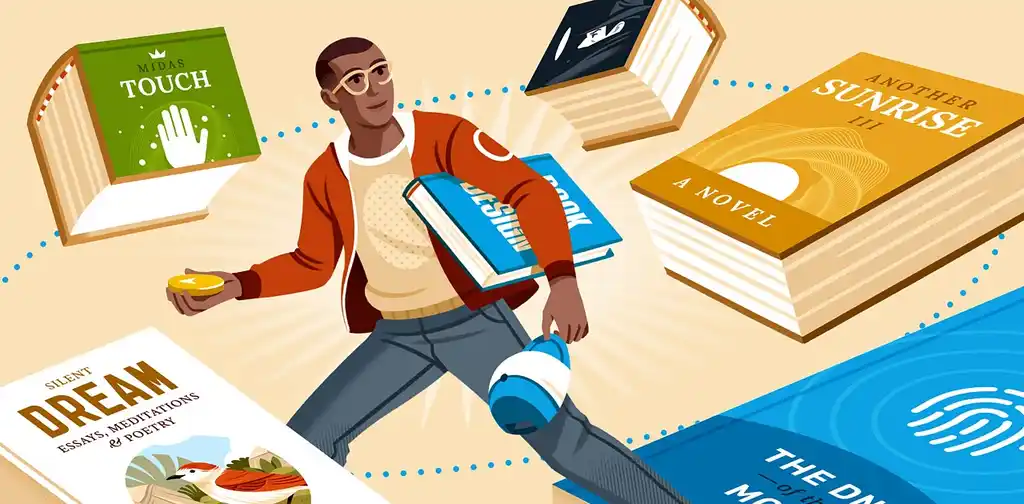
JOIN REEDSY
Find exciting new projects
We connect publishing professionals with our community of 1,500,000 authors.
3. Proofreader
👨🏼💼 Entry level positions: freelance proofreader
💰 Potential beginner’s earning: $20-$30 per hour or $550-$650 per book
Proofreading comes after editing — the proofreader reads the manuscript one final time, after all the revisions are made, to see if any spelling and grammatical errors are missed out. They’re incredibly crucial to the production of a spotless book, so there’s never a shortage of proofreading jobs .
This task is often done on a freelance basis, either by full-time freelancers or by editors who want to take on side jobs. You can specialize in proofreading alone, though most professionals will combine editing and proofreading crafts for better income. As a beginner, opportunities for short-form projects will often be more accessible — stay open-minded about taking them up, but also do some proofreading training to prepare for more exciting gigs.
We’ve also got some resources for this topic for you to check out:
- How to Become a Proofreader: The Ultimate Beginner’s Guide
- How to Choose Your Proofreading Rates
There’s more to journalism than just breaking news on CNN, which means there’s plenty of space for the creative writer in you to flourish in this industry! Let’s take a look at a couple of options you can consider.
4. Columnist
👩🏽💼 Entry level positions: fellowships, junior writer/columnist, freelance writer
💰 Potential beginner’s earning: $25,000-$35,000 per year or $100-$300 per piece
If you like creative nonfiction , you probably have already considered becoming a columnist. In fact, you can even be a books columnist! Job options range from book-specific sites like Electric Literature or Literary Hub, to prestigious newspapers like The Guardian or The New Yorker. But that’s not necessarily the only thing you can write about! You can become a columnist in just about any topic, from social issues to entertainment, as long as you’re interested in the niche.
Look out for fellowships and junior writing jobs in newspapers and magazines and get ready to apply! A degree in relevant subjects like Journalism or English Literature is a great advantage, though your ability to follow up on leads, conduct thorough research, and keep up with the latest trends in a certain niche will be carefully assessed. You can also be a contributing writer first to forge a relationship with the editors before going after a full-time position.
👨🏻💼 Entry level positions: junior writer, freelance writer
There’s a fine line between a critic and a columnist: critics are usually more academically inclined, and they often work more on the arts than columnists. Columnists cover social issues, sports, entertainment in their more general sense, while critics while home in on a particular piece of art, literature, theatre, or movie to offer expert assessment of it.
Similar to the columnists, you can begin with junior writing positions and freelance gigs, in which you build up a writing portfolio of relevant work. Ideally, critics will be more savvy to the technicalities of whatever subject you critique — be it filmography or literature. In other words, formal training like a bachelor’s degree is a good launch pad.
6. News journalist
👩🏼💼 Entry level positions: staff writer/journalist
💰 Potential beginner’s earning: $30,000-$35,000 per year
Writing news articles is different from the writing column pieces: a journalist must maintain an impartial voice and be succinct. Moreover, you’re always looking out for the latest story, whether on social media or on the street (which is where your love for creative writing can come in).
The most common way to get into news journalism is to get a salaried position. You can also apply to internships as well, and there are compensated ones to look out for. What you will need is a degree and some journalist training so that you can use shorthand, know what makes a good story, and know what sources to chase, among other things.
7. Investigative journalist
👨🏽💼 Entry level positions: staff writer/journalist
And what if you’re a fan of true crime ? You might find yourself drawn to investigative journalism! You can chase the tail of anything under the sun, from kidnappings to factory production, from local to international events, so long as there’s an uncovered story there. The topic will often be assigned to you by an editor, and you’ll be given some time to collect information and write the article. It’s a slower pace than daily news, but it’s thrilling nonetheless.
Similar to the news path, you’ll likely start off with an internship or a junior writing position. With this job opportunity, you can build a portfolio that demonstrates your ability to peel back the layers of the onion to reveal new insights to a matter. Again, a degree and training in journalism are essential.
Copywriting
Copywriting is writing to sell a product or service, and it could be anything from newsletter emails to slogans to even commercial scripts! There’s definitely a creative element to it, as you’re always looking for a unique and memorable way to capture the attention of consumers. And since it's so rooted in consumption culture, copywriting is definitely a writing career that's in demand!
Below are several types of copywriting jobs you can go into.
8. Technical copywriter
👩🏻💼 Entry level positions: technical writer, freelance writer
💰 Potential beginner’s earning: $32,000-$38,000 per year
A technical writer works on instructional materials for manuals, white papers, and other informative pieces of writing. A technical copywriter combines that level of specialty with marketing tactics, thereby focusing on promoting products and services that are a bit more, well, technical. Think electronic companies, software developers, repair and maintenance services.
Ideally, you’d have some education or experience in technical sectors (i.e. IT, engineering, finance). That way, you won’t take too much time to familiarize yourself with the jargon, and employers are more likely to hire you. You can also begin with technical writing, if you don’t mind working on material that’s a bit less creative.
9. Advertising copywriter
👨🏼💼 Entry level positions: junior copywriter, communications copywriter
For a more creative writing job, you can go for advertising. This often involves a lot of brainstorming with the creative team of your agency to come up with advertisement campaigns that will leave a mark. When working on this you can write all kinds of content, from slogans to image copies to web content.
Having a bachelor’s degree in marketing or an essay-based discipline is usually beneficial if you’re looking for this kind of job. You can work for a big brand, which will constantly be needing new content, or you can work for a marketing agency, tailoring your work to every client.
10. PR copywriter
👩🏽💼 Entry level positions: junior copywriter
Public relations (PR) is, simply put, the art of building a good reputation, whether that’s for an individual or a brand. You’ll work on press releases, report and presentation writing, material for internal and external communications to present your client’s motivation and direction.
For this kind of job, the precision of your language and your ability to stay up to date with the competitors will be important. A degree in communications or business administration are a plus point. And as is often the case in most writing jobs, the ability to find the human story behind everything will be your best tool.
Content Marketing
Nowadays, traditional marketing on TV, billboards, and posters are only a part of the industry, the other is all about online content. And with so many things zooming about on the Internet, every company will be looking for the most creative person to help them stand out. Which means you get plenty of opportunities to be imaginative, working on website content, blog posts, social media posts, and even videos.
11. Social media manager
👨🏻💼 Entry level positions: assistant/junior/freelance social media specialist
💰 Potential beginner’s earning: $20-$30 per hour or $30,000-$35,000 per year
With our evermore online world, social media-related jobs definitely is a writing career that's in demand. So many things can happen on social media — you might very well go viral overnight! The challenge is getting there. As a social media manager, you get to be the voice of the company, interacting with customers in a friendly, casual way, while also learning their habits and preferences so that you and others on your team can better engage with them.
This is a relatively hands-on job, so experience running a public social media account is the best thing you can have on your CV. A degree in communications can be beneficial, though many job postings don’t require anything specific.
12. Blogger
👩🏼💼 Entry level positions: blogger, freelance writer
💰 Potential beginner’s earning: $0.10-$0.15 per word
Blogging is probably something you’re familiar with as a writer — but do you know it can earn you a good penny? By focusing on a specific subject (it can be books , technology, fashion, the freelance life, etc.), you can attract companies who are looking to strengthen their brand awareness and will sponsor you. It’ll take time to build an attractive platform, but it’s definitely possible.
Beyond that, you can write for others as well. There are plenty of websites that promote creative writing jobs all over, so you can sift through them for the suitable ones. No degree requirements for this job, just your skill with a (proverbial) quill!
13. Content creator
👨🏽💼 Entry level positions: content marketer
💰 Potential beginner’s earning: $27,000-$34,000 per year
If you’re happy to do a bit of everything, then apply to become a content creator. You’ll also get to collaborate with a team to come up with an overall strategy in this position.
You can work for all kinds of companies in this career. A bachelor’s degree in Marketing, English, Communications are highly relevant, though adjacent, essay-based subjects tend to do the job, too. Brushing up on search engine optimization (SEO) is also wise.
Pop culture, the latest rumors and gossip, interesting observations served on a pretty platter — if any of that sounds interesting to you, you can jump into the media industry. Here are some job options if you want to take this route.
14. Screenwriter
👩🏻💼 Entry level positions: assistant/associate writer
💰 Potential beginner’s earning: $20-$30 per hour or $9,000-$15,000 per project
Everyone of us has probably at one point or another thought about entering the film and TV industry, and that career goal is definitely achievable, if you know where to look. A lot of people start with assistant positions to learn the ropes and get an opportunity to work on bigger productions. If you prefer to write from the get-go, you can go for lower-budget projects.
To get one of the assistant positions and put yourself out there, touch up on craft skills like plotting, story structures , character-building to be prepared. No qualifications are specified in most cases.
15. Broadcast journalist
👨🏼💼 Entry level positions: staff writer
We’ve covered written news — now comes broadcast news. From televised reports to radio sessions, you can be the writer behind the words that reporters or presenters read out. It’s a fast-paced job that deals with the latest real-life stories, which can be incredibly rewarding, even if it’s not explicitly creative.
Many broadcast journalists work project by project (unless it’s periodical news), almost like a freelancer. You’ll still need to have all the skills necessary to put together a good news story, so some journalist training will be beneficial.
16. Podcaster
👩🏻💼 Entry level positions: assistant/associate writer or producer
💰 Potential beginner’s earning: $18-$25 per hour, or $26,000-$32,000 per year
Along the same lines as a broadcast journalist is the job of a podcaster. This is a bit more topical than journalism, and you can really home into certain fields and explore it in depth. Another special thing about podcasters is they usually host the shows, too! So if you’re confident about your voice, and about interviewing others, there’s no reason not to try this out.
As with screenwriting, the route to get into this sector can be a little bit challenging, since it’s often a case of catching an opportunity from the right people at the right time. Which is why assistant jobs are a strong start.
And finally, we arrive at the section that hopeful writers often dream about more than anything else. Publishing a book is not easy, it requires not just time and effort but also finances, if only to keep you afloat while completing the manuscript. That said, it’s possible to do it on the side with another full-time job, as is the case for most published writers.
The cool thing about this career is that you are your own boss — i.e. there are no entry level positions. You are an author the day you call yourself one.
17. Short story writer
Short stories are charming in their own right, and with the booming literary magazine sphere , there’s no shortage of space to get your words out there into the world. Publishing an anthology with a publisher is also an option but it’s harder — you often need to have an established career first.
In any case, most magazines aim to have enough funds to pay their contributors. Small ones can pay $15-$20 per story, bigger ones $100-$200. You can also enter writing contests to win higher prizes.
18. Novelist
Being a novelist comes with the difficulty of having the time and finances to write a full draft before you can propose it to publishers, or even publish it yourself. It’s a long commitment, and it doesn’t guarantee a payoff. If it does get printed, a book deal can get you an advance in the $5,000-$15,000 range. If you self-publish, what you get depends on how well you market your books — emphasis on the plural noun!
That said, it’s not impossible. We’ve got a whole post on how to become a novelist here if you want some pointers from famous writers like Anne Lamott and Zadie Smith!
19. Nonfiction author
Who says creative writing jobs have to be all about fiction? Creative nonfiction is a growing field that’s always welcoming new stories. From memoirs and biographies to true crime, from self-help to essay collections, you can focus on many different topics with this option.
The nice thing about it all is that unlike fiction writers, you can pitch your book proposal to publishers before you complete a whole manuscript for nonfiction titles, meaning you can be guaranteed some kind of results before you start writing. The advance amount is similar to that for novels.
And last but not least, you can become a poet! Poets tell stories with rhythm and rich imagery, and not just on paper but also with their voice. Performing poetry is one of the special advantages that comes with this form of writing. Not only does it let you and the audience experience in a new way, it’s also a great opportunity to grow as an artist.
On top of that, you can also dabble in other industries (advertising, music producers…) as a lyricist. As it’s a gig-based employment, you probably want to diversify your work portfolio to make sure there’s always something you can work on. The rates are usually similar to that of a ghostwriter.
And voila, that’s the end to our master list of creative writing jobs! Hopefully, there’s something to help you passion live on among this many options.
Earn more than you would at a publishing house
Create your free Reedsy profile to get started.

Create your Reedsy freelancer account
We have some great projects already lined up for you to work on.
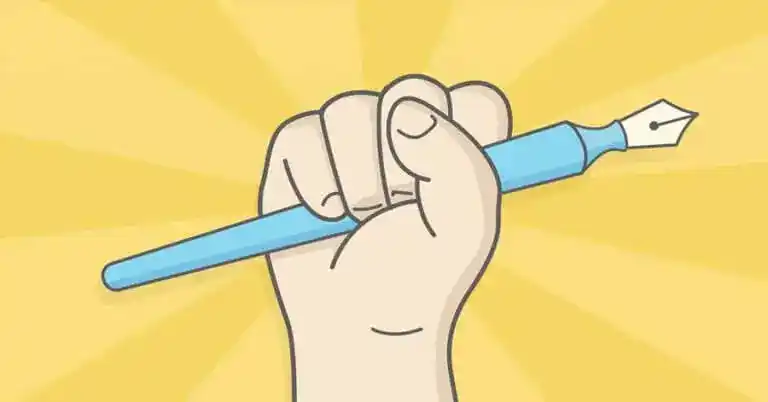
Supercharge your freelance career
Sign up to receive tips for growing your business.
1 million authors trust the professionals on Reedsy. Come meet them.
Enter your email or get started with a social account:
Do you scribble poems along the margins of your math homework? Are you obsessed with short stories? Do you dream of publishing a book one day?
If so, a degree in creative writing might be for you. This fascinating field of study offers hands-on training in genres of all kinds, from memoir to screenwriting, fiction to personal essay. Through lectures, seminars, workshops, and critique groups, students learn to recognize and create high quality writing. They practice developing their own projects and critiquing those of their peers. They learn to edit, revise, and refine their work; meet deadlines; and pitch their creations for publication. Plus, they gain access to top professionals in the field, networking with esteemed novelists , poets, screenwriters , and other creative writers .
If you think a creative writing degree might be for you, read on. In this article, we’ll cover:
- What kinds of creative writing degrees are out there?
- What sets creative writing apart from similar degrees, like journalism or English literature?
- What skills will you gain from a degree in creative writing?
- What can you do with a creative writing degree?
Bachelor of Fine Arts Degree in Creative Writing\u2014 Four Year Duration \nBachelor’s degrees in creative writing typically take about four years to complete. They offer a broad introduction to the main genres of creative writing, including screenwriting, creative nonfiction, poetry, short story, memoir, and more. Students learn about the basics of plot, style, character, and story structure. They practice writing in different styles and genres, and also learn to read and critique other students’ work. In addition, most bachelor’s degrees offer plenty of opportunities to network with other writers and publishing professionals.
Master of Fine Arts Degree in Creative Writing \u2014 Two Year Duration \nMaster’s programs in creative writing offer an opportunity to dive even deeper into the craft. Most take about two years to complete, and combine hands-on writing workshops with seminar courses by professional writers. At the end of the program, students typically complete a dissertation or thesis. Depending on the program, this could be a novel, memoir, poetry collection, or some other long-form piece of writing that is ready to submit for publication.
Doctoral Degree in Creative Writing \u2014 Four Year Duration \nInterested in becoming a professor of creative writing? A Ph.D. may be in your future. Doctoral programs in creative writing are highly intensive and specialized. They tend to focus on mastering critique, research, and academic writing, rather than on building creative writing skills.
Although obtaining a Ph.D. is one way to get an academic job, it isn’t the only option. Often, faculty positions in creative writing are offered to candidates who have published books or screenplays, rather than to candidates with formal academic training.
No matter what path you choose, a degree in creative writing can serve you well\u2014both in the writing world and beyond. Most students graduate with valuable professional skills under their belt, including:
- Communication (written and oral)
- Research and critical reading skills
- Editing, proofreading, and revision
- Constructive feedback and critique
- Ability to meet deadlines and manage your own time
Advertising \nLike digital marketing, advertising is all about persuasion. Penning the words for the perfect jingle or TV ad takes creativity and precision. With their mastery of the English language and awareness about the power of words, creative writing majors are a natural fit. Many pursue careers as advertising managers , copywriters , or art directors .
TV, Film, and Radio \nIn the age of Netflix, YouTube, and podcasts, the potential opportunities for talented storytellers are endless. With the right connections and experience, creative writing majors can pursue work as screen writers, radio producers, and even film editors .
Libraries and Archives \nWith their literary knowledge and their passion for the written word, creative writing graduates can make excellent librarians . From positions in academic libraries to rare book collections, there are lots of different options to explore. Although many jobs in this domain do require extra training, others, like library assistant , do not. Gain some experience in the area and build up your skills; if the profession feels like a fit, consider pursuing a degree in library and archival studies.
Education \nLast but not least, a creative writing degree can be the perfect training for a career in education. With their mastery of the English language, many creative writing graduates go on to become successful high school teachers , creative writing lecturers, or instructors for English as a Learned Language (ELL) courses. Others become professional tutors or personal mentors, offering one-on-one coaching to aspiring writers. Still others start their own workshops or training programs, helping new writers fall in love with the craft.
Creative writing degree overview
In this article:, what is a creative writing degree, program options, degrees similar to creative writing, skills you’ll learn, what can you do with a creative writing degree.
If you think a creative writing degree might be for you, read on. In this article, we’ll cover:
A quick Google search for "how to study creative writing" will reveal just how many degree options there are available. Most universities and colleges now offer some form of creative writing program, both at the undergraduate and graduate levels. But as you’ll see, there are lots of other ways to learn creative writing, from online courses to workshops and more.
Self Study Are you curious about writing but not ready to invest in a formal degree? If you’re a dedicated and self-motivated learner, taking your studies into your own hands can be a great option. For example, you could:
- Join a creative writing group (or create your own!)
- Enrol in an online writing class
- Sign up for a writing residency or workshop
- Intern or volunteer for a magazine or newsletter to gain first-hand writing experience
- Start (and maintain) your own blog
- Find a writing mentor or hire a writing coach
- Build your own degree: Set yourself a writing schedule and ensure you stick to it. You could write daily, weekly, or even monthly—just as long as you’re consistent.
Certificate in Creative Writing — Varying Durations Pursuing a certificate in creative writing is another affordable, flexible degree option. These programs tend to be shorter than university degrees, often taking less than a year to complete. Many can be done part-time or online, making it possible to work while you study. Certificate programs in creative writing tend to focus on skill building, rather than writing theory.
Of course, professional certifications aren’t necessary for most writing jobs. But freelance writing is a competitive space, and having a certificate can help you stand out from the crowd. Some writers also say this training allows them to charge higher rates for their services.
Bachelor of Fine Arts Degree in Creative Writing— Four Year Duration Bachelor’s degrees in creative writing typically take about four years to complete. They offer a broad introduction to the main genres of creative writing, including screenwriting, creative nonfiction, poetry, short story, memoir, and more. Students learn about the basics of plot, style, character, and story structure. They practice writing in different styles and genres, and also learn to read and critique other students’ work. In addition, most bachelor’s degrees offer plenty of opportunities to network with other writers and publishing professionals.
Master of Fine Arts Degree in Creative Writing — Two Year Duration Master’s programs in creative writing offer an opportunity to dive even deeper into the craft. Most take about two years to complete, and combine hands-on writing workshops with seminar courses by professional writers. At the end of the program, students typically complete a dissertation or thesis. Depending on the program, this could be a novel, memoir, poetry collection, or some other long-form piece of writing that is ready to submit for publication.
Doctoral Degree in Creative Writing — Four Year Duration Interested in becoming a professor of creative writing? A Ph.D. may be in your future. Doctoral programs in creative writing are highly intensive and specialized. They tend to focus on mastering critique, research, and academic writing, rather than on building creative writing skills.
Although obtaining a Ph.D. is one way to get an academic job, it isn’t the only option. Often, faculty positions in creative writing are offered to candidates who have published books or screenplays, rather than to candidates with formal academic training.
Many students struggle when choosing between a creative writing and a related degree, like journalism or English literature. Although these three programs share some commonalities, they are distinct in key ways.
Journalism Both journalism and creative writing degrees offer hands-on training in written communication. Both help students develop essential techniques in research, writing, editing, critique, and revision. However, journalism focuses primarily on communicating real events and information—that is, writing news articles, opinion pieces, feature articles, and other non-fiction content. Creative writing, on the other hand, incorporates fantastical elements, combining real-world facts or settings with ideas drawn from the writer’s imagination.
English Literature Some people believe that being able to create great writing begins with appreciating great writing. English literature teaches students to do just that. Through critical reading, research, essay writing, and presentations, this degree trains students to understand and analyze acclaimed writing from all over the world.
English literature students study classics and contemporary works, covering everything from haiku to 800-page novels. However, although these programs will help you learn to recognize excellent writing, few will actually teach you how to write. Creative writing programs, on the other hand, focus primarily on building hands-on writing and editing skills.
No matter what path you choose, a degree in creative writing can serve you well—both in the writing world and beyond. Most students graduate with valuable professional skills under their belt, including:
Although many students enrol in a creative writing degree in hopes of becoming an author one day, this isn’t the only career option available. Here are some of the many professional directions creative writing graduates can pursue. Here are a few of the most common ones:
Content Writing The demand for high quality digital writing is growing, as more and more businesses are moving online. With a creative writing degree, you can help companies of all kinds prepare newsletters, social media posts, blogs, website pages, and more. You could become a freelance content writer, work as a corporation’s head of content, or even start your own blog .
Journalism Journalism and creative writing are distinct professions, but they share common features. Both rely on the power of storytelling to engage different audiences. Both require strong skills in research and communication. With so many similarities, it’s no surprise that many creative writing graduates find success as writers, editors, and fact checkers for magazines, newspapers, and other media companies.
Communications Just like writing a great piece of fiction, communicating effectively requires clarity, awareness, and a knack for the written word. Creative writing majors are ideally suited to a number of communication roles. Many pursue public relations positions, preparing compelling press releases, speeches, and more for clients of all kinds. Others pursue careers in internal communications, publicity, or public outreach.
Publishing Publishing is another promising career path to consider after a creative writing degree. Aside from becoming a published author, creative writing majors can pursue jobs such as book editors , proofreaders , editorial assistants, or ghostwriters. While less obviously related to writing, publishing jobs in other departments—like sales, marketing, or production—can also be a great fit.
Digital Marketing Digital marketing is a fast-growing field with lots of exciting career opportunities. Digital marketing jobs focus on promoting different products, services, events, or brands to online customers, using tools like social media, email marketing, and Search Engine optimization (SEO).
Creative writing graduates are skilled communicators, great at using words to entice and persuade. They can make excellent social media managers , digital marketing specialists , SEO specialists , and more.
Advertising Like digital marketing, advertising is all about persuasion. Penning the words for the perfect jingle or TV ad takes creativity and precision. With their mastery of the English language and awareness about the power of words, creative writing majors are a natural fit. Many pursue careers as advertising managers , copywriters , or art directors .
TV, Film, and Radio In the age of Netflix, YouTube, and podcasts, the potential opportunities for talented storytellers are endless. With the right connections and experience, creative writing majors can pursue work as screen writers, radio producers, and even film editors .
Libraries and Archives With their literary knowledge and their passion for the written word, creative writing graduates can make excellent librarians . From positions in academic libraries to rare book collections, there are lots of different options to explore. Although many jobs in this domain do require extra training, others, like library assistant , do not. Gain some experience in the area and build up your skills; if the profession feels like a fit, consider pursuing a degree in library and archival studies.
Education Last but not least, a creative writing degree can be the perfect training for a career in education. With their mastery of the English language, many creative writing graduates go on to become successful high school teachers , creative writing lecturers, or instructors for English as a Learned Language (ELL) courses. Others become professional tutors or personal mentors, offering one-on-one coaching to aspiring writers. Still others start their own workshops or training programs, helping new writers fall in love with the craft.
See which schools are the most and least expensive.

Creative Writing
- Tuition & Costs
- Satisfaction
- Career Paths

Creative Writing Careers: Exploring Future Prospects for Aspiring Writers

In a world where technology continues to evolve, and traditional job roles are being redefined, creative writing careers have emerged as exciting and viable options for individuals with a passion for words. Gone are the days when writing was solely confined to the realm of literature or journalism. Today, the demand for skilled writers extends across various industries, offering a plethora of opportunities for those seeking a career in writing. In this blog post, we will delve into the diverse career prospects available to future writers and explore how this field continues to evolve in the digital age.
1. Content Creation and Copywriting:
As the digital landscape expands exponentially, the need for engaging and persuasive content has never been greater. Companies, both large and small, are constantly in search of skilled writers to create compelling content for their websites, blogs, social media platforms, and marketing campaigns. A content creation and copywriting career allows writers to showcase their creativity while delivering impactful messages to target audiences.
2. Editing and Publishing:
Behind every great writer is an equally great editor. The publishing industry relies heavily on professionals with a keen eye for detail and a deep understanding of language and grammar. Whether it's working for a publishing house, literary agency , or as a freelance editor, there are ample opportunities for aspiring writers to embark on a career path that involves refining and polishing the work of others.
3. Technical Writing and Documentation:
Technical writing is a specialized field that involves translating complex concepts into clear and concise language. Software development, engineering, and healthcare industries require skilled technical writers to create user manuals, product documentation, and instructional guides. This career path blends writing with a strong understanding of technical subjects, making it an excellent option for those who enjoy both writing and problem-solving.
4. Journalism and Freelance Writing:
While the rise of digital media has disrupted traditional journalism, it has opened up new avenues for writers to share their perspectives and expertise. Journalists now leverage online platforms, such as blogs and independent publications, to report on various topics and directly engage with their audiences. Additionally, freelance writing offers the flexibility to work on diverse projects, ranging from feature articles to ghostwriting books, enabling writers to build a versatile portfolio.
5. Teaching and Writing Education:
For writers who have a passion for sharing their knowledge and nurturing the next generation of wordsmiths, a career in teaching or writing education can be immensely rewarding. Many universities and educational institutions offer creative writing programs where experienced writers can serve as mentors and instructors. Moreover, online platforms and workshops allow writers to create their own courses and share their expertise with a global audience.
The realm of creative writing careers has expanded significantly in recent years, offering aspiring writers a range of exciting prospects. From content creation and copywriting to editing, technical writing, journalism, and teaching, the opportunities in this field are diverse and ever-evolving. With the advent of the digital age, writers have found new platforms to express their creativity and connect with audiences worldwide. Whether you dream of becoming a novelist, a blogger, or a copywriter for a major brand, the path to a fulfilling writing career is within reach. Embrace your passion, hone your skills , and seize the opportunities that lie ahead as a future writer. For more ideas, check out The Big List of Careers for Writers .

Share this post:
Similar Blogs

Making a Writing Career: Tips from Professional Writers
If you’re a true lover of the written word (and we know you are!) you’ve probably wondered how you...

Delicious Writing: Food Writing Examples from Students
by Michael Lydon
How does writing work? Why is it that if we arrange the graphic symbols we...

Food Writing Competition: Expert Tips on How to Write About Food
Food writing may be an entirely new genre to you, or one that you want to gain more experience...
What Jobs Can You Do With a Master’s Degree in Creative Writing?

What is a Master’s Degree in Creative Writing?
For those who love the written word, earning a graduate-level degree in creative writing can open a wide world of creative career opportunities. Earning a creative writing master’s degree shows you how to take an inkling of an idea and build a fully-formed narrative that can be applied to short stories, novels or screenplays. Editing is a crucial component of the creative writing process, and this program teaches students how to fine-tune their writing at all levels. A master’s degree program will help students refine their writing abilities, explore different styles and forms of writing, and gain a deeper understanding of the publishing world.
Benefits of Getting a Master’s Degree in Creative Writing
Earning a creative writing master’s degree lets you put your imagination and talent on display. There are plentiful opportunities for what you can do with a creative writing master’s degree. This master’s degree is typically pursued by individuals who are passionate about writing and want to hone their skills, whether for personal development or to pursue a career in the literary world. It can be a stepping stone to becoming a published author, a professional writer, or a creative writing instructor.
Career Opportunities
Whether you’re interested in being published or want to teach others how they can write creatively, there is a lot that you can do with a creative writing Master’s degree. According to the U.S. Bureau of Labor Statistics, over the next decade the demand for writers and authors is expected to grow by 4 percent, with an average of 15,500 openings for writers projected annually. With any role, creative writing requires persistence, resilience and the ability to tap into a strong professional network.
Content Writer/Copywriter
Content writers and copywriters can be found in a wide range of industries, from nonprofits and government agencies to startups and multinational companies. These writers are skilled at helping clients say something in order to sell something, and are typically part of a marketing or creative team. Earning a creative writing master’s degree is a benefit to content creators and copywriters, earning a creative writing master’s degree is beneficial to content creators and copywriters, because creative writing shows how language and narrative can be used to compel and captivate readers.
Freelance Writer
Freelance writers are self-employed professionals who are able to write in a number of styles and formats, depending on their clientele. In addition to building a strong writing portfolio, participating in a rigorous creative writing master’s degree program develops critical thinking and time management skills — which comes in handy, because freelancers must be able to manage both the business and creative sides of work.
Public Relations Specialists
This job relies heavily on exceptional written and verbal skills, and primarily involves writing press releases, speeches, social media content and responding to inquiries — often on tight deadlines. Creativity is essential in public relations, as are strong communications skills. With a master’s degree in creative writing, public relations specialists are well-positioned to persuade the masses.
Creative Director
Most often found at marketing and advertising agencies, creative directors are the final decision-makers for all things creative — strategy, copywriting, graphic design and more. Being a creative director requires a sharp, strategic mind and the ability to express a creative point of view. Earning a creative writing master’s degree prepares future creative directors to both give and receive criticism, understand the creative process and guide junior creatives to bring their best work.
Publishing Industry Professional
Working within the fast-paced publishing industry requires sharp creative sensibilities and awareness of industry trends. Publishing industry professionals range from manuscript readers to literary agents, editors to publicists. No matter the role within this industry, earning a master’s degree brings a level of credibility and enhanced skills – particularly at Tiffin University, where the creative writing master’s degree program includes two classes on the publishing industry.
Professor / Teacher
With an advanced degree in creative writing, it’s possible to shape the next generation of creative writers as an educator. Creative writing teachers help their students build a foundation to use language more effectively and develop the tools to make their writing impactful. Because they understand what it takes to be a writer, teachers with a master’s degree in creative writing can also provide valuable mentorship to aspiring authors.
Grant Writer
Grant writers are invaluable to nonprofit organizations, businesses and individuals — all who rely on these writers to help secure vital funding. This role entails researching, drafting and submitting proposals for grants, and the ability to write compellingly is critical. A creative writing master’s degree strengthens technical skills like narrative development, revising and editing, which easily transfer to a career as a grant writer.
Ghostwriter
A ghostwriter is the unseen creative force behind published works like fiction and nonfiction books and screenplays. With all of the creative possibilities available to ghostwriters, completing a master’s degree is an excellent way to perfect the ability to write in a variety of styles, for a variety of clients.
Screenwriter
If you aspire to work in the entertainment industry, a creative writing master’s degree can provide the onramp to a career as a screenwriter. Because Tiffin University’s creative writing program is rooted in narrative development, students interested in screenwriting will fully understand the elements of storytelling and how to make their work translate to the screen.
What Skills Complement a Creative Writing Career?
Being able to generate new ideas, and translate those ideas into a compelling narrative is essential to a career in creative writing. The most successful creative writers are those who can imagine worlds that don’t exist, breathe life into them and keep readers wanting more. In addition to creativity, writers must also ensure the plot and narrative arc of their work is interesting as well as cohesive, which is a task best suited to those with a knack for originality.
Critical Thinking
Critical thinking and creative writing go hand in hand. The ability to process information, and then translate that information into logical and persuasive writing is a valuable skill that every writer should possess. Critical thinking is especially important for authors working in nonfiction and business writing, to ensure work is written without biases and considers differing viewpoints.
Research / Information Gathering
Most creative writing projects begin with some sort of research, whether combing through library stacks or doing a deep dive on the internet. Writers should be able to navigate a range of references, like textbooks, encyclopedias, newspapers or even historical documents. These primary sources can help spark ideas that lead to the next great story.
Creative Writing at Tiffin University
The creative writing Master’s degree program at Tiffin University is offered online, making it ideal for adult students with busy lives but a passion to learn. Throughout this program, students prepare to get into publishing by finding their voice, honing their writing skills, writing in a workshop setting and learning from instructors who have themselves been published. Being taught by experienced faculty also provides valuable insight into how the publishing industry works, as well as the many career paths creative writing can lead to.
Both flexible and affordable, Tiffin University is a wonderful institution for creative writers to launch a career.
Are you a high school student hoping to attend Tiffin University?

- Employability Skills
The Importance of Creative Writing in Your Professional Career
Search SkillsYouNeed:
Employability Skills :
- Finding a Job
- Finding a Job: Using Platforms and Marketplaces
- Applying for a Job
- Job Applications and Disabilities
- Writing a CV or Résumé
- Writing a Covering Letter
- Using LinkedIn Effectively
- Managing Your Online Presence
- Interview Skills
- Presentations in Interviews
- Personal Development
- Continuous Professional Development (CPD)
- Networking Skills
- Top Tips for Effective Networking
- Developing Commercial Awareness
- Transferable Skills
- The Importance of Mindset
- Lifelong Learning
- Critical Thinking
- Reflective Practice
- The Skills Gap
- Soft Skills
Subscribe to our FREE newsletter and start improving your life in just 5 minutes a day.
You'll get our 5 free 'One Minute Life Skills' and our weekly newsletter.
We'll never share your email address and you can unsubscribe at any time.
While it may seem that creative writing is something that only liberal arts majors and people in writing careers need, the ability to write well and to communicate effectively is important in many different places within the business world.
Creative writing is a business skill that few people choose to cultivate and that helps boost those who do above their competition.
Many of the best CEOs in the world have extremely advanced creative writing skills that they use on a regular basis and that helps them win over contracts and support on a regular basis.
Advantages of Creative Writing
Many shareholders appreciate when information is given to them in a concise manner. However, they also appreciate when communication from a company that they are investing in takes the time to write them a creative and well-worded newsletter. Having the ability to communicate effectively while exciting investors and keeping them up to date on the inner workings of your company is an important skill for any manager. This can also translate over to thanking individual investors and keeping them up to date with the impact that their financial backing has made within your institution.
Within the company itself , memos, emails and other communication with employees will generally be better received if they are funny, interesting, and relevant to the situation at hand.
Softening bad news or explaining an issue to your employees in a way that they are able to understand will have a much bigger impact than a tersely worded memo that creates confusion and a hostile atmosphere. This can help you be a much more effective manager and show that you are ready to take on higher levels of responsibility while still having the support of your employees and those that you interact with on a day-to-day basis.
Investment Plans will generally go over smoother if they have interesting projections, well thought out predictions, and information that shows everyone involved that they have been under consideration for a long time. Deploying your creative writing skills to expand upon presentations, facts, and quick information, will make it easier to woo over individuals who are not quite on board with your plans.
This also makes it easier for the media and other outlets to tell the public about your plans and can be used to gain viral support from groups that would otherwise ignore your plans or brush them off before they come to fruition.
See also: How to Write a Press Release .

Further Reading from Skills You Need
The Skills You Need Guide to Getting a Job
Develop the skills you need to get that job.
This eBook is essential reading for potential job-seekers. Not only does it cover identifying your skills but also the mechanics of applying for a job, writing a CV or resume and attending interviews.
Professional Image
Your professional image can also be bolstered or tarnished depending upon your writing and your ability to communicate in a creative way.
This is because people in this business world are perceived as being well educated, and this assumption has colored what the world sees as professionalism. If you come across as unable to effectively communicate and seem like you are lacking in creativity, people are going to view you as less professional and react to you in a less than favorable manner. Being able to introduce yourself, reply to official correspondence, and contribute to documents with a high level of skill will show you to be a true professional and will impress many people.
Personal documentation such as an online profile, notes on contracts, and information for your future use will also come across better when it is well written.
If you are excited about a future opportunity, buy into the idea of writing yourself notes, or want to keep a personal record for your successors, writing in a creative manner will keep it interesting and help explain your needs and desires better. This is also a great way to ensure that you are not bored when you look back at your previous notes, and may help you find information that is important without much difficulty.
Improved Leadership Skills
Leadership skills are also helped when you are able to work on your creative writing and go out of your way to apply this skill.
We already talked about using creative writing for your office memos, but it can also be used to demonstrate your ability to lead.
Depending on your position, your boss may expect detailed reports and will often use them when considering who to promote and who they want to delegate more information to over time.
Writing your reports to be engaging, well thought out, and interesting will increase the chances that they will see you as a good candidate.
Memorability is another reason that you should seek to improve your creative writing skills over time. As everyone in business knows, you are your own personal brand and everything you do should be done with that in mind. To that end, you are always seeking to make yourself memorable (for the right reasons) and to increase your personal brand recognition.
Well written information and plans are one way to ensure that you remain memorable to people when they first come into contact with you in a formal business sense. If you struggle with creative writing, you may find it helpful to use creative writing services .
Now more than ever, written communication is necessary for business and for personal communication. The age of meeting every week is over, and the age of Skype messages, Google collaborations, mass emails, and text messages has taken over. In this world, it is extremely important to get your point across without seeming like you are struggling for words. In addition, people who use these skills find that they remember more in meetings and are more comfortable communicating with people face to face.
Improved Communication
The communication process as a whole is improved when you are better at creative writing and take the time to apply concepts from courses you have taken to your work.
While terse communication can get information across, creative communication invites collaboration and marks you as an individual with a high level of professional commitment.
You may find that you are able to maintain better business relationships when you open yourself to new ways of communicating, and that your older relationships improve over time as well. No matter how big or small your company is, you will find that effective communication is the best way to move up in life.
About the Author
Jonathan Leger is a freelance writer and small business owner. He runs a popular question and answer website.
Continue to: The Importance of Plain English How to Write a Business Case
See also: Using LinkedIn Effectively Writing an Executive Summary How Creative Writing Will Make You Better in Business

What is Creative Writing? A Key Piece of the Writer’s Toolbox
Not all writing is the same and there’s a type of writing that has the ability to transport, teach, and inspire others like no other.
Creative writing stands out due to its unique approach and focus on imagination. Here’s how to get started and grow as you explore the broad and beautiful world of creative writing!
What is Creative Writing?
Creative writing is a form of writing that extends beyond the bounds of regular professional, journalistic, academic, or technical forms of literature. It is characterized by its emphasis on narrative craft, character development, and the use of literary tropes or poetic techniques to express ideas in an original and imaginative way.
Creative writing can take on various forms such as:
- short stories
- screenplays
It’s a way for writers to express their thoughts, feelings, and ideas in a creative, often symbolic, way . It’s about using the power of words to transport readers into a world created by the writer.
5 Key Characteristics of Creative Writing
Creative writing is marked by several defining characteristics, each working to create a distinct form of expression:
1. Imagination and Creativity: Creative writing is all about harnessing your creativity and imagination to create an engaging and compelling piece of work. It allows writers to explore different scenarios, characters, and worlds that may not exist in reality.
2. Emotional Engagement: Creative writing often evokes strong emotions in the reader. It aims to make the reader feel something — whether it’s happiness, sorrow, excitement, or fear.
3. Originality: Creative writing values originality. It’s about presenting familiar things in new ways or exploring ideas that are less conventional.
4. Use of Literary Devices: Creative writing frequently employs literary devices such as metaphors, similes, personification, and others to enrich the text and convey meanings in a more subtle, layered manner.
5. Focus on Aesthetics: The beauty of language and the way words flow together is important in creative writing. The aim is to create a piece that’s not just interesting to read, but also beautiful to hear when read aloud.
Remember, creative writing is not just about producing a work of art. It’s also a means of self-expression and a way to share your perspective with the world. Whether you’re considering it as a hobby or contemplating a career in it, understanding the nature and characteristics of creative writing can help you hone your skills and create more engaging pieces .
For more insights into creative writing, check out our articles on creative writing jobs and what you can do with a creative writing degree and is a degree in creative writing worth it .
Styles of Creative Writing
To fully understand creative writing , you must be aware of the various styles involved. Creative writing explores a multitude of genres, each with its own unique characteristics and techniques.
Poetry is a form of creative writing that uses expressive language to evoke emotions and ideas. Poets often employ rhythm, rhyme, and other poetic devices to create pieces that are deeply personal and impactful. Poems can vary greatly in length, style, and subject matter, making this a versatile and dynamic form of creative writing.
Short Stories
Short stories are another common style of creative writing. These are brief narratives that typically revolve around a single event or idea. Despite their length, short stories can provide a powerful punch, using precise language and tight narrative structures to convey a complete story in a limited space.
Novels represent a longer form of narrative creative writing. They usually involve complex plots, multiple characters, and various themes. Writing a novel requires a significant investment of time and effort; however, the result can be a rich and immersive reading experience.
Screenplays
Screenplays are written works intended for the screen, be it television, film, or online platforms. They require a specific format, incorporating dialogue and visual descriptions to guide the production process. Screenwriters must also consider the practical aspects of filmmaking, making this an intricate and specialized form of creative writing.
If you’re interested in this style, understanding creative writing jobs and what you can do with a creative writing degree can provide useful insights.
Writing for the theater is another specialized form of creative writing. Plays, like screenplays, combine dialogue and action, but they also require an understanding of the unique dynamics of the theatrical stage. Playwrights must think about the live audience and the physical space of the theater when crafting their works.
Each of these styles offers unique opportunities for creativity and expression. Whether you’re drawn to the concise power of poetry, the detailed storytelling of novels, or the visual language of screenplays and plays, there’s a form of creative writing that will suit your artistic voice. The key is to explore, experiment, and find the style that resonates with you.
For those looking to spark their creativity, our article on creative writing prompts offers a wealth of ideas to get you started.
Importance of Creative Writing
Understanding what is creative writing involves recognizing its value and significance. Engaging in creative writing can provide numerous benefits – let’s take a closer look.
Developing Creativity and Imagination
Creative writing serves as a fertile ground for nurturing creativity and imagination. It encourages you to think outside the box, explore different perspectives, and create unique and original content. This leads to improved problem-solving skills and a broader worldview , both of which can be beneficial in various aspects of life.
Through creative writing, one can build entire worlds, create characters, and weave complex narratives, all of which are products of a creative mind and vivid imagination. This can be especially beneficial for those seeking creative writing jobs and what you can do with a creative writing degree .
Enhancing Communication Skills
Creative writing can also play a crucial role in honing communication skills. It demands clarity, precision, and a strong command of language. This helps to improve your vocabulary, grammar, and syntax, making it easier to express thoughts and ideas effectively .
Moreover, creative writing encourages empathy as you often need to portray a variety of characters from different backgrounds and perspectives. This leads to a better understanding of people and improved interpersonal communication skills.
Exploring Emotions and Ideas
One of the most profound aspects of creative writing is its ability to provide a safe space for exploring emotions and ideas. It serves as an outlet for thoughts and feelings , allowing you to express yourself in ways that might not be possible in everyday conversation.
Writing can be therapeutic, helping you process complex emotions, navigate difficult life events, and gain insight into your own experiences and perceptions. It can also be a means of self-discovery , helping you to understand yourself and the world around you better.
So, whether you’re a seasoned writer or just starting out, the benefits of creative writing are vast and varied. For those interested in developing their creative writing skills, check out our articles on creative writing prompts and how to teach creative writing . If you’re considering a career in this field, you might find our article on is a degree in creative writing worth it helpful.
4 Steps to Start Creative Writing
Creative writing can seem daunting to beginners, but with the right approach, anyone can start their journey into this creative field. Here are some steps to help you start creative writing .
1. Finding Inspiration
The first step in creative writing is finding inspiration . Inspiration can come from anywhere and anything. Observe the world around you, listen to conversations, explore different cultures, and delve into various topics of interest.
Reading widely can also be a significant source of inspiration. Read different types of books, articles, and blogs. Discover what resonates with you and sparks your imagination.
For structured creative prompts, visit our list of creative writing prompts to get your creative juices flowing.
Editor’s Note : When something excites or interests you, stop and take note – it could be the inspiration for your next creative writing piece.
2. Planning Your Piece
Once you have an idea, the next step is to plan your piece . Start by outlining:
- the main points
Remember, this can serve as a roadmap to guide your writing process. A plan doesn’t have to be rigid. It’s a flexible guideline that can be adjusted as you delve deeper into your writing. The primary purpose is to provide direction and prevent writer’s block.
3. Writing Your First Draft
After planning your piece, you can start writing your first draft . This is where you give life to your ideas and breathe life into your characters.
Don’t worry about making it perfect in the first go. The first draft is about getting your ideas down on paper . You can always refine and polish your work later. And if you don’t have a great place to write that first draft, consider a journal for writing .
4. Editing and Revising Your Work
The final step in the creative writing process is editing and revising your work . This is where you fine-tune your piece, correct grammatical errors, and improve sentence structure and flow.
Editing is also an opportunity to enhance your storytelling . You can add more descriptive details, develop your characters further, and make sure your plot is engaging and coherent.
Remember, writing is a craft that improves with practice . Don’t be discouraged if your first few pieces don’t meet your expectations. Keep writing, keep learning, and most importantly, enjoy the creative process.
For more insights on creative writing, check out our articles on how to teach creative writing or creative writing activities for kids.
Tips to Improve Creative Writing Skills
Understanding what is creative writing is the first step. But how can one improve their creative writing skills? Here are some tips that can help.
Read Widely
Reading is a vital part of becoming a better writer. By immersing oneself in a variety of genres, styles, and authors, one can gain a richer understanding of language and storytelling techniques . Different authors have unique voices and methods of telling stories, which can serve as inspiration for your own work. So, read widely and frequently!
Practice Regularly
Like any skill, creative writing improves with practice. Consistently writing — whether it be daily, weekly, or monthly — helps develop your writing style and voice . Using creative writing prompts can be a fun way to stimulate your imagination and get the words flowing.
Attend Writing Workshops and Courses
Formal education such as workshops and courses can offer structured learning and expert guidance. These can provide invaluable insights into the world of creative writing, from understanding plot development to character creation. If you’re wondering is a degree in creative writing worth it, these classes can also give you a taste of what studying creative writing at a higher level might look like .
Joining Writing Groups and Communities
Being part of a writing community can provide motivation, constructive feedback, and a sense of camaraderie. These groups often hold regular meetings where members share their work and give each other feedback. Plus, it’s a great way to connect with others who share your passion for writing.
Seeking Feedback on Your Work
Feedback is a crucial part of improving as a writer. It offers a fresh perspective on your work, highlighting areas of strength and opportunities for improvement. Whether it’s from a writing group, a mentor, or even friends and family, constructive criticism can help refine your writing .
Start Creative Writing Today!
Remember, becoming a proficient writer takes time and patience. So, don’t be discouraged by initial challenges. Keep writing, keep learning, and most importantly, keep enjoying the process. Who knows, your passion for creative writing might even lead to creative writing jobs and what you can do with a creative writing degree .
Happy writing!
Brooks Manley

Creative Primer is a resource on all things journaling, creativity, and productivity. We’ll help you produce better ideas, get more done, and live a more effective life.
My name is Brooks. I do a ton of journaling, like to think I’m a creative (jury’s out), and spend a lot of time thinking about productivity. I hope these resources and product recommendations serve you well. Reach out if you ever want to chat or let me know about a journal I need to check out!
Here’s my favorite journal for 2024:

Gratitude Journal Prompts Mindfulness Journal Prompts Journal Prompts for Anxiety Reflective Journal Prompts Healing Journal Prompts Cognitive Behavioral Therapy Journal Prompts Mental Health Journal Prompts ASMR Journal Prompts Manifestation Journal Prompts Self-Care Journal Prompts Morning Journal Prompts Evening Journal Prompts Self-Improvement Journal Prompts Creative Writing Journal Prompts Dream Journal Prompts Relationship Journal Prompts "What If" Journal Prompts New Year Journal Prompts Shadow Work Journal Prompts Journal Prompts for Overcoming Fear Journal Prompts for Dealing with Loss Journal Prompts for Discerning and Decision Making Travel Journal Prompts Fun Journal Prompts
Inspiring Ink: Expert Tips on How to Teach Creative Writing
You may also like, your guide to using a happiness journal.
Planner Review: Anecdote 2024 Planner
How to start and keep a bullet journal: a beginner’s guide, leave a reply cancel reply.
Save my name, email, and website in this browser for the next time I comment.
- Productivity
- Favorite Journals
Popular Searches
- Creator Pass
- Creative Calling
See all search results
photo & video
money & life
self improvement
entrepreneurship
art & design
fundamentals
craft & maker
food & home
needlecraft
jewelry design
music & audio
- Photo & Video
- Money & Life
- Art & Design
- Craft & Maker
- Music & Audio
2,000+ classes ranging from fundamentals to advanced techniques.
- Free Photography Classes
- Fundamentals
- Adobe Lightroom
- Adobe Photoshop
- Adobe Premiere Pro
- Final Cut Pro X
- Post-Processing
- Adventure & Sports
- Documentary
- Family & Lifestyle
- Food Photography
- Glamour & Beauty
- Newborn Photography
- Portrait Photography
- Street photography
- Wedding Photography
- Aerial & Drone
- Mobile Photography
- Speedlights
- Videography
- Camera Guides
- Canon Tutorials
- Nikon Tutorials
- Sony Tutorials
- Money & Finance
- Self-Improvement
- Time Management
- Communication Skills
- Leadership & Management
- Business Basics
- Creative Inspiration
- Entrepreneurship
- Freelancing
- Online Business
- Social Media
- Color Theory
- Illustration
- Design Inspiration
- Design Projects
- Design Thinking
- Graphic Design
- Logo Design
- Adobe After Effects
- Adobe Illustrator
- Adobe InDesign
- Calligraphy
- Hand Lettering
- Mixed Media Art
- Paper Craft Ideas
- Scrapbooking
- Stamp Making
- Cake Decorating
- Floral Arranging
- Holiday & Party Crafts
- Interior Design
- Cross-Stitching
- Fabric Crafts
- Fashion Design
- Surface Pattern Design
- Upcycling Ideas
- Jewelry Design
- Marketing & Sales
- Audio Engineering
- Music Business
- Songwriting
- Sound Mixing
- Studio Pass
- Ableton Live
- Avid Pro Tools
- Electronic Music Production
- Guitar Recording
- Learn to DJ
- Live Sound Mixing
- Recording Drums
Home > photo & video
25 Creative Jobs & Careers for Creative People
Creativity is far from just a skill; it’s an essential part of an identity. Why settle for a career that doesn’t allow creative individuals to shine? Creative people deserve equally creative careers — and yes, there are dozens of creative jobs that don’t require a degree!
Whether a self-taught photographer or a classically trained painter, rest assured that jobs for artistic people do exist. Today, we’ve gathered 25 of the top creative careers and jobs for creative thinkers, from photography and videography to creative writing and arts and crafts.

Photography & Videography Careers
1. photographer.
Creatives with photography skills can share their gifts across a wide range of industries. As one of the many creative jobs that don’t require a degree, most photographers can discover professional work with a polished portfolio and general photography experience.

A few examples of photography creative careers include:
- Product photographer
- Wedding photographer
- Newborn photographer
- Real estate photographer
- Photojournalist
Check out our full Photography Careers Guide for more photography career options.
How Much Can a Photographer Make?
The general yearly salary for a photographer averages $43,114 per year but can vary depending on professional experience. Even those just beginning their photography career can find entry-level photography assistant positions. These opportunities can help set novice photographers on a strong path for career growth, potentially leading them to start a photography business.
2. Videographer

Though a career in videography may require a bit more equipment than photography, it’s an awesome freelance or employment opportunity for creatives with a love for visual arts in motion. Videography skills are often highly requested across numerous industries for purposes including but not limited to advertisement commercials, music video production, and product marketing.
How Much Can a Videographer Make?
As of 2022, the average videographer’s salary sits at around $68,703 per year . It can range from $56,668 per year to $85,611 per year, depending on education and prior experience. Those of us looking to jumpstart our videography career can lock in some general videography knowledge and research local entry-level positions or apprenticeship programs.
3.Photo Editor
Jobs with photography don’t all happen behind the camera. If you have the skills to edit photos , you are extremely hireable. There is a lot of work in the field, whether that’s through freelancing gigs (which, thanks to digital photography, can be done entirely online) or with an ad agency. While you may not be taking the photos directly, you will stay engaged with the art and the questions that surround its technique.
4. Film Producer
For those with a deep love for videography and the visual arts, plus a desire to take on a management-focused career, a creative career in film production is the way to go. These creative individuals are responsible for managing various stages of film production, ranging from early development to post-production on everything from small indie films or highly anticipated blockbusters.
Roles as a film producer often require a bit more experience and knowledge to help land a position. The current average salary for a film producer is $70,319 per year . Some positions offer upwards of $135,000 per year, depending on skills and experience.
5. Video Editor
Falling under the field of videography, video editors are responsible for editing recorded footage used in movies, television shows, company commercials, and online videos. Many businesses will seek video editing services on a project-to-project basis, making this a great freelancing opportunity for those with strong video editing abilities.
The average base annual salary for a video editor is approximately $38,850 per year. However, a video editor typically prices their professional services based on their experience and specific skills, which can significantly influence final income amounts.

Design Careers

6. Graphic Design
Rather than capture art with a camera, a creative career in graphic design allows an artistic individual to create the art themselves. A graphic design career offers great freelance and employment opportunities, from developing gaming graphics to crafting custom company logos.
How Much Can a Graphic Designer Make?
The current salary average for a graphic designer is approximately $50,710 per year . With many graphic designers beginning their careers through self-taught online instruction , designers who continue to enhance their skill sets have a chance of securing higher-paying positions and projects.
Graphic designers who expand their expertise through continued education and ongoing experience can land more advanced roles. For example, the salary for senior designers averages $82,384 per year , and product designers earn an average of $102,237 per year .
7. Web Design
Like graphic design, a creative job in web design also offers fantastic freelance and employment opportunities for those with an eye for art. This creative career pairs personal website design tools, including WordPress and Adobe Dreamweaver, with technical web development language skills, like CSS, Java, and Python, to create websites that are equal parts functional and visually appealing.

How Much Can a Web Designer Make?
For those with an established portfolio, web design offers great self-employment opportunities due to the project-to-project nature of this profession. However, the average annual salary is also $67,916 per year , so it’s crucial for web designers to stay up to date with current web design trends and skills , as many preferred web design tools and processes regularly update and change.
8. UX Design
User experience (UX) design positions partner the skills of a web designer with the ability to make cloud-based programs and websites user-friendly. UX designers hone their skills to program and alter the functions and layout of a website or program to support customer satisfaction and accessibility.
How Much Can a UX Designer Make?
UX design positions average a yearly salary of roughly $98,816 . Unlike other creative jobs that don’t require a degree, these jobs also require some college education.
People just beginning their UX design career path and those without college experience often start by teaching themselves UX design topics and skills.
9. Fashion Design

Apart from the digital aspect of creative design, fashion design offers robust creative potential for those interested in designing all types of clothing and accessories. This highly prized and competitive niche offers huge employment opportunities with various fashion brands. We can also consider freelance design opportunities to create a proprietary clothing brand .
How Much Can a Fashion Designer Make?
Due to fashion’s varying nature in price and popularity, salary amounts fluctuate with a current average of $75,810 per year . However, those who enter the entrepreneurial space of fashion design can experience far beyond average salary amounts dependent on personal success.
10. Interior Design

Interior design is a highly desired job for artistic people that offers excellent employment opportunities with design firms. Interior designers are responsible for using their keen eye for aesthetics to create visually appealing residential and commercial interior spaces with a curated selection of wall colors, furniture, and other design elements.
How Much Can an Interior Designer Make?
The average annual interior design salary is roughly $52,034 , with previous experience and education qualifications potentially affecting this amount. Many design firms often request educational design experience. Yet rising interior designers can get a taste of industry expectations through online education .
11. Art Director
Securing a role as an art director is built for those seeking a bit more of a management position. Art directors are responsible for overseeing the visual design aspects of a media campaign and often manage and mentor entry-level designers.
How Much Can an Art Director Make?
Art director roles are considered senior-level positions and offer an average annual salary of $100,890 . Due to the high level of this position, companies seeking an art director often require multiple years of experience and a bachelor’s degree in an art and design subject.
12. Jewelry Design
Those searching for creative jobs that don’t require a degree may want to consider jewelry design. While major jewelry companies may offer design assistant positions, many people opt to design jewelry through their own small businesses.
In fact, the booming popularity of e-commerce has enabled jewelry design entrepreneurs to sell their work directly through online marketplaces such as Etsy.
How Much Can a Jewelry Designer Make?
Jewelry designers hold an average annual salary of $42,501 . However, those who tap into the entrepreneurial space of jewelry design may see a much higher wage.
13. Motion Design
As one of the top jobs for artistic people, motion designers leverage graphic design skills to create web, television, and film content with animation and visual effects that put their art into motion. Motion designers will often work alongside various marketing and production companies to help craft animated commercials, trailers, and mobile app openings.
How Much Can a Motion Designer Make?
Many motion designers work freelance and offer their skills on a project-to-project basis and can make an average of $60,703 per year , depending on professional experience and portfolio presence.

Music Careers
Visual arts may not be for everyone. Some of us have a deep passion for music production, which we can develop into creative careers as well.

14. Music Producer
Music producers are responsible for leading the creative and technical development of music recordings ranging from a single song to an entire studio soundtrack. Producers work hand-in-hand with those in the music business , managing songwriters, audio engineers, and artists as a team to help craft an awesome audio project.
How Much Can a Music Producer Make?
Because of the expansive level of industry success a music producer can encounter, yearly salary amounts can average anywhere from $70,326 per year to upwards of a multi-million dollar amount.
15.Start DJ ‘ing
For those who enjoy entertainment and are looking to take their music career outside of the studio, entering the professional DJ space may be the answer. From mastering the machine to getting the scratching down pat, DJing involves numerous music mixing skills that we can use to host parties, work on a radio station, and create custom medleys.
How Much Can a DJ Make?
A professional DJ’s salary averages $58,267 per year. Yet, as with most careers in music, the exposure level and demand for services can significantly impact a DJ’s salary.
16. Audio Engineer
An audio engineer is responsible for the numerous mechanical and technical components of sound, whether it’s for music recordings, television shows, or even video game sound reels. A creative ear is essential, as responsibilities include recording, editing, and reproducing enjoyable audio files.
How Much Can an Audio Engineer Make?
The current average annual salary for an audio engineer totals $51,774 per year . This income can climb upwards of $136,500 per year with added experience. For those looking to enter the field, online audio engineering classes can offer excellent insight into the skills needed to become successful.
17. Sound Mixer
Often referred to as production sound mixers, sound mixers lead the process of capturing, editing, and uploading audio for television, film, and music operations. Sound mixers are often responsible for overseeing the entire audio production team, which makes for the perfect creative career for those seeking a management position in the music industry.
How Much Can a Sound Mixer Make?
A professional sound mixer can earn an average annual salary of $62,809 or more, depending on the level of experience and general industry education.
Arts and Crafts Careers

18. Painter
Some of us love to paint but have never considered it as a potential career path. Yet professional painters can sell their work, commission their paintings to corporate or private collections, and work on specific projects to make money. Likewise, those who can demonstrate strong painting skills can also teach art classes or workshops.
The yearly salary for an artistic painter truly cannot be averaged to a general amount. As with many artistic career routes, yearly income amounts will rely on the artist’s success and the exposure they receive. Another contributing factor is whether painting is a side hustle or a full-time freelance gig.
19. Illustrator
Another option for those of us with a passion for drawing is to become an illustrator. With both freelance and employment opportunities available, illustrators play a huge role in all things that require physical drawing.
How Much Can an Illustrator Make?
Illustrator careers can stretch from magazines and children’s books to fashion design and advertisements. Depending on skill level and general level of experience, illustrators can earn an average annual salary ranging from $21,500 to $131,500.
20.Online Craft Seller
For us creatives who create pottery or macrame plant hangers, there are online opportunities to sell our artwork — and even take special requests from customers looking to use our skills to create something custom. The trick is to master the art of running an online craft shop like in a platform like Etsy or similar platforms.
Like painters, online craft sellers can earn a wide range of salaries. Creative individuals can benefit from learning craft business basics , like establishing a personal shop, to create endless opportunities to share their skills with the world and also turn a profit. Plus, a personal shop with traction can quickly turn a side gig into a full-time self-employed operation.
Creative Writing Careers

21. Copywriter
In terms of creative writing career paths, copywriting tends to take the cake. From blog writing for big companies to creating website copy and product descriptions for small businesses, copywriting skills are present just about anywhere there’s text.
Copywriting offers great freelance, side-hustle, and employment opportunities, with many successful writers sourcing their guidance strictly from creative writing classes .
How Much Can a Copywriter Make?
The current average salary for a copywriter is $54,184 per year . This amount can increase with industry experience, client caliber, and skill.
22. Ghostwriter
Ghostwriters are the solutions for thought leaders and various industry professionals who want to write a book or start a blog, but simply don’t have the writing skills. Though ghostwriters do not receive a byline (credit) for their work, they still receive payment for each piece they author.
Many successful ghostwriters have a background in copywriting and other creative writing fields. Others hone their skills through self-education. As ghostwriters often operate independently as freelancers or side hustlers, yearly pay varies based on the number of projects and their cost.
23. Social Media Marketer
Individuals with both creative writing and social media skills who don’t want to take on long-form copywriting or ghostwriting projects may consider social media marketing. Social media marketers use platforms like Facebook, Twitter, Instagram, and now Tiktok to create, upload, and manage content that attracts and engages customers.
How Much Can a Social Media Marketer Make?
As with many creative writing careers, social media marketers can freelance or opt for a full-time position with an average salary of $56,423 per year. One way to learn the basics and jumpstart a career in social media is through online classes.
24.Journalist
A career in journalism is a perfect match for those who have a passion for storytelling and staying connected with hot topics and global news. Journalists allow creatives to hone their writing skills to educate and inform readers on various topics through newspapers, magazines, or online publications.
Many professionals possess a degree in journalism. However, a degree is not always necessary if aspiring journalists can demonstrate previous work samples.
How Much Can a Journalist Make?
The average starting salary for a journalist is $41,968 per year , and career growth depends on the employing publication.
25. Technical Writer
For those seeking creative careers that involve a challenge, try technical writing. Technical writers are responsible for transforming complex and difficult-to-digest topics into something all readers can understand. Technical writers often create product guides, medical manuals, and other documentation to be used as a reference following a product purchase or service request.
How Much Can a Technical Writer Make?
Due to the high-grade nature of this writing, the average salary for a technical writer is approximately $69,234 per year . With both freelance and full-time opportunities available, technical writers can score creative jobs by demonstrating robust knowledge in a particular niche.
Types of Career
Not all creative careers will require a 9 to 5 job. Before diving into the individual job types, consider the multiple types of careers that offer creative direction.
Freelance Creative
Freelance work is often not referred to as a job but rather as self-employment or a personal business. Instead of being employed by a single company or organization, freelance professionals offer their creative skills as a pay-per-service to various individuals and companies.
Likewise, freelance creative professionals can also take on contract work. This allows a creative to sign an agreement with a company to complete a project over a designated amount of time. But it does not deem the creative as an employee of that entity.
The demand for creative freelance work is always growing with platforms such as Fiverr , which offers creatives opportunities to sell their work such as graphic design, voice acting and more.
Talented and experienced freelance creatives can also take on much bigger endeavors and produce complete campaigns and projects for big brands, if you are one of them you can offer your time and skills in platforms like WorkingNotWorking .
Employed Creative
Creative skills are in demand in many different industries, such as advertising, fashion, architecture, music and more. Companies are looking for talented individuals who can fit into positions such as design, photography, copywriting, editing, illustration, etc. and some may eventually move into management roles.
Creative management jobs allow creatives to use their skills to guide both the company’s creative processes and the employees’ artistic processes.
Creative managers — like art directors — often control higher-risk creative and decision-making abilities. Depending on the specific management position at hand, creatives may need to demonstrate proof of education and experience to gain the role.
Creative Side Hustle
Not all creatives are ready to leave their current job just yet, and that’s okay — that’s what a side hustle is for. A side hustle allows artistic people to use their skills as a service without committing to an entire business venture.
Writing, photography, and graphic design are just a fraction of the creative professions that make money as a side hustle while offering flexibility for those balancing a full-time job. Here are 25 different creative careers that can start as a side hustle and blossom into a full-time career.
CreativeLive has thousands of high quality free lessons, and also streams classes for free 24/7. Subscribe for access to the full CreativeLive library on your own schedule .

Shop Related Classes

Workflow, Time Management and Productivity for Creatives
Lisa Congdon

Fundamentals of Photography
John Greengo

Adobe Photoshop CC: The Complete Guide
Ben Willmore
Nasa Koski FOLLOW >
Nasa Koski cut her teeth in filmmaking through her climbing & mountaineering adventures in the Pacific Northwest. Carrying a camera into the wilderness ignited her passion for storytelling through photos and film. Her short films have toured worldwide and won awards at Banff Mountain Film Festival, 5Point Film Festival, and more. She is the Creative Director of Social & Brand at CreativeLive.
You may also Like
25 photography careers you can make money with.
Photography is an extremely flexible profession. While most other jobs are limited to a small handful of potential career paths,…
5 Ways to Build Habits and Crush your Summertime Goals
Summertime is upon us. Long days, warm weather, and relaxation are the expectation. But what if we took a different…
How to Start a Photography Business in 2022
Starting a photography business is not what it once was. Instead of letting their talent speak for themselves, creatives must…
15 Ways to Take Better Portrait Photographs
This article will cover several tips and tricks to improve your portrait photography. What is Portrait Photography? From the Mona…
Information for... -->
- Admitted Students
- Current Students
- Prospective & Future Students
- Faculty & Staff
- School Counselors
- Admitted Student Site
- Career Outcomes
- Contact Admissions
- Connect with Other Admitted Students
- Deposit Now
- Office of Financial Aid
- Visit Campus
Visit the Admitted Student Hub for more resources & info…
Resources for Online Students
- Academic Support / SMART Space
- Campus Public Safety
- Cash Card/ID
- Champ Support
- College Catalog
- Compass Student Services
- Dates & Deadlines
- School Dude (facilities request)
- Self-Service
- Shuttle Bus Locator
- Student Affairs, Diversity & Inclusion
Visit the Current Student Hub for more resources & info…
- Admissions & Aid
- Open House Events
- How to Apply
- Majors & Programs
- Financial Aid
- Request Information
Visit the Prospective & Future Student Hub for more resources & info…
- Office of Alumni Relations
- Update Your Info
- Make a Gift
- Champlain Weekend
- Desktop Calendar
Visit the Alumni Hub for more resources & info…
- Academic Affairs
- People Center
- Reserve a Room (EMS)
- Self Service
Visit the Faculty & Staff Hub for more resources & info…
- Prospective Parents
- Visit & Events
- Tuition & Cost
- Parent & Family Relations
- Student Health Center
- Add Funds to Cash Card
- Billing & Payment Options
Visit the Parent Hub for more resources & info…
- School Counselors Admissions Page
- Arrange a Group Tour
- Meet the Admissions & Aid Team
- Types of Aid
- Tuition & Cost of Attendance
Visit the School Counselor Hub for more resources & info…
Are you looking for...
- Academic Calendar
- Office & People Directory
2023 Career Outcomes
- On Campus Undergraduate
- Online Undergraduate & Graduate
- About Us Our Story, Facts & More
- Different by Design
- Career-Focused Academics
- Schools & Divisions
- Study Abroad
- Academic Support Resources
- Graduate School Partnerships & Partner Programs
- Our Faculty
- Why Champlain?
- Meet the Team
- Our Community
- Housing & Dining
- Get Involved
- Burlington, VT
- Student Services
- On-Campus Student Employment
- Places & Spaces
- Career Ready
- Experiential Learning
- Career Pathways
- Career Collaborative
- Office & People Directory
Champlain College Online offers 100% online undergraduate and graduate degrees and certificates.
- Online Degrees & Certificates
- Online Tuition & Aid
- Online Admissions
- Apply to Champlain College Online
- Make A Gift
- Request Info
- This is Champlain College
- Quick Facts
- Diversity, Equity & Inclusion
- Global Impact
- Academics & Competencies
- Careers at Champlain
- Professional Services
Creative Writing Concentration
Hone your personal creative voice and study the art of creatively stringing words together to create meaning, inspire action, and tell a story – from social media to children’s books.
- Champlain App
- Common App for Transfers
Develop who you are as a writer.
If you don’t go a day without writing—journal entries, blog posts, poetry, impassioned emails, or witty social media updates to friends—the Creative Writing concentration offers a rewarding way for you to develop the practice.
This concentration is designed for students inspired to pursue their own artistic vision. You’ll study the craft and discipline of writing, learn how writers create their unique voices, and explore world literature. You’ll have opportunities to study—and participate in—personal and group performance at Champlain and beyond. With our Creative Writing concentration, you will develop your individual style and add versatile skills to a toolbox that can be used in a variety of career settings. Through courses in this concentration, you can:
- Pursue your artistic vision through developing your unique voice.
- Study contemporary and historical writing from various world regions.
- Build your portfolio so you can show the world what you can do.
Courses in the Creative Writing Concentration
All Creative Media students are required to select a Primary Area of Focus and a Complementary Area of Focus. Shown here is the curriculum for the 24-credit Primary Area of Focus. If you choose Creative Writing as a 12-credit Complementary Area of Focus, requirements will differ from those shown.
8 courses through at least the 300 level are required for Creative Writing Primary Focus Area
Choose at least one of the following:
- WRT 220: Intermediate Creative Writing
- WRT 221: Intermediate Poetry Workshop
- WRT 226: Intermediate Fiction Workshop
- WRT 237: Intermediate Creative Nonfiction
Primary area electives:
- WRT 180: Introduction to Songwriting
- WRT 200: Fundamentals of Journalism
- WRT 235: Writing Children’s Literature
- WRT 236: Writing About Food
- WRT 280: Reading & Writing in the Wilderness
- WRT 324: Advanced Poetry Workshop
- WRT 325: Advanced Fiction Workshop
- WRT 327: Seminar in Playwriting
- WRT 337: Advanced Creative Nonfiction
- WRT 346: Publishing in the 21st Century
- FLM 128: Screenwriting I
- FLM 328: Screenwriting II
WRT 120 Creative Writing, Introduction to
Introduction to Creative Writing explores techniques used by poets and fiction writers in their crafts. Students will analyze examples of published works and will produce portfolios of original works. Workshop activity is required; students must share their work with the entire class.
You might also be interested in these…
Based on your interest in the Creative Writing concentration, we thought you also might like to check out these other academic programs and opportunities.
Creative Arts & Communication
Bring ideas to life in unexpected ways.
More Inside Academics
Different by design .
Fueled by purpose, our future-focused education is relevant today and years ahead of its time.
Majors & Programs
With 110 professional areas of study—and career-relevant work experience built into each and every program—a Champlain degree offers a huge advantage when marketing yourself to prospective employers.
Career-Focused Academics
You need an education that will do more than simply prepare you for a theoretical world; it needs to get you ready for the real one.
Schools & Divisions
Study abroad .
Become a globally engaged professional. Our study abroad programs provide many pathways to life-changing experiences.
Academic Support Resources
Make the grade, make your mark, and make the most of your experience with Champlain support right from the start.
Graduate School Partnerships & Partner Programs
Options for Champlain undergraduate students to obtain an advanced degree through simplified admissions processes and articulation agreements.
Our Faculty

Creative Writing Program Marks Three Decades of Growth, Diversity
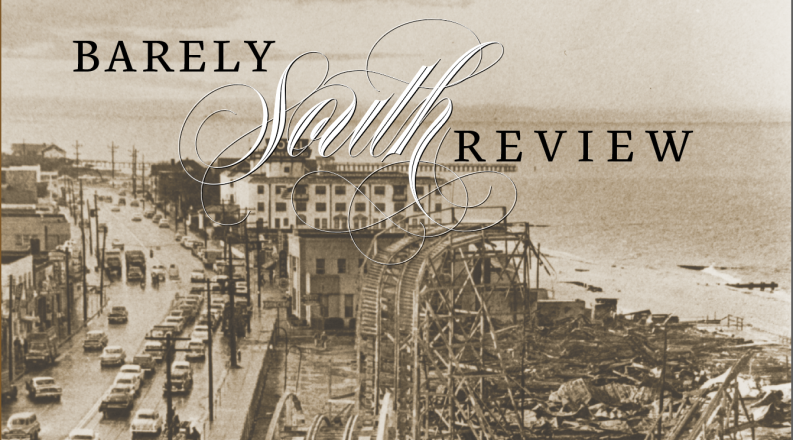
By Luisa A. Igloria
2024: a milestone year which marks the 30 th anniversary of Old Dominion University’s MFA Creative Writing Program. Its origins can be said to go back to April 1978, when the English Department’s (now Professor Emeritus, retired) Phil Raisor organized the first “Poetry Jam,” in collaboration with Pulitzer prize-winning poet W.D. Snodgrass (then a visiting poet at ODU). Raisor describes this period as “ a heady time .” Not many realize that from 1978 to 1994, ODU was also the home of AWP (the Association of Writers and Writing Programs) until it moved to George Mason University in Fairfax, Virginia.
The two-day celebration that was “Poetry Jam” has evolved into the annual ODU Literary Festival, a week-long affair at the beginning of October bringing writers of local, national, and international reputation to campus. The ODU Literary Festival is among the longest continuously running literary festivals nationwide. It has featured Rita Dove, Maxine Hong Kingston, Susan Sontag, Edward Albee, John McPhee, Tim O’Brien, Joy Harjo, Dorothy Allison, Billy Collins, Naomi Shihab Nye, Sabina Murray, Jane Hirshfield, Brian Turner, S.A. Cosby, Nicole Sealey, Franny Choi, Ross Gay, Adrian Matejka, Aimee Nezhukumatathil, Ilya Kaminsky, Marcelo Hernandez Castillo, Jose Olivarez, and Ocean Vuong, among a roster of other luminaries. MFA alumni who have gone on to publish books have also regularly been invited to read.
From an initial cohort of 12 students and three creative writing professors, ODU’s MFA Creative Writing Program has grown to anywhere between 25 to 33 talented students per year. Currently they work with a five-member core faculty (Kent Wascom, John McManus, and Jane Alberdeston in fiction; and Luisa A. Igloria and Marianne L. Chan in poetry). Award-winning writers who made up part of original teaching faculty along with Raisor (but are now also either retired or relocated) are legends in their own right—Toi Derricotte, Tony Ardizzone, Janet Peery, Scott Cairns, Sheri Reynolds, Tim Seibles, and Michael Pearson. Other faculty that ODU’s MFA Creative Writing Program was privileged to briefly have in its ranks include Molly McCully Brown and Benjamín Naka-Hasebe Kingsley.
"What we’ve also found to be consistently true is how collegial this program is — with a lively and supportive cohort, and friendships that last beyond time spent here." — Luisa A. Igloria, Louis I. Jaffe Endowed Professor & University Professor of English and Creative Writing at Old Dominion University
Our student body is diverse — from all over the country as well as from closer by. Over the last ten years, we’ve also seen an increase in the number of international students who are drawn to what our program has to offer: an exciting three-year curriculum of workshops, literature, literary publishing, and critical studies; as well as opportunities to teach in the classroom, tutor in the University’s Writing Center, coordinate the student reading series and the Writers in Community outreach program, and produce the student-led literary journal Barely South Review . The third year gives our students more time to immerse themselves in the completion of a book-ready creative thesis. And our students’ successes have been nothing but amazing. They’ve published with some of the best (many while still in the program), won important prizes, moved into tenured academic positions, and been published in global languages. What we’ve also found to be consistently true is how collegial this program is — with a lively and supportive cohort, and friendships that last beyond time spent here.
Our themed studio workshops are now offered as hybrid/cross genre experiences. My colleagues teach workshops in horror, speculative and experimental fiction, poetry of place, poetry and the archive — these give our students so many more options for honing their skills. And we continue to explore ways to collaborate with other programs and units of the university. One of my cornerstone projects during my term as 20 th Poet Laureate of the Commonwealth was the creation of a Virginia Poets Database, which is not only supported by the University through the Perry Library’s Digital Commons, but also by the MFA Program in the form of an assistantship for one of our students. With the awareness of ODU’s new integration with Eastern Virginia Medical School (EVMS) and its impact on other programs, I was inspired to design and pilot a new 700-level seminar on “Writing the Body Fantastic: Exploring Metaphors of Human Corporeality.” In the fall of 2024, I look forward to a themed graduate workshop on “Writing (in) the Anthropocene,” where my students and I will explore the subject of climate precarity and how we can respond in our own work.
Even as the University and wider community go through shifts and change through time, the MFA program has grown with resilience and grace. Once, during the six years (2009-15) that I directed the MFA Program, a State Council of Higher Education for Virginia (SCHEV) university-wide review amended the guidelines for what kind of graduate student would be allowed to teach classes (only those who had already earned 18 or more graduate credits). Thus, two of our first-year MFA students at that time had to be given another assignment for their Teaching Assistantships. I thought of AWP’s hallmarks of an effective MFA program , which lists the provision of editorial and publishing experience to its students through an affiliated magazine or press — and immediately sought department and upper administration support for creating a literary journal. This is what led to the creation of our biannual Barely South Review in 2009.
In 2010, HuffPost and Poets & Writers listed us among “ The Top 25 Underrated Creative Writing MFA Programs ” (better underrated than overrated, right?) — and while our MFA Creative Writing Program might be smaller than others, we do grow good writers here. When I joined the faculty in 1998, I was excited by the high caliber of both faculty and students. Twenty-five years later, I remain just as if not more excited, and look forward to all the that awaits us in our continued growth.
This essay was originally published in the Spring 2024 edition of Barely South Review , ODU’s student-led literary journal. The University’s growing MFA in Creative Writing program connects students with a seven-member creative writing faculty in fiction, poetry, and nonfiction.
Enhance your college career by gaining relevant experience with the skills and knowledge needed for your future career. Discover our experiential learning opportunities.
Picture yourself in the classroom, speak with professors in your major, and meet current students.
From sports games to concerts and lectures, join the ODU community at a variety of campus events.
New Scholarship Supports Western’s Graduate Program in Creative Writing

The Mari Sandoz Emerging Writer Scholarship will be awarded every year.
Students with a passion for writing about the people and landscapes of the West will have a new scholarship opportunity when they enter Western Colorado University’s Graduate Program in Creative Writing (GPCW), thanks to the generosity of the Mari Sandoz Heritage Society.
The Mari Sandoz Emerging Writer Scholarship will be available to one qualified first-year graduate student in the GPCW’s Nature Writing concentration starting in the summer of 2024. The scholarship will be granted each academic year, awarding the winner $3,000 each semester for a total of $6,000.
According to Mari Sandoz Heritage Society board member and director of the GPCW Nature Writing Concentration, Laura Pritchett, the scholarship aims to memorialize Mari Sandoz’s legacy as someone who had a passion for writing and loved the landscapes and peoples of the West. Through the scholarship, the board hopes to support significant writing about the West in the contemporary literary landscape.
“Sandoz’s writing emphasized the environmental and human landscape of the West and was recognized for her no-nonsense yet deeply evocative style,” Pritchett said. “She was passionate about sharing her hard-earned and well-honed writing skills. We’re fortunate to have the Mari Sandoz Heritage Society support this scholarship.”
Applying to the GPCW’s Nature Writing program will also serve as an application for the scholarship.
Author credit: Seth Mensing
Photo credit: Courtesy
Related Stories

Little Free Earth Library Welcomes Children to Western’s Campus

NSA names Western as Center of Academic Excellence in Cyber Defense

Western announces plan to cover full tuition and fees for eligible students
Take the next step.
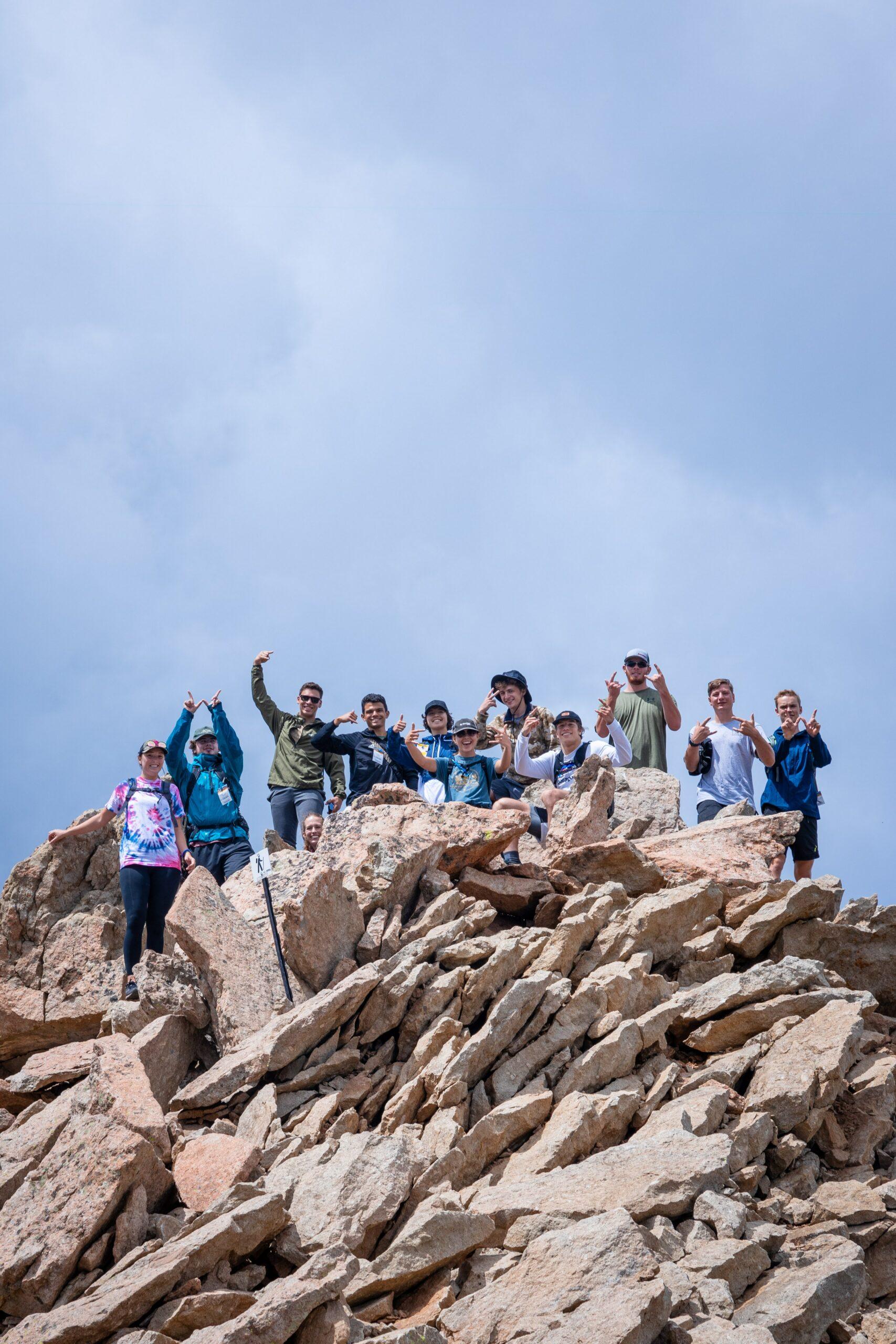
Apply to Western
We understand that applying to a university can be daunting, which is why we make our admission process as simple and straightforward as possible. Learn more about applying to your program of choice at Western.

Visit Western
The best way to find out what makes Western such a special place is to experience it for yourself. Our student-led tours give you an insider’s perspective on everything from academics to student life.
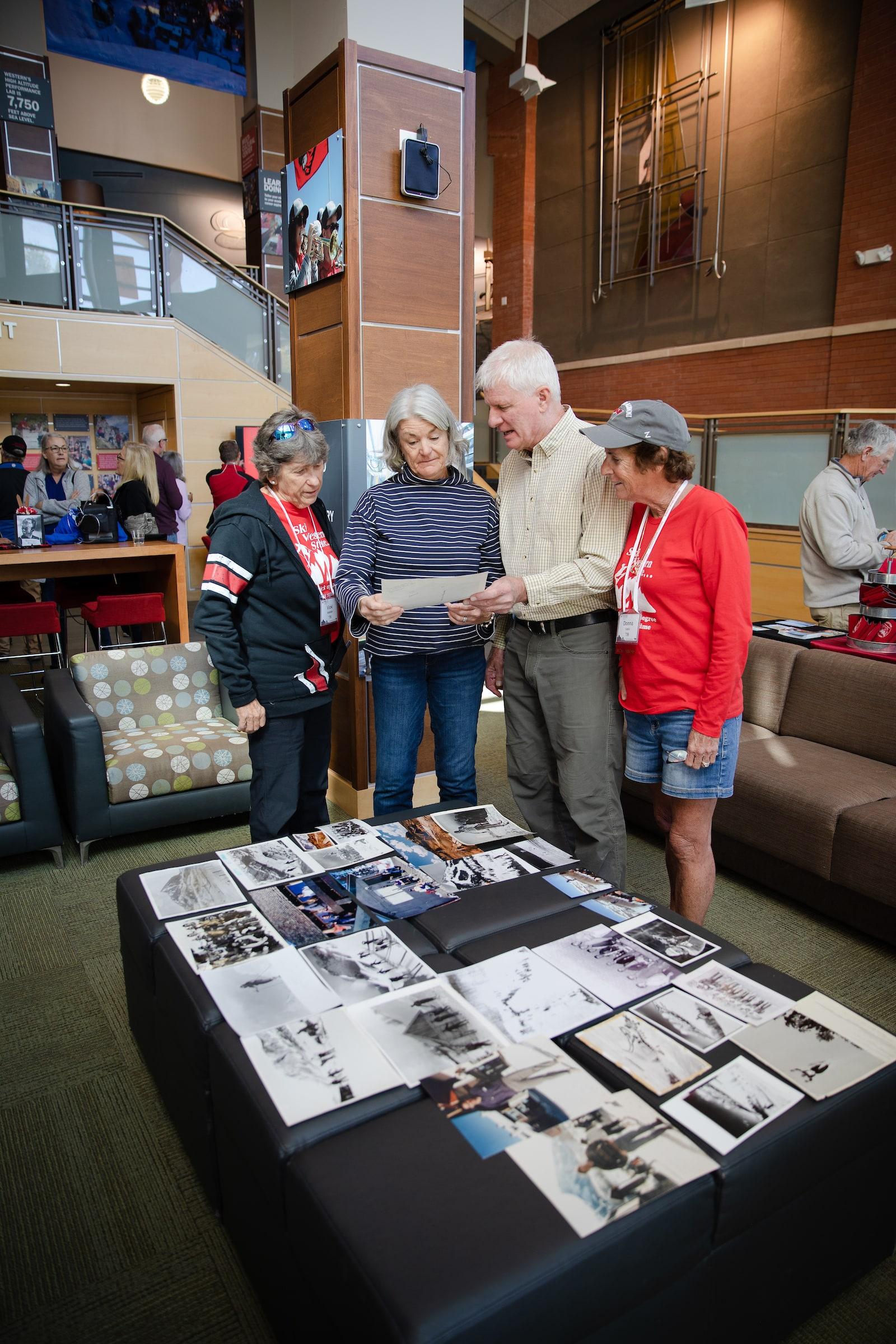
Alumni Community
We keep the Mountaineer spirit going strong within our alumni community. Whether getting together with friends at an annual event, making a donation or mentoring a student, graduates continue to play an important role in the Western community.

Request Information
Want to discover more about Western? Request information today to get in touch with the admissions team.
Select your Undergraduate Student Type
More From Forbes
4 hacks to enhance creative thinking in your career using chatgpt.
- Share to Facebook
- Share to Twitter
- Share to Linkedin
AI and creativity are not odd bedfellows, according to research, and not only does it not hamper ... [+] creativity, experts say, but it can match the creativity of humans.
It is generally believed that AI hampers creativity or at best leads to mediocrity. In a survey by EduBirdie , one in six of 2,000 Gen Z say they believe AI does indeed hamper creativity, and 31% of them think it stifles critical thinking. But science-backed research shows that state-of-the-art generative artificial intelligence (AI) can actually match humans in creativity tests and is at the cusp of augmenting the creativity for knowledge workers.
Ksenia Hubska, data lead at EduBirdie , agrees with the science and is confident that naysayers might just be missing out on AI’s full potential to enhance creativity. Hubska explains that employees and employers can use AI to simulate various workplace scenarios, enhancing their skills and preparedness. As an example, she says they can practice sales calls, client meetings and workplace disputes. And for those working with text, she says AI can be an invaluable assistant. “Journalists, PR professionals, copywriters and marketers can rewrite texts in different styles, adjust tones and reorganize structures to meet specific needs,” she continues. “By analyzing these modifications, employees can enhance their own writing, nurturing creativity and precision.”
She adds that AI is a valuable tool for brainstorming and feedback, especially in marketing, product development and research. “It can assist in generating new ideas, suggest questions and offer unbiased input on drafts and presentations,” according to the EduBirdie data lead. “This helps professionals refine their work, fostering creativity and continuous improvement.” To assist the younger generation in using this powerful tool, Hubska shared with me by email four essential hacks for boosting creativity with the help of AI.
1. Simulating scenarios
Hubska says if you’re out of ideas, asking AI tools to act out a hypothetical scenario with you can help kick start your creativity and problem-solving. “You can test different ideas, unearth challenges and explore potential outcomes, she posits. “Immersing yourself in role play will allow you to sharpen your presentation skills, hone your critical thinking, and make informed decisions—without any real-world consequences."
She presents these prompt examples:
- Let’s act out a scenario where I believe [position] and you dispute my opinion.
- Simulate a scenario where I’m pitching [idea]. What key points should I emphasize to secure support?
Biden Vs. Trump 2024 Election Polls: Biden Leads Trump By Only Single Digits In New York, Latest Survey Shows
Why is chief boden leaving chicago fire eamonn walker s exit explained, here are the major allegations against sean diddy combs as cassie ventura breaks silence on attack video, 2. linguistic enhancements.
Hubska says you can ask ChatGPT to rewrite a text in different styles, improve its tone or reorganize the structure to meet particular needs. She cautions, however, not to copy and paste the results without learning from it. “Read over its work to see what changes it made, and use it to improve your writing style and prompt linguistic creativity,” she explains. “With enough practice, you won’t need AI's help to think of the perfect pun or creative word combinations"
Prompt examples:
- Generate a creative wordplay that combines [concept] and [concept].
- Rewrite this text in the style of a stand-up comedy routine.
3. Supported brainstorming
Hubska points out that ChatGPT or other AI tools can provide basic insight into market trends and industry happenings, but it falls short when asked to analyze complex ideas or come up with creative solutions. “You can’t expect it to do the hard work for you, but with the right prompt, it can help to get your brain going and creativity flowing,” she notes. “Rather than asking AI to tell you the answers, try asking it to think of questions you should ask yourself."
- Describe five effective brainstorming techniques to help me generate more creative ideas.
- Share some thought-provoking questions or prompts that could help me explore [topic].
4. Detailed feedback
Hubska acknowledges that feedback is critical to evaluating performance, spotting mistake, and improving ourselves, but there isn’t always an expert around to help. “Or there wasn’t, until now,” she adds. “Using ChatGPT, you can seek valuable unbiased feedback on your ideas, projects and presentations at any time. Ask ChatGPT for its input on areas you can improve, alternative perspectives to consider, and how you can refine your work. Additionally, ask it to play the part of your audience and generate questions they might ask in response to your pitch or presentation, ensuring you’re ready for the real thing."
- Provide feedback on this draft and suggest ways to improve it.
- How would you make this presentation more engaging and impactful?
Hubska insists that employees and employers can use AI to simulate various workplace scenarios, enhancing their skills and preparedness. They can practice sales calls, client meetings and workplace disputes,” she points out. “For those working with text, AI can be an invaluable assistant. Journalists, PR professionals, copywriters and marketers can rewrite texts in different styles, adjust tones and reorganize structures to meet specific needs.”
She informs us that employees can enhance their own writing, nurturing creativity and precision by analyzing these modifications, adding that AI is a valuable tool for brainstorming and feedback, especially in marketing, product development and research. “It can assist in generating new ideas, suggest questions and offer unbiased input on drafts and presentations,” she concludes. “This helps professionals refine their work, fostering creativity and continuous improvement.”

- Editorial Standards
- Reprints & Permissions
Join The Conversation
One Community. Many Voices. Create a free account to share your thoughts.
Forbes Community Guidelines
Our community is about connecting people through open and thoughtful conversations. We want our readers to share their views and exchange ideas and facts in a safe space.
In order to do so, please follow the posting rules in our site's Terms of Service. We've summarized some of those key rules below. Simply put, keep it civil.
Your post will be rejected if we notice that it seems to contain:
- False or intentionally out-of-context or misleading information
- Insults, profanity, incoherent, obscene or inflammatory language or threats of any kind
- Attacks on the identity of other commenters or the article's author
- Content that otherwise violates our site's terms.
User accounts will be blocked if we notice or believe that users are engaged in:
- Continuous attempts to re-post comments that have been previously moderated/rejected
- Racist, sexist, homophobic or other discriminatory comments
- Attempts or tactics that put the site security at risk
- Actions that otherwise violate our site's terms.
So, how can you be a power user?
- Stay on topic and share your insights
- Feel free to be clear and thoughtful to get your point across
- ‘Like’ or ‘Dislike’ to show your point of view.
- Protect your community.
- Use the report tool to alert us when someone breaks the rules.
Thanks for reading our community guidelines. Please read the full list of posting rules found in our site's Terms of Service.
Local Creative Writer and Producer Talks His Project The Funeral Photographer

Sawyer, Michigan local Mark Strauss is one of the brain's behind The Funeral Photographer, a film following a woman hired to photograph a funeral only to find out her job has a twist. Strauss is the Creative Writer and Producer of the project, which is a short 16 minutes but packs a full punch in its plot.
Starring Tara hazel Walsh as the main character Julie, the film begins as she arrives to the funeral and takes in the scene. The film shortly becomes emotional, as Julie discovers the real reason she's there. Strauss says the process took about six years to finally release, beginning in 2018 when he wrote the story. It's only been in the hands of the public for about four weeks now, but the YouTube video boasts nearly 30,000 views and hundreds of comments. The film can be seen at this link , Strauss says there's lots of dialogue in the comments and to not be shy to join.

History Computer (US)
What Every Rank in the Air Force Earns in 2024
Posted: May 24, 2024 | Last updated: May 24, 2024
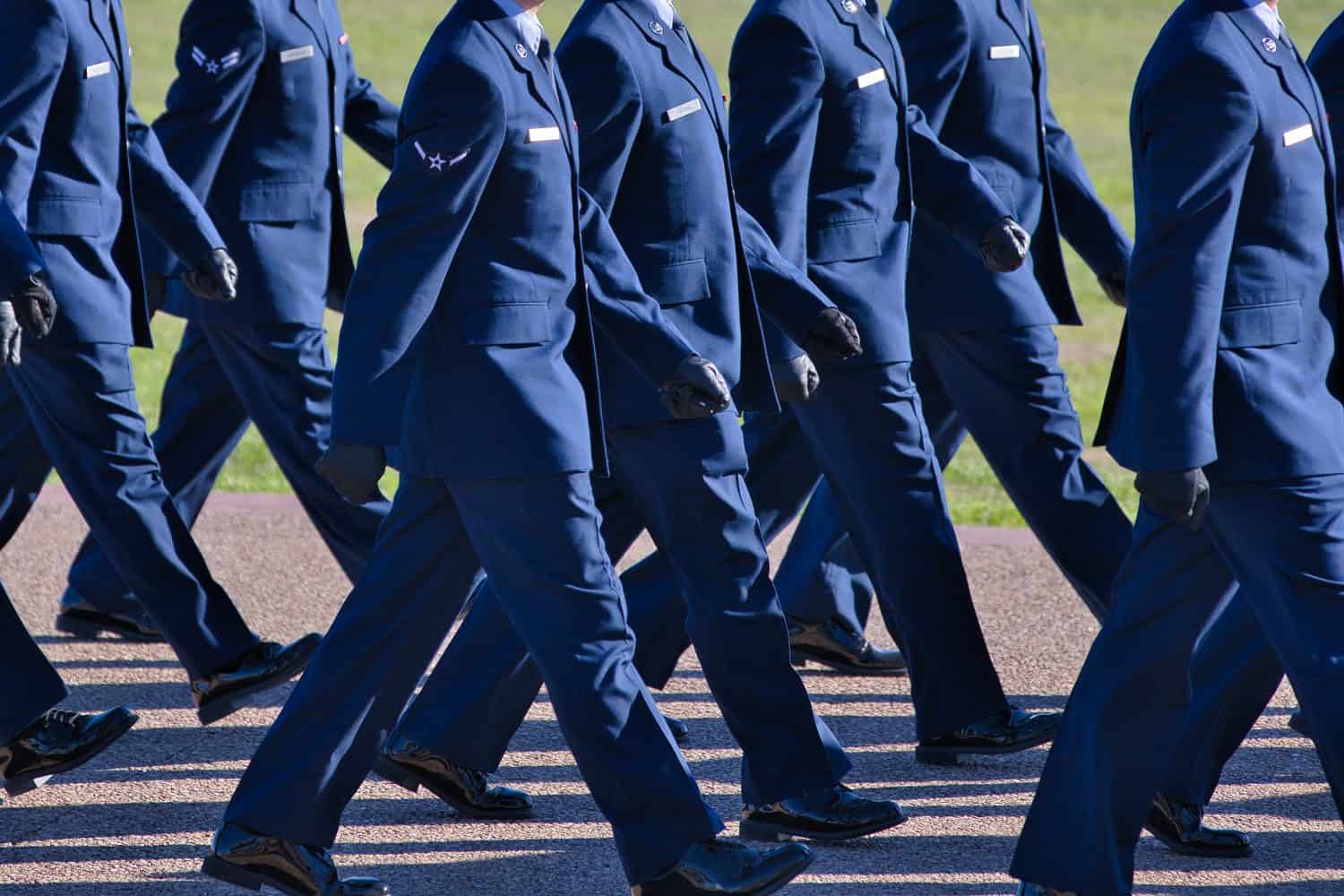
Many people view the military as a potential career or as an opportunity to earn money for college, so the Air Force might be a great option. As with other service branches like the Marine Corps and Army, Air Force earnings are based on rank and years of service. With this in mind, let’s jump into what you can expect to earn annually as an Air Force service member.
Agree? Tell us by clicking the “Thumbs Up” button above.
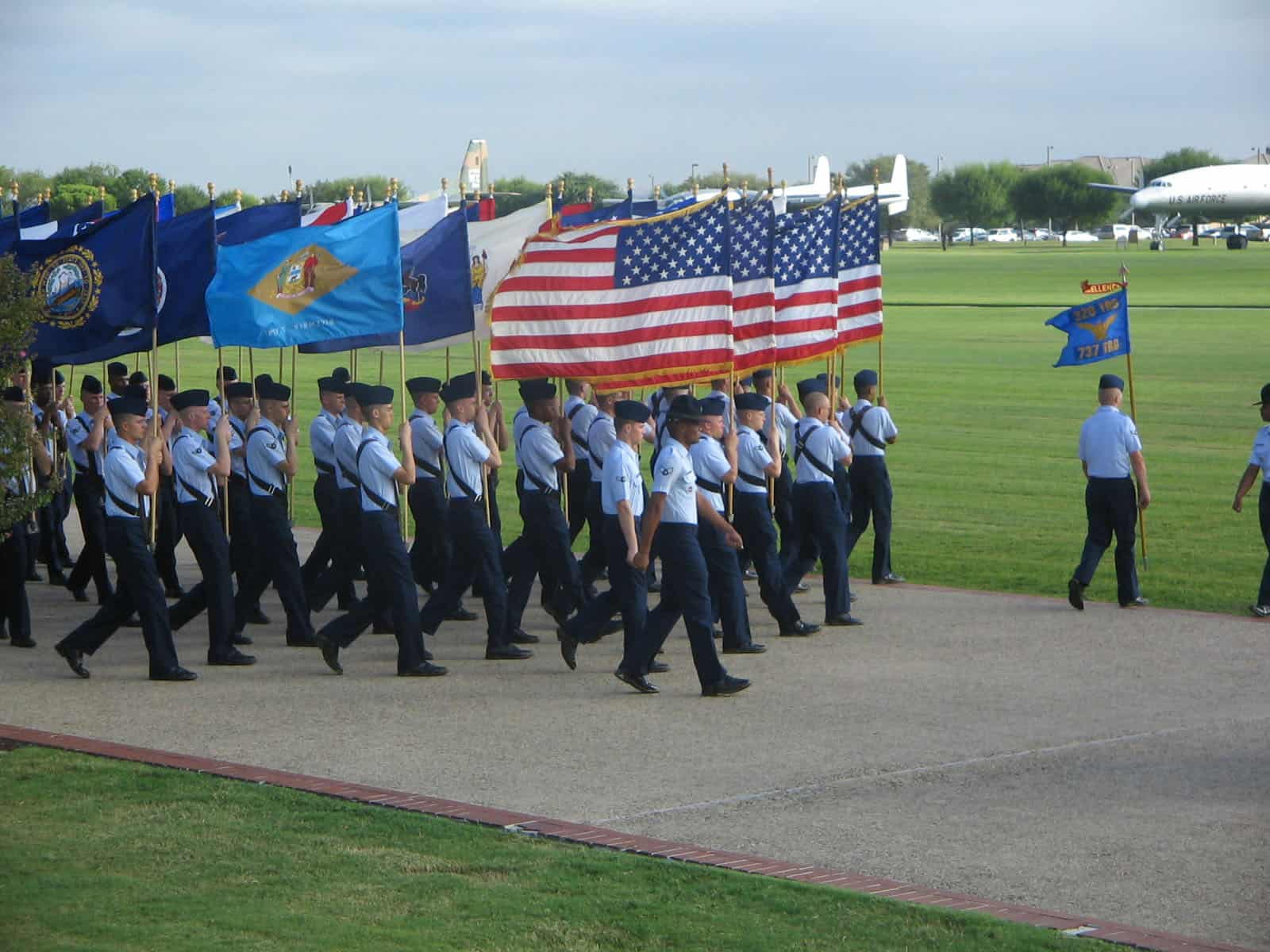
E-1 Airman Basic Pay
As the most junior enlisted member of the U.S. Air Force , your expected earnings will be $24,206 per year. In this role, you must graduate basic training and become accustomed to Air Force branch standards.

Any E-2 Airman in the Air Force should already be responsible for adjusting to military life and starting to learn their specific duties. Annual earnings will range between $27,133 and $27,385, depending on the length of service.
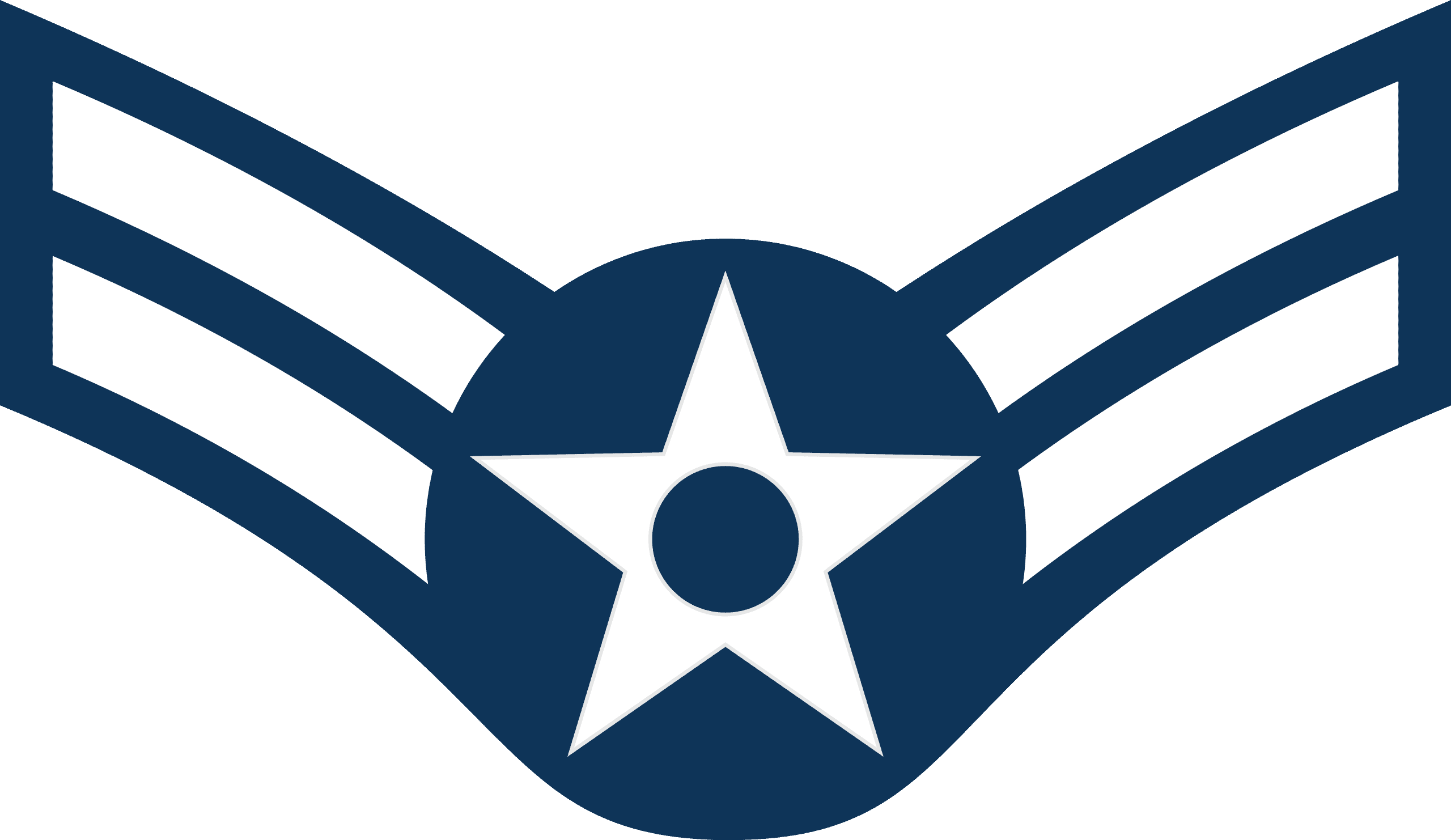
E-3 Airman First Class
An E-3 Airman First Class is already adjusted to Air Force life and can help younger enlisted airman make their life adjustments. In this rank, earnings range from $28,530 to $32,162 annually.
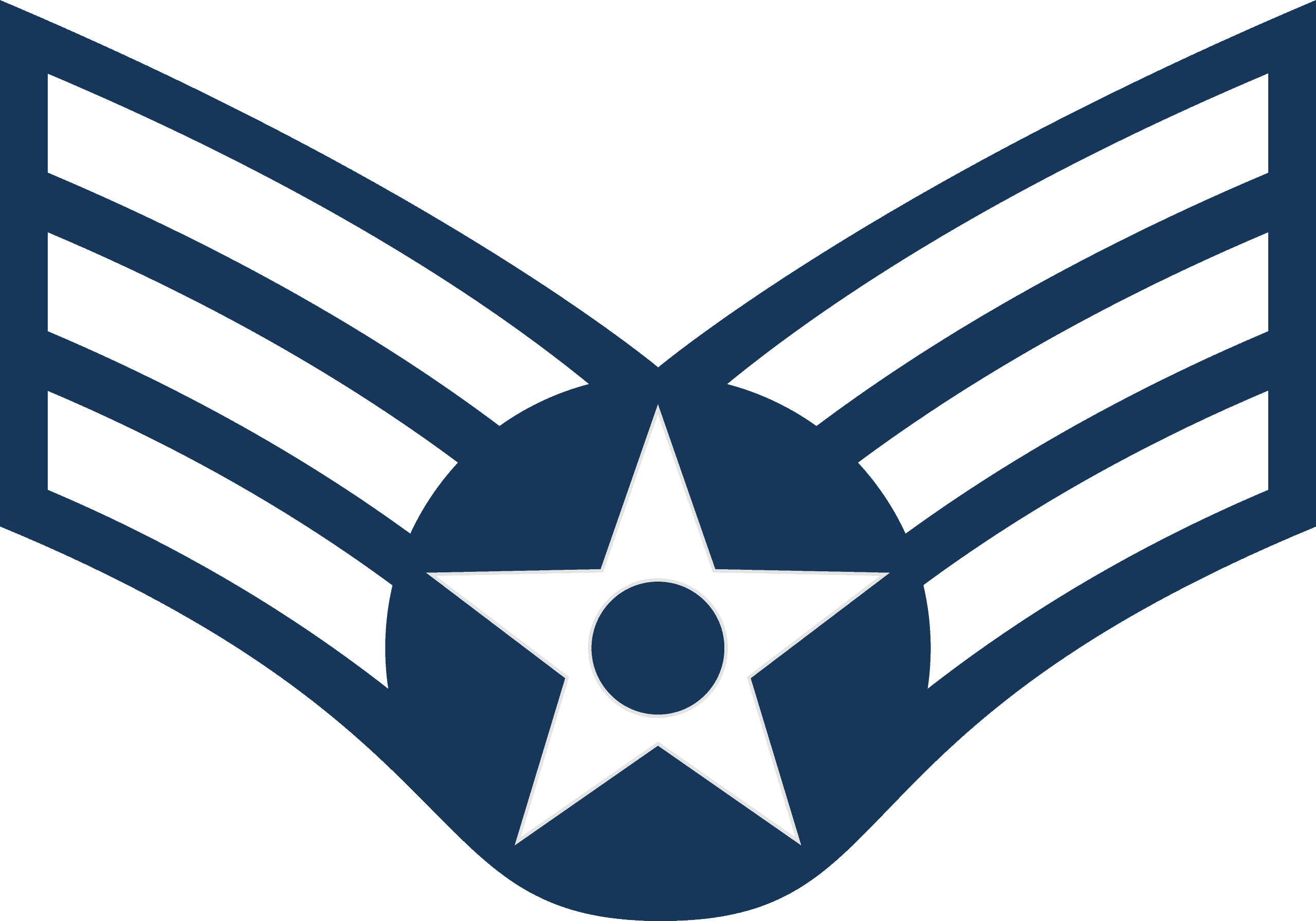
E-4 Senior Airman
The senior most enlisted Airman, the Senior Airman should be considered proficient at their Air Force skills. At this rank, annual earnings will range between $31,604 and $38,369.
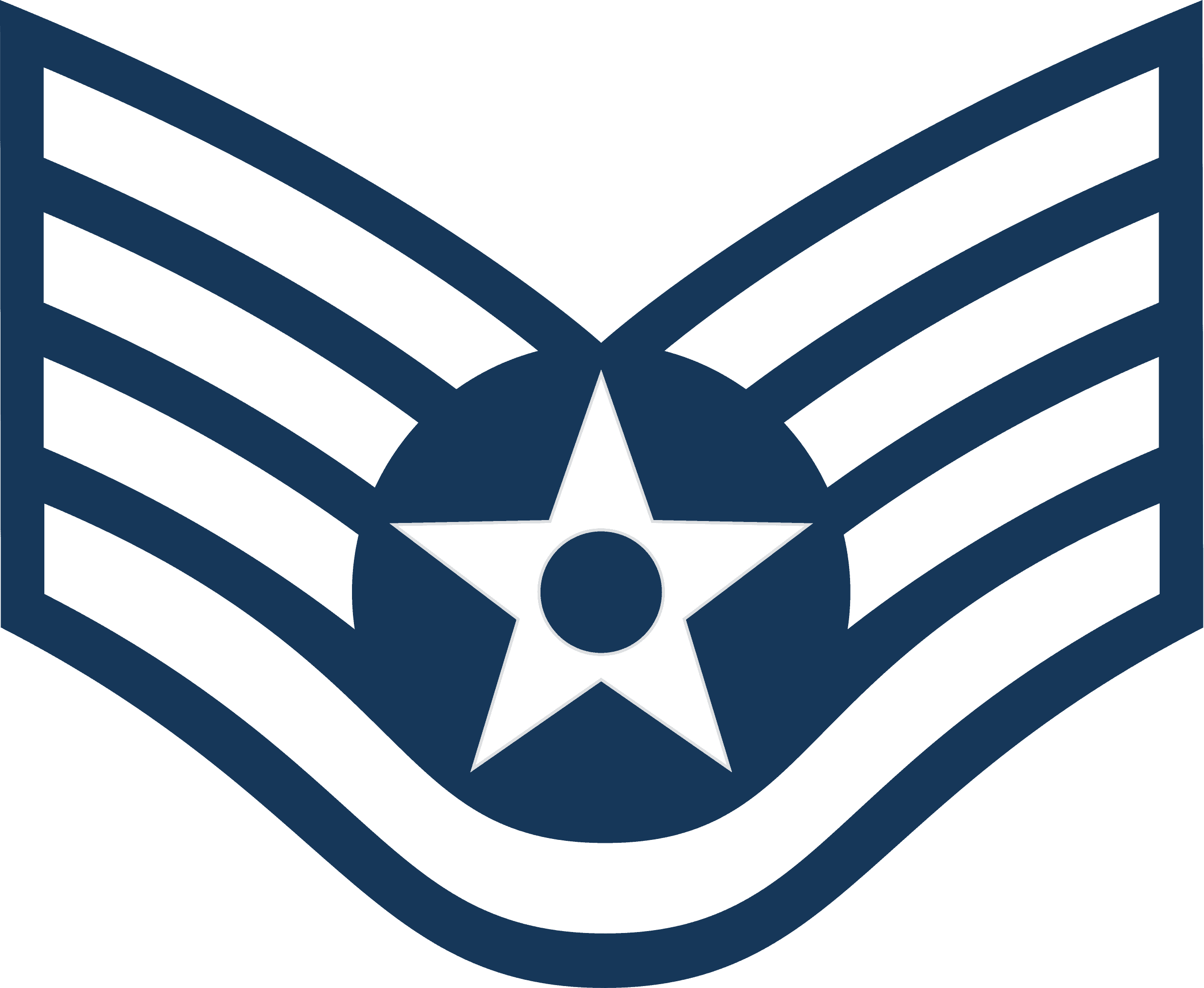
E-5 Air Force Staff Sergeant
The lowest non-commissioned officer rank in the Air Force, staff sergeants will likely be supervisors of a specific department. In this role, E-5s can expect to earn between $34,466 and $48,917 per year.
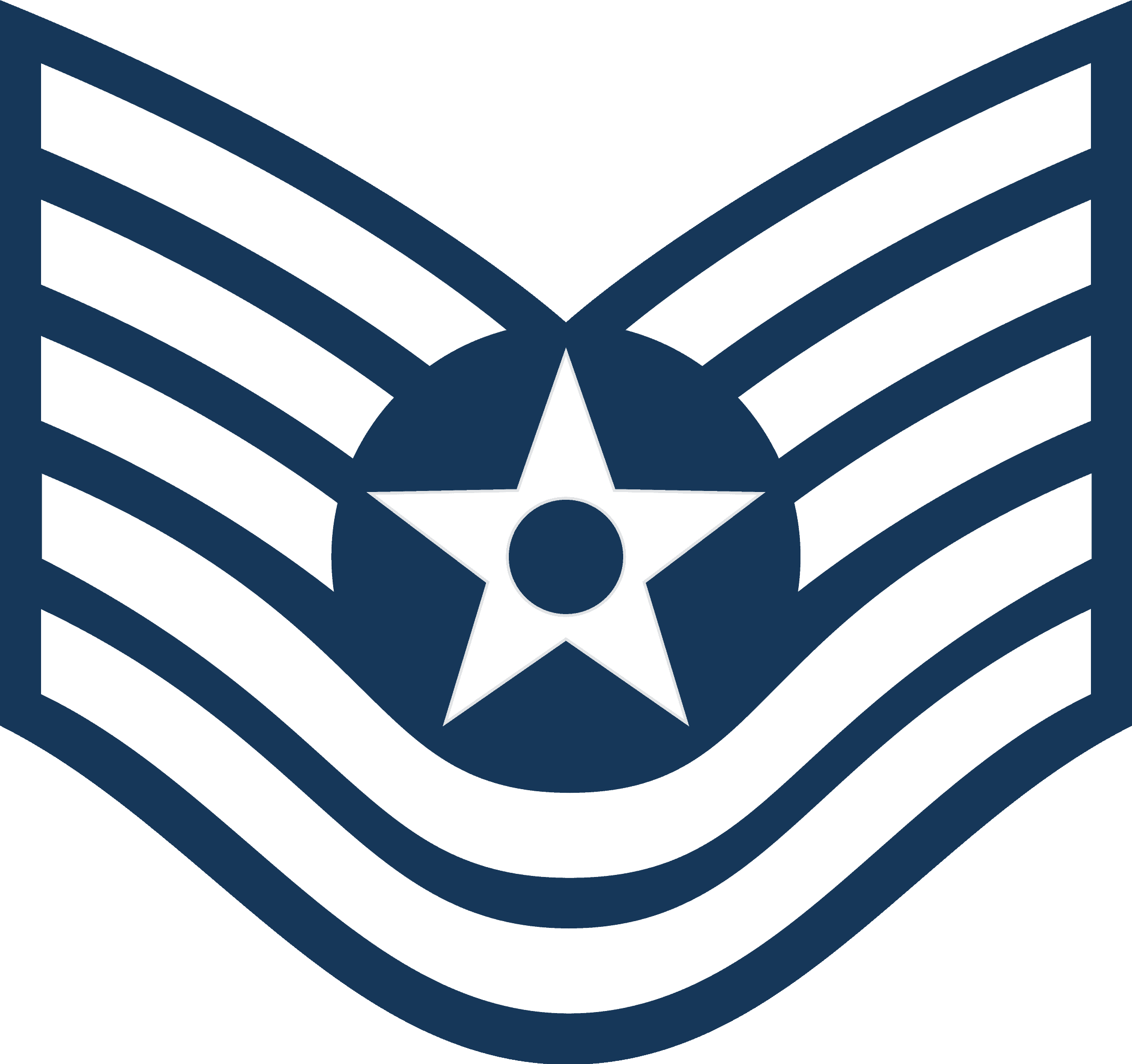
E-6 Technical Sergeant
An E-6 Technical Sergeant is a non-commissioned officer expected to have started developing leadership skills and writing performance reports. At this rank, earnings range between $37,627 and $58,277 per year are expected.
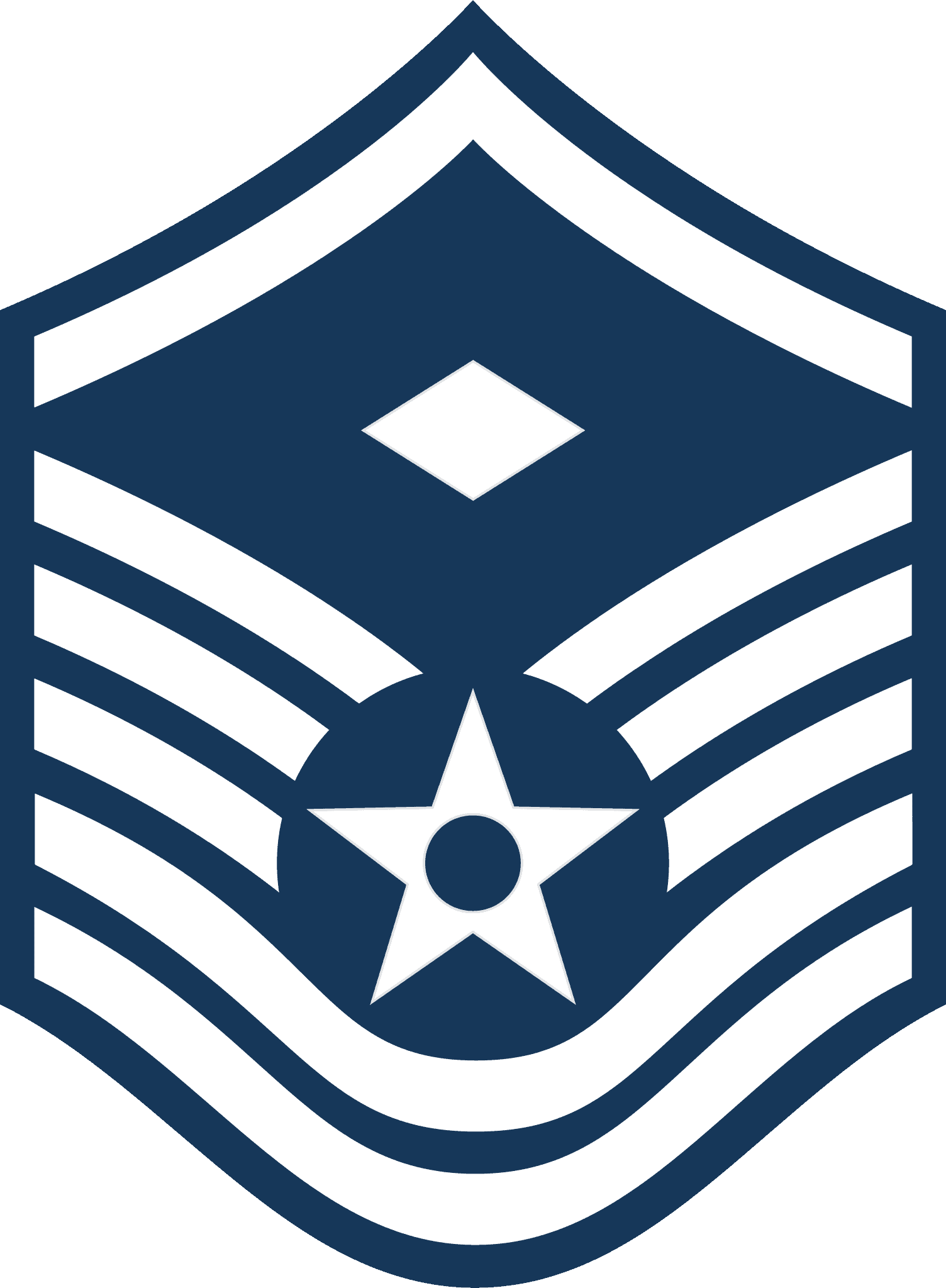
E-7 Master Sergeant
Master sergeants in the Air Force will be called to serve as section chiefs, flight chiefs, or superintendents. Earnings at this rank range between $43,499 and $78,188 annually.
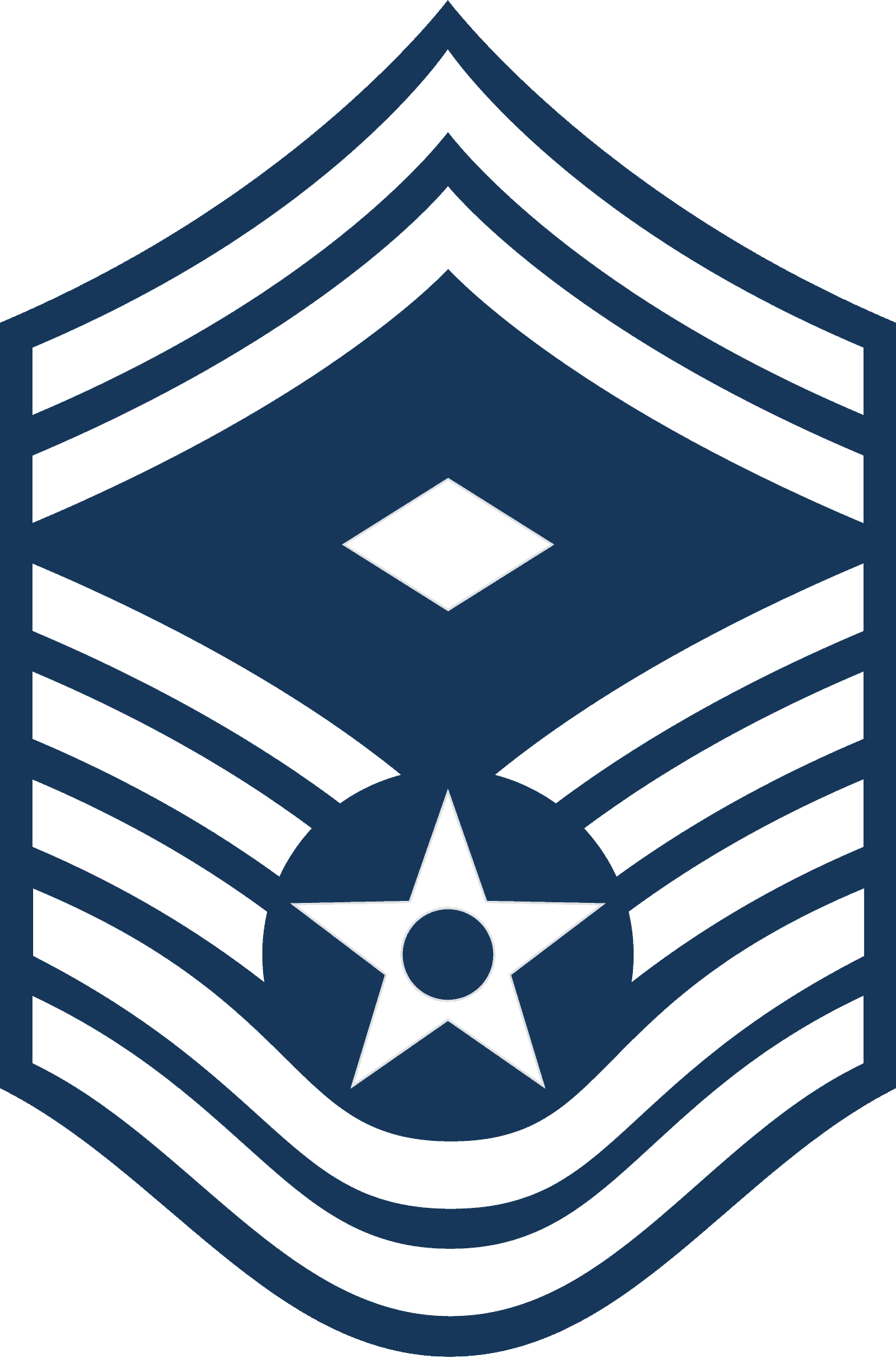
E-8 Senior Master Sergeant
As a Senior Master Sergeant, you’ll mentor junior officers while potentially serving a more senior officer in a staff role. Earnings at the E-8 rank earn between $62,579 and $89,249 per year.
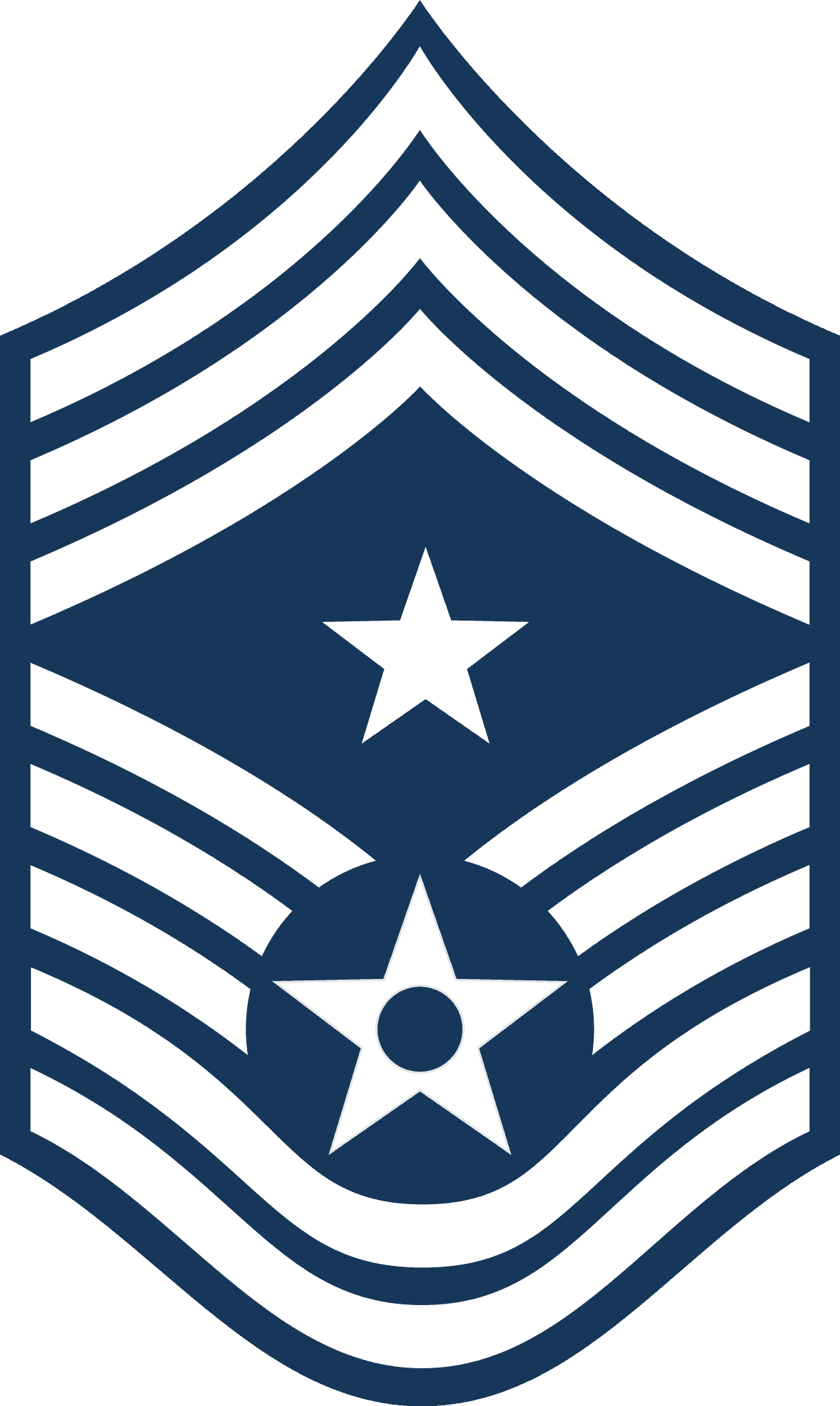
E-9 Chief Master Sergeant of the Air Force / Chief Master Sergeant / Command Chief Master Sergeant
The E-9 rank can be one of three roles with the Chief Master Sergeant, Command Chief Master Sergeant, and Chief Master Sergeant of the Air Force. It is the highest enlisted rank in the service. Annual base pay is $76,446 and $118,696.
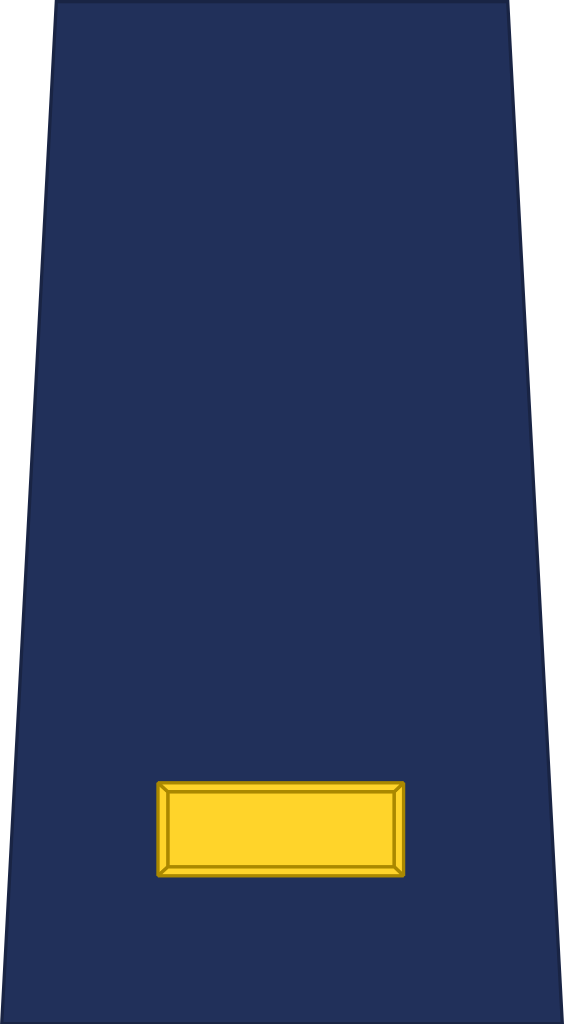
O-1 Second Lieutenant
An O-1 Second Lieutenant's career can vary considerably as a commissioned officer. Some look to become flight commanders or undergo training to become combat systems officers. This rank earns $45,915 and $57,776 per year.
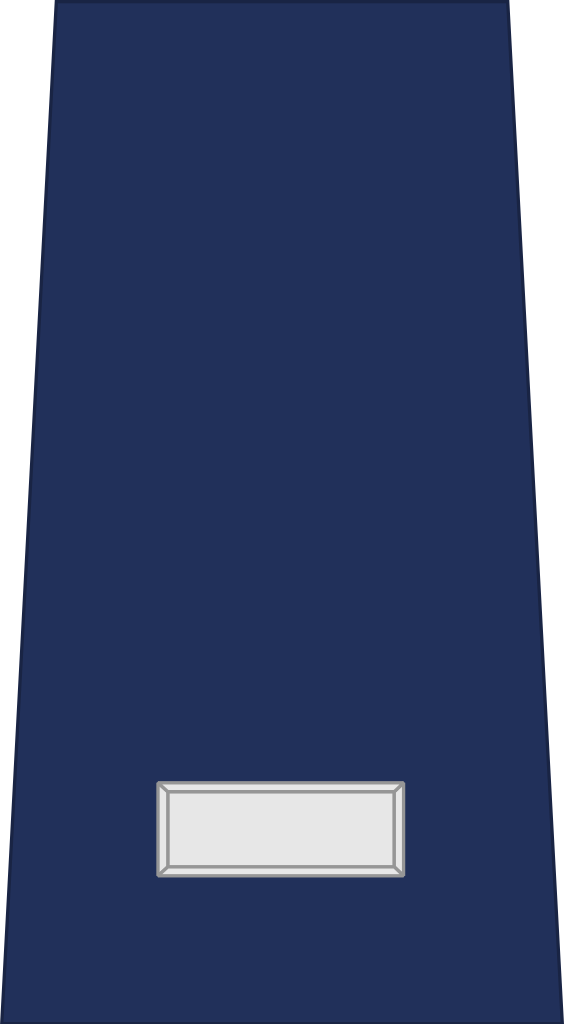
O-1 First Lieutenant
Promoted second lieutenants will receive a commission as a first lieutenant, with yearly earnings ranging from $52,902 to $73,210. This role can have a variety of duties based on different career fields.
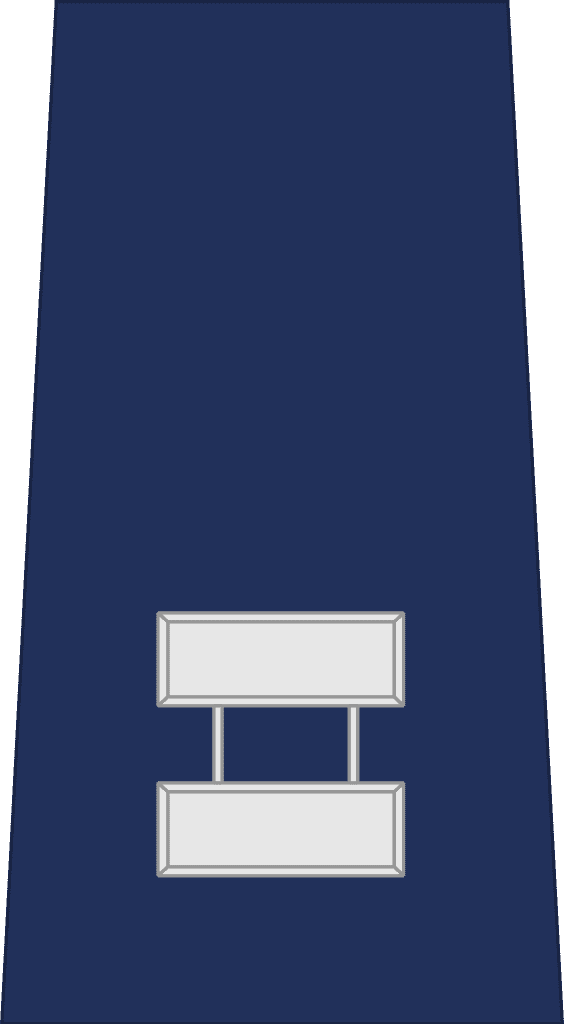
O-3 Captain
Earning the rank of an O-3 Captain is generally achieved after 4 years of being an officer in the Air Force. Captains should be seasoned officers who are ready to take on more responsibility. Captain’s earnings range from $61,225 to $99,612 annually.
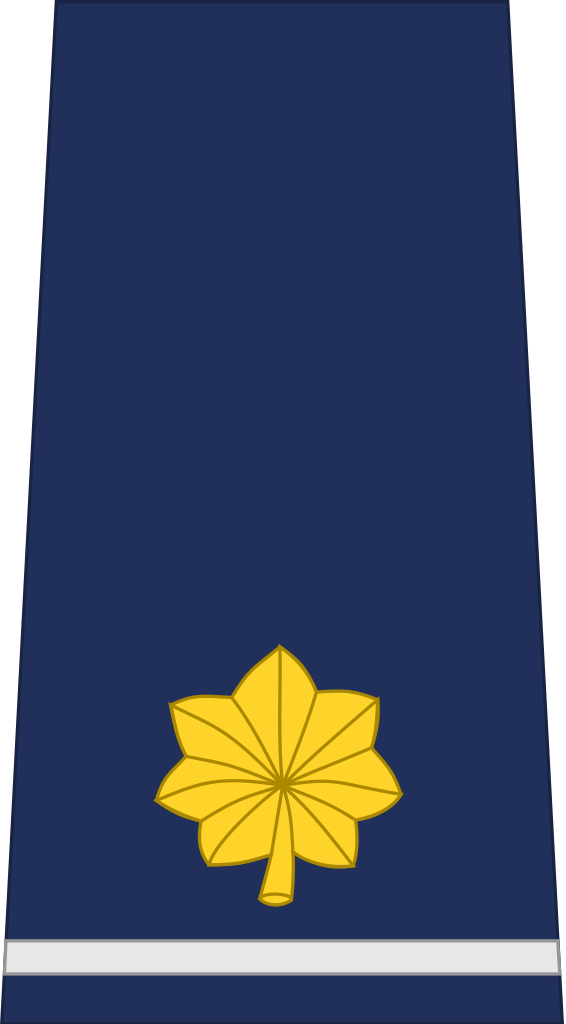
The lowest field grade officer rank, an O-4 Major, will likely involve more administrative work. A Major can also liaise between younger officers and the upper brass. Earnings range from $69,638 to $116,269 per year.
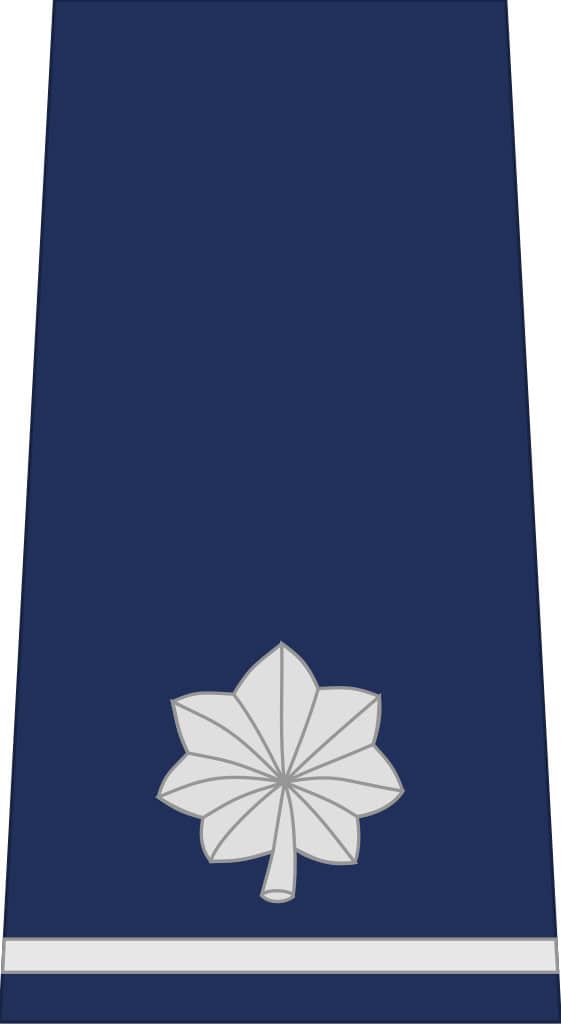
O-5 Lieutenant Colonel
When someone reaches the Lieutenant Colonel rank, it generally signifies they have close to 20 years of service. Lieutenant Colonels are in command roles and earn between $80,708 and $137,120 annually.
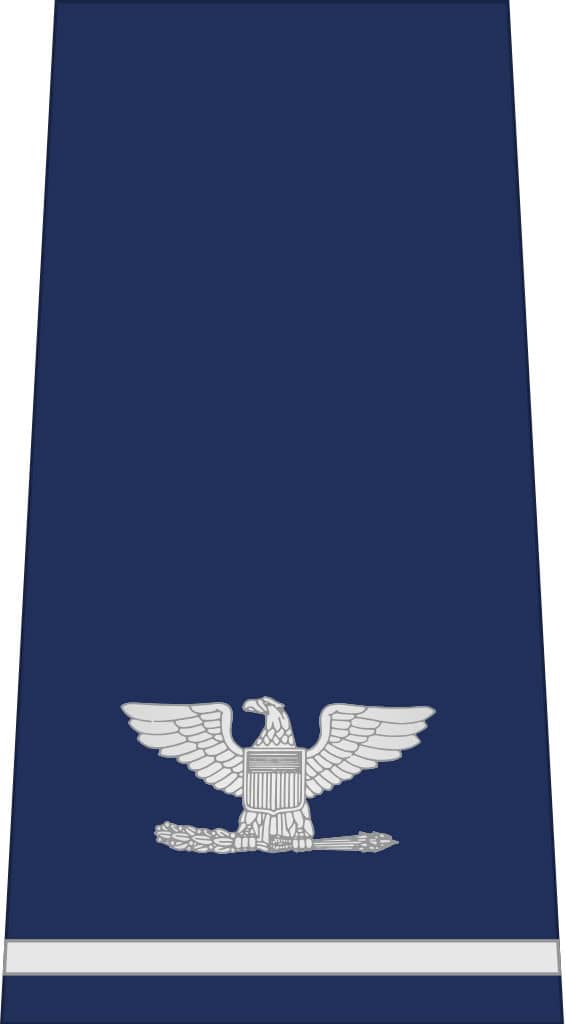
O-6 Colonel
The highest field grade officer rank in the Air Force, an O-6 Colonel, is likely a career officer. Colonels can be responsible for base conditions or be in charge of training schools like ROTC programs. Yearly base pay is between $96,815 and $171,389.
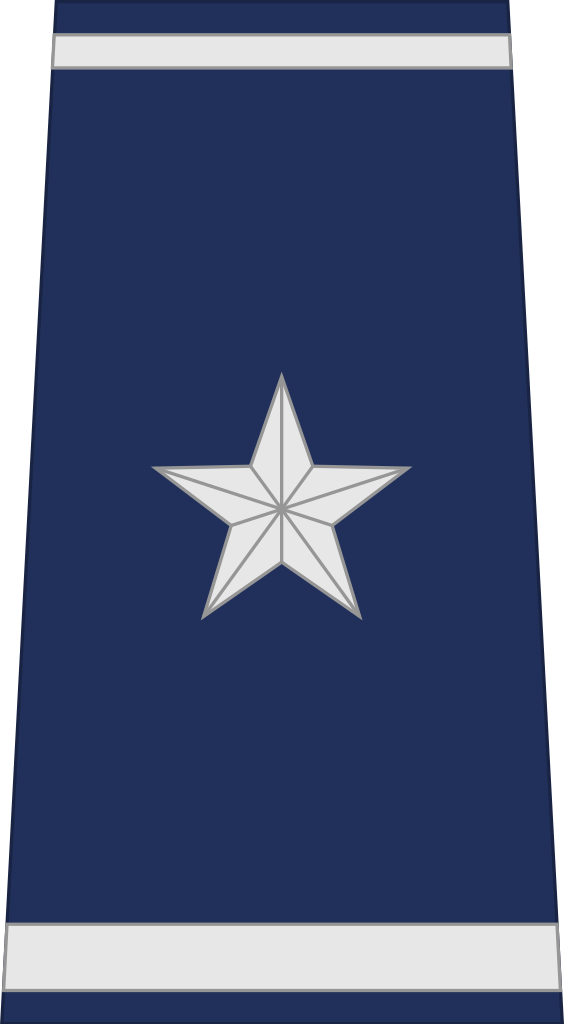
O-7 Brigadier General
The lowest general office rank, a Brigadier General, is usually a base commander and is equivalent to the rank of a Rear Admiral in the Navy. A brigadier general can earn between $127,667 and $190,750 annually in this capacity.
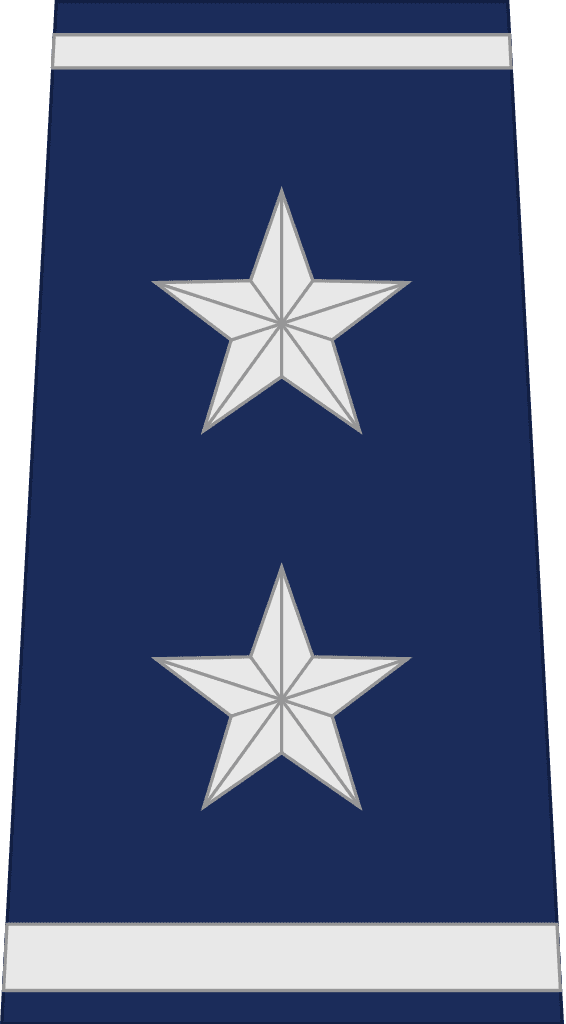
O-8 Major General
As a Major General in the Air Force, this role can serve as a senior director on joint staff and/or command up to 10,000 airmen. With this responsibility, earnings range between $153,644 and $221,497 annually.
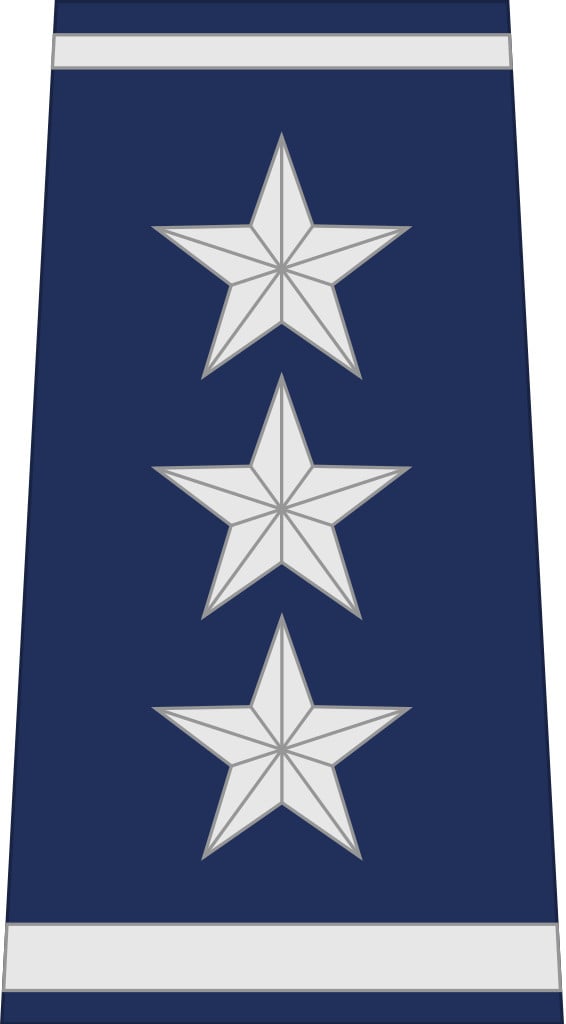
O-9 Lieutenant General
A three-star general, the rank of O-9 Lieutenant General is generally only achieved by no more than 25% of all Air Force general officers. Lieutenant Generals may command a MAJCOM or in a high-level position inside the Pentagon. Earnings range between $217,152 and $221,900 annually.
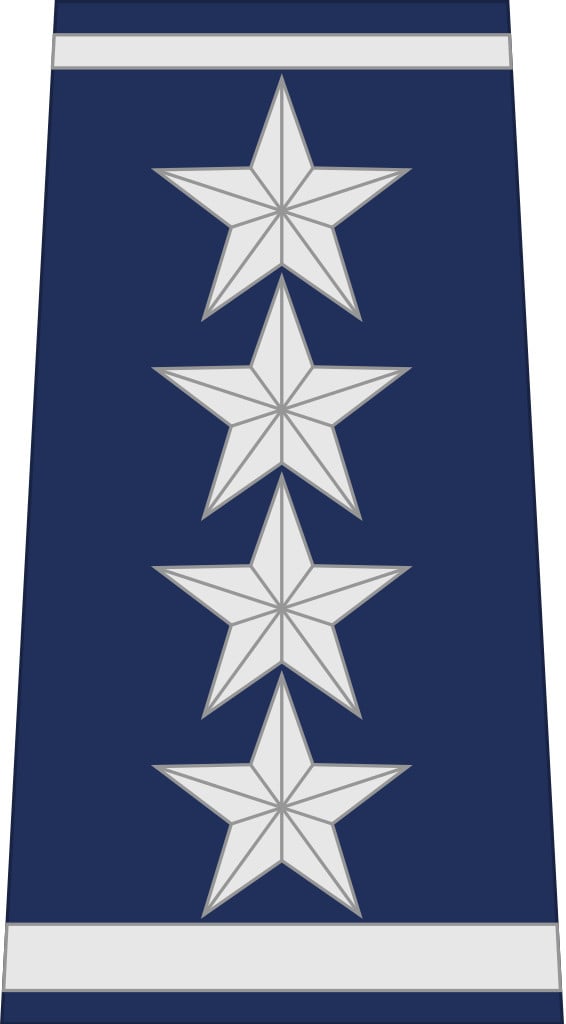
O-10 General
As a four-star General in the Air Force, you have the highest rank available, with no more than 25% of all Air Force general officers earning this role. As of 2024, only 13 four-star generals are in the Air Force. This rank earns an annual salary of $221,900.

Follow History Comuter for more amazing stories!
Remember to scroll up and hit the ‘Follow’ button to keep up with the newest stories from History Computer on your Microsoft Start feed or MSN homepage!
- Every Rank in the Army and How Much it Pays
- How Much Money Every Rank in the Navy Makes in 2024
- The Largest Defense Companies In The World, And What They Do
More for You
Expert demonstrates genius tip to get rid of empty medication bottles: ‘Do not recycle these curbside’
16 signs your body is telling you something is wrong
Caitlin Clark hits back at Angel Reese with a subtle message that shows where her priorities lie
Should I take Social Security at 62 or wait? Here are 3 solid reasons to start getting paid ASAP
Ask Amy: Newly married wife receives a windfall
Taylor Swift fixes wardrobe malfunction during 'Eras Tour'
Tech: What The Strange Knob On Your Computer Cable Is For
What are the best nuts to snack on? Here’s what health experts say
16 Really Bizarre Happenings That People Got Photo Evidence Of — I Wouldn't Believe It Otherwise
Mechanic shares photo of unexpected object that punctured vehicle's tire: 'This will be increasingly common'
6 Things A Doctor Wants You To Do Before Getting A Blood Test
I Began Walking 20,000 Steps a Day—the Changes I Felt Amazed Me
Top Gun 3: Glen Powell’s Return Sets Up a Major Headache for Tom Cruise That the Script Needs to Tackle Better Than ‘Maverick’
Putin ready to halt Ukraine war with ceasefire - under one condition
‘It doesn’t work’: This Florida waitress says she tried doing what she loved but couldn’t afford to live — can collecting degrees just leave you feeling burned?
Mom who won lottery denied her prize - as thousands face same struggle
The Only Major Actors Still Alive From Leave It To Beaver
7 Things Stroke Doctors Say You Should Never, Ever Do
Woman Loses 70lbs By Making Changes To These Four Things
Older People Are Holding Nothing Back About What It's Really Like To Get Old

IMAGES
VIDEO
COMMENTS
There are many skills that you can learn through a creative writing degree program and others that you could work on to advance your career, such as: Storytelling abilities. Time management. Networking. Editing and proofreading skills. Creative thinking. Technology. Organization. Independent working.
Creative Writing Instructor. Legacy Writer (write people's bios and family histories) Critic/Reviewer. Ghostwriter. Article Writer (write, submit, repeat) Columnist. Video Game Writer. Personal Poet (write personalized poems for weddings, funerals, childbirths, etc.) Speechwriter.
A creative writing degree more narrowly hones students' writing skills rather than focusing on literary subjects. This degree prepares learners for careers as screenwriters, novelists ...
A creative writer is a craftsman of the written word, harnessing the power of language to conjure worlds, evoke emotions, and breathe life into characters. This artisan weaves narratives across genres, from fiction and poetry to screenplays and beyond, often infusing personal insights and imaginative flair into their work.
2. Editor. 👩🏻💼 Entry level positions: editorial assistant. 💰 Potential beginner's earning: $25,000-$30,000 per year or $800-$1,000 per book. Writing is actually not all there is to creative writing jobs — if you really love stories and are always finding ways to make a story better, then editing is a suitable profession for you.
In fact, in 2019, the most common occupations for creative writing and English majors were elementary teachers (91.7k), postsecondary teachers (91.3k), and lawyers, judges, magistrates, and other judiciary workers (74.1k) (Data USA, 2021). The most specialized jobs with the highest concentration of English majors are (1) proofreaders and copy markers, (2) editors, and (3) writers and authors.
Creative writing majors are ideally suited to a number of communication roles. Many pursue public relations positions, preparing compelling press releases, speeches, and more for clients of all kinds. Others pursue careers in internal communications, publicity, or public outreach. Publishing.
The realm of creative writing careers has expanded significantly in recent years, offering aspiring writers a range of exciting prospects. From content creation and copywriting to editing, technical writing, journalism, and teaching, the opportunities in this field are diverse and ever-evolving. With the advent of the digital age, writers have ...
As a creative writing graduate you may work to establish yourself as a writer on a self-employed basis, either writing your own works, or writing for others in a freelance capacity. Alternatively, you could find opportunities with a variety of employers, including: Civil Service, library or charitable organisations.
Writing is a diverse, wide-ranging field that opens doors to a large selection of career paths. As a writer, you can report for your local paper, craft ad copy or draft technical documentation for ...
10. Screenwriter / Songwriter. Probably the most creative jobs for a creative writer graduate are songwriting and screenwriting. Of course, is not easy to make a name of yourself in this field, but this is where your passion lays, you should definitely go for it. In these jobs, you can dream as big as possible and the bigger you dream the more ...
A creative writing master's degree strengthens technical skills like narrative development, revising and editing, which easily transfer to a career as a grant writer. Ghostwriter A ghostwriter is the unseen creative force behind published works like fiction and nonfiction books and screenplays.
Writing your reports to be engaging, well thought out, and interesting will increase the chances that they will see you as a good candidate. Memorability is another reason that you should seek to improve your creative writing skills over time. As everyone in business knows, you are your own personal brand and everything you do should be done ...
5 Key Characteristics of Creative Writing. Creative writing is marked by several defining characteristics, each working to create a distinct form of expression: 1. Imagination and Creativity:Creative writing is all about harnessing your creativity and imagination to create an engaging and compelling piece of work.
Writing can be a rewarding and enjoyable career for creative people whose stories leap from their minds to the page. One advantage of being a writer is that once you start earning royalties, you have more spare time to spend with your friends or family. Also, a writer's hours are flexible because it's not a typical 9-to-5 job.
A degree in writing builds marketable skills applicable to careers across economic sectors. Within a writing curriculum, students can learn practices and techniques for specialized types of writing, including technical, creative, and business writing. Writing Career Outlook. Salaries for writers and authors vary by field.
24.Journalist. A career in journalism is a perfect match for those who have a passion for storytelling and staying connected with hot topics and global news. Journalists allow creatives to hone their writing skills to educate and inform readers on various topics through newspapers, magazines, or online publications.
Associate of Arts in Creative Writing. Liberty's 100% online Associate of Arts (A.A.) in Creative Writing offers you the opportunity to enhance your writing skills as you prepare for a future ...
With our Creative Writing concentration, you will develop your individual style and add versatile skills to a toolbox that can be used in a variety of career settings. Through courses in this concentration, you can: Pursue your artistic vision through developing your unique voice. Study contemporary and historical writing from various world ...
The University's growing MFA in Creative Writing program connects students with a seven-member creative writing faculty in fiction, poetry, and nonfiction. 5115 Hampton Blvd ... Enhance your college career by gaining relevant experience with the skills and knowledge needed for your future career. Discover our experiential learning ...
The Mari Sandoz Emerging Writer Scholarship will be awarded every year. Students with a passion for writing about the people and landscapes of the West will have a new scholarship opportunity when they enter Western Colorado University's Graduate Program in Creative Writing (GPCW), thanks to the generosity of the Mari Sandoz Heritage Society.
1. Simulating scenarios. Hubska says if you're out of ideas, asking AI tools to act out a hypothetical scenario with you can help kick start your creativity and problem-solving. "You can test ...
A bachelor's degree in philosophy is designed to provide you with the discipline's basic tenets and skills in critical thinking, writing, and rhetoric. The degree program can help you develop basic argumentative skills to pursue a career requiring a bachelor's degree or advancing to a master's or doctoral degree.
Strauss is the Creative Writer and Producer of the project, which is a short 16 minutes but packs a full punch in its plot. The Funeral Photographer is a short film about a woman who's been hired ...
The Indianapolis Colts are seeking a full-time Creative Video Producer to assist with the day-to-day needs of the Colts Productions department. The ideal candidate will be one with a robust video production portfolio, strong work ethic, ability to thrive in a fast-paced workplace and a desire to continue to grow in the field.
An E-6 Technical Sergeant is a non-commissioned officer expected to have started developing leadership skills and writing performance reports. At this rank, earnings range between $37,627 and ...